e Charlotte NEWS JEWISH

Sivan-Tamuz-Av, 5782


Sivan-Tamuz-Av, 5782
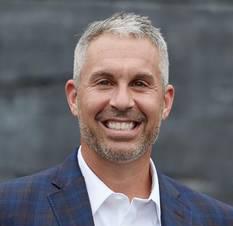
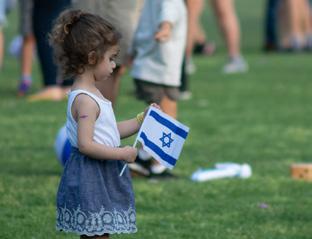 By Shira Firestone
By Shira Firestone
Clergy and community leaders from across North Carolina gathered online on April 12 to launch the North Carolina Jewish Clergy Association (NCJCA). “We are establishing the NCJCA so that the more than 80 Jewish clergy in North Carolina today can join together to support the Jewish community statewide and globally and to support each other in learning and in life,” said co-chair Rabbi Judy Schindler.
Governor Roy Cooper was among the community leaders gathered on the Zoom call to share his congratulations. He opened the gathering by sharing his appreciation and encouragement for the newly convened association, acknowledging the integral part that Jewish North Carolinians have played in the history of North Carolina for more than 400 years in arts and
culture, education, business, and beyond. The governor reiterated the importance of the association, remarking on its potential, saying, “I have seen firsthand the good that can come when faith leaders come together — ideas, courage, support, action, all of these can result from this association.”
Others present included civic leaders and leaders of the Jewish community, including Congresswoman Kathy Manning. Like Governor Cooper, she acknowledged the critical nature of the NCJCA’ s work and its strong potential. “At a time when we see so much divisiveness, it is particularly important to see rabbis from different denominations, with different views, from different parts of the state come together to form an association where I am assuming important issues will be discussed with ci-
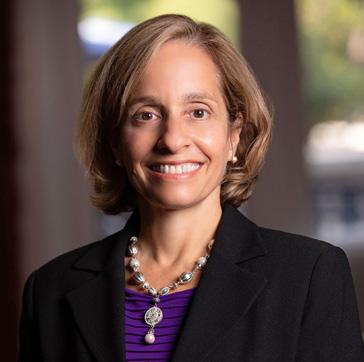
vility, with respect, and to reach common goals . . . We come from a tradition in which discussion and dissent are not only tolerated but encouraged — a tradition where the majority view and the minority view were recorded and viewed as legitimate.”
Though the NCJCA is new, the idea is not. In 1950, North Carolina had 15 rabbis, nine of
whom convened to establish the North Carolina Association of Rabbis to support one another, study together, and strengthen Jewish life. The North Carolina Association of Rabbis thrived from 1950 to 1969.
Many of the goals of the NCJCA echo the goals of the association upon which it was modeled. Supporting one another remains
a primary goal. In her remarks, Rabbi Schindler said, “Only we know the tremendous weight that North Carolina Jewish clergy carry. Denominational lines did not matter then, sensitivity was consistently shown for observance, and they do not matter today.” Seventy-two years since
(Continued on page 2)
By Shira FirestoneIn the same week that the ADL released its “Audit of Antisemitic Incidents,” reporting that antisemitic incidents had reached an all-time high in the United States in 2021, multiple swastikas were scrawled on three doors of Hillel students on the Queens University campus. In that very same week, 15-yearold violinist David Karpov walked onstage as part of this year’s community-wide Yom HaShoah Commemoration, wearing a kippah and playing a violin that had survived the Holocaust. One occurrence reminded us how far we have yet to go to end antisemitism; the other provided hope.

On April 26, an audience of more than 400 gathered at the Sandra Levine Theatre at Queens University for this year’s Yom HaShoah Commemoration to remember those who
perished during the Holocaust and to honor local survivors, liberators, and their descendants. This has traditionally been an event Jewish institutions have collaboratively organized and that either Temple Beth El or Temple Israel have hosted. But this year’s commemoration was a partnership that extended be-
yond the Jewish community. It had as its nexus a performance and exhibit featuring five violins from a much larger collection known as the Violins of Hope, violins linked to the Holocaust, and a moving performance of “Intonations: Songs from the Violins of Hope,” a song cycle
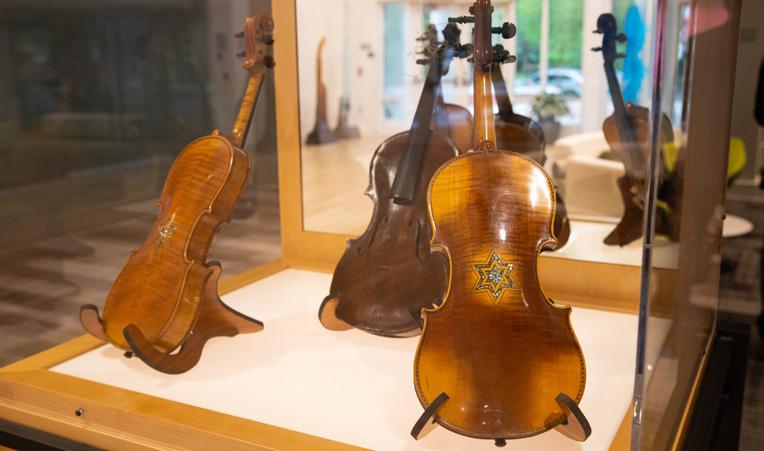
individuals, watched dozens of videos.
I’m still not sure why I became so engrossed. I hold season tickets to the Charlotte Symphony Orchestra; I’ve been a lover of orchestral music for as long as I can remember; I was married to the concertmaster of our symphony back in Washington. But never have I been unable to stop thinking about a concert for weeks following the performance.
fear, and love. This is what music can do.
Of a piece she was listening to, writer Charon Houri said, “The music triggered feelings that I wasn’t familiar with. The melodies were absorbed through my veins, and the beat pierced my soul. But what is behind the power of music? What makes it so undeniably irresistable to the gates of the soul?”
rience them at a level beyond cognition.
When I tell people that I sing (I used to be the music director of our synagogue), they say, “What a coincidence! Your parents must have been prescient to name you Shira,” (which means song in Hebrew).
door), but I could have told you exactly what the words meant. From that moment forward, I followed the path that led me to my name. When I told Rabbi Ted the Hebrew name I’d chosen for my conversion, he said he already knew. I had always been Shira.
I took an unusual amount of interest in one of the stories we’ve featured in this month’s issue of The Charlotte Jewish News — the story about the Violins of Hope, a collection of violins with connections to the Holocaust. After experiencing something I couldn’t put into words (then or now) at the community Yom HaShoah Commemoration, I went down the rabbit hole researching the Violins of Hope, which were featured in a concert as part of the event. I read two books, interviewed six
It is true, these instruments are unique, with complex and chilling histories. But it is more than that. Having the opportunity to see them as artifacts, under glass, is in itself a moving experience, but once they are played, it is as if those who once owned them slowly make their presence known — whispering in your ear.
The violins, through their melodies, give voice to their stories. And not just their Holocaust stories or their survival stories, which may be part of all of us in some way, but also the stories that are intimately universal — the stories we all have of joy,
June 3 — 8:16 p.m.
June 10 — 8:20 p.m.
June 17 — 8:22 p.m. June 24 — 8:24 p.m.
July 1 — 8:24 p.m.
July 8 — 8:20 p.m.
July 22 — 8:16 p.m.
July 29 — 8:11 p.m.
In my experience the answer lies in music’s ability to transcend our illusion of separateness. For those moments when we’re immersed, we experience ourselves as part of a collective. We have a deep encounter with the ineffable.
You may think I’m being a bit hyperbolic. I readily admit, that is not my experience when I listen to “I Want to Hold Your Hand,” no matter how much of a Beatles fan I am.
But think about the Kol Nidre, or Avinu Malkeinu. Especially if you don’t speak Hebrew, you’ll know what I mean. They are melodies we can embody. We expe-
(Continued from page 1)
the founding of the North Carolina Association of Rabbis, North Carolina has more than 80 ordained Jewish clergy across the state, and the NCJCA is open to all rabbis and cantors, representing all streams of Judaism, from organizations that are sanctioned in the newly ratified NCJCA organizational framework.
Jewish study is another important goal of the NCJCA. While serving as friends and teachers for one another, the group will also develop programming to benefit from the wisdom and knowledge of both national and international scholars.
I tell them that my name did not set me on the course to have my mystical connection to music, but that it was the other way around. I wasn’t born with the name Shira. It was a name I stepped into (some would say “chose”) later in life. And it was the Sh’ma that set me on the course toward my true name.
Sitting in the back of a synagogue for the first time I heard — no I experienced — the Sh’ma. Stephen Merritt, my favorite male vocalist who later became one of my dearest friends, led the melody from the front on the bimah, and congregants wrapped me in it from all sides. I’d never heard a word of Hebrew, (I was intimidated when they greeted me with “Shabbat Shalom” at the
I remember a Yom Kippur years later, when I was the one leading the Sh’ma. I opened my eyes and saw all the eyes of the congregation looking at me. I didn’t understand why. This wasn’t about me. It wasn’t meant to be a performance. It seems a butterfly had flown in and landed on my shoulder. It stayed there throughout the melody, and when I was done, it departed. I like to think of him as a spiritual traveler, called by the melody, who stopped to join us during a shared recognition of Oneness. Because that is what music can do.
Shira Firestone,
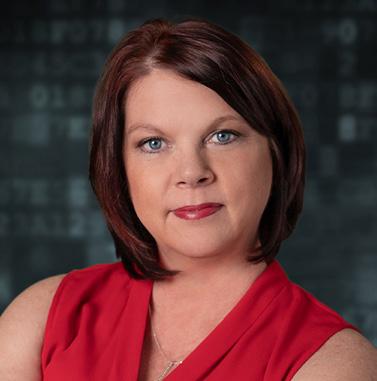
5007 Providence Road, Suite 112 Charlotte, NC 28226 (704) 944-6765 www.charlottejewishnews.org charlottejewishnews@shalomcharlotte.org
The CJN does not assume responsibility for the quality of kasruth of any product or service advertised. Publishing of a paid political advertisement does not constitute an endorsement of any candidate, political party or position by this newspaper, the Federation, or any of its employees.
Published monthly except July An affiliate of Jewish Federation of Greater Charlotte
Are you looking for career opportunities with Jewish Federation of Greater Charlotte or with one of Charlotte’s Jewish nonprofits?
Visit our Jewish careers page at www.charlottejewishnews.org.

Help us improve your community paper. We welcome your feedback with this short survey.
Of utmost importance is its third goal, strengthening Jewish life. Creating collaborative or mutually supportive educational, cultural, and religious opportunities will be on the NCJCA agenda. The pandemic has revealed the ease with which the clergy can come together statewide to support the broader Jewish community — especially smaller Jewish communities in rural or isolated areas whose congregations are served by lay leaders rather than ordained clergy.
Strengthening Jewish life has always included combatting antisemitism — and all forms of hate. In light of the newly released ADL report finding an unprecedented and alarming increase in antisemitism (with an average of more than seven incidents per day and a 34% increase over last year), the establishment of the NCJCA at this time is momentous and critical. Though not a political organization, leaders
of NCJCA recognize that issues affecting Jews have always intersected with politics, and the lines may at times appear blurry. In the 1950s, the rabbis of the North Carolina Association of Rabbis addressed issues such as the teaching of religion in schools, segregation, and teacher salaries, among others. Of the role of NCJCA in similar issues, Schindler said, “We will use our collective voice in the public realm where needed.”
Congresswoman Manning charged the dozens of clergy in attendance, saying, “You have important work to do . . . we are seeing a frightening acceptance of antisemitic comments and actions from the far right and from the far left . . . that are often not even called out or condemned, and we cannot allow them to become acceptable.”
Manning additionally addressed anti-Israel rhetoric that crosses the line. We are seeing “rising anti-Israel activity from college campuses to Amnesty International and the United Nations, and we cannot stand idly by,” Manning noted. “While even-handed, fair criticism of the Israeli government’s policies may be acceptable, the demonization and delegitimization of the only Jewish state in the world is not.”
The NCJCA steering committee comprises seven clergy members with more than 125 years of service in North Carolina. It includes Rabbi Schindler of Charlotte (co-chair), Rabbi Eric Solomon of Raleigh (co-
chair), Rabbi Mark Cohn of Winston-Salem, Rabbi Lucy Dinner of Raleigh, Rabbi Andy Koren of Greensboro, Cantor Shira Lissek of Charlotte, and Rabbi Batsheva Meiri of Asheville. As part of their launch, NCJCA leaders created a 2022 Passover Seder Supplement so Jews across the state could bring relevant issues to their holiday tables from Ukraine to the once in an approximately 33-year event when Passover, Easter, and Ramadan all coincide.
Rabbi Schindler closed her remarks by expressing the hopes the leading clergy have for the association. “In Genesis, Isaac dug in the wells of his father, and his community found mayim chayim — living waters — the waters of life. Water sustains. May the friendships we have and form sustain us. Water nourishes. May our collective programs nourish our minds and souls. And may our strength as clergy sustain and nourish the Jewish community of our state. And water in the Passover holiday represents liberation, redemption, and freedom. May we work to create a more just society through our work, through our words, through our collective voice, and our strength and wisdom to achieve that redemption that our community and world so deeply needs.”
For more information about the North Carolina Clergy Association, contact NCJCA CoChairs, Rabbi Eric Solomon (erics@bethmayer.org) or Rabbi Judy Schindler (schindlerj@ queens.edu).

Close to 100 people attended Jewish Federation of Greater Charlotte’s 2022 Annual Meeting on May 16 to welcome incoming president Risa Miller and thank outgoing president Ron Townsend. Risa and Ron both spoke about how our Federation
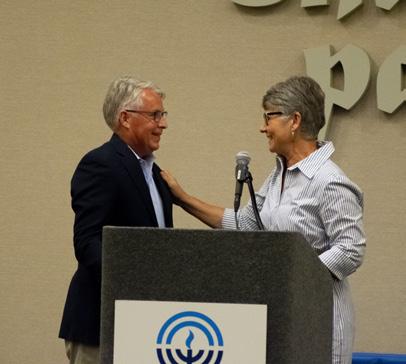

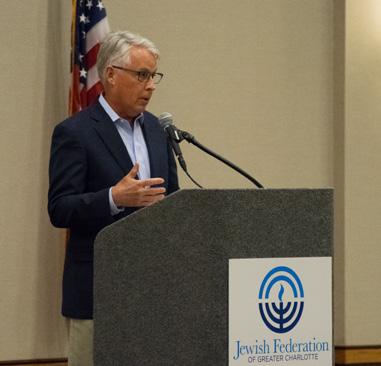

is strong because we have a strong and supportive community. Federation also welcomed new board members Eric Althofer, Rachel Campbell and Stephanie Haynes. Rabbi Joseph Telushkin added to the evening with his remarks on moral imagination.
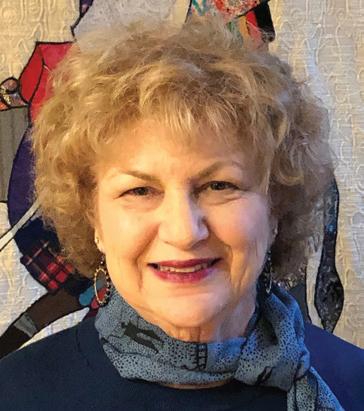
adviser and friend to J. P. Morgan and “as a powerful figure in the art world, courted by art dealers, embraced by the socially powerful and profiled as an elegant careerist at a time when working women were rare.” (NPR Book Reviews)
If you’re looking for some good books to read this summer, I highly recommend our Center for Jewish Education Book Club selections for June, July, and August: “The Personal Librarian,” “Last Summer at The Golden Hotel,” and “An Observant Wife.”
“The Personal Librarian,” a novel of historical fiction by Heather Terrell (writing as Marie Benedict) and Victoria Christopher Murray, is the story of Belle Da Costa Greene, one of the most prominent career women of her time. She was the personal librarian to financier J. P. Morgan, who was a known antisemite and racist. According to “Gentlemen Bankers: The World of J. P. Morgan” by Susie Pak, “J. P. Morgan made antisemitic comments in his private correspondence. He even made the hyperbolic claim that his bank and Barings were the only “white” (that is, non-Jewish) banks in New York City.”
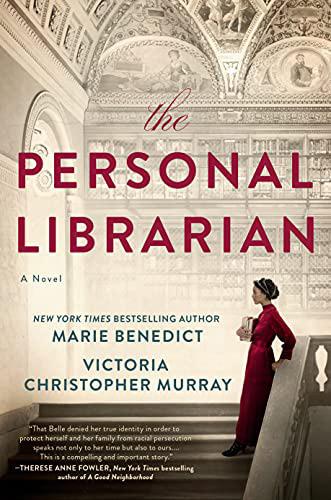
Throughout the novel, we see Belle in a constant state of unease and anxiety because, unbeknownst to J. P. Morgan, she was a Black woman passing for white, and as the novel unfolds, she has an affair with famed Jewish art historian Bernard Berenson. Both circumstances threatened Belle’s status as a trusted
“Last Summer at the Golden Hotel” by Elyssa Friedland, author of “The Floating Feldmans,” is a family story that recalls the golden age of grand vacations in the Catskill Mountains of New York and exposes the reality of the upkeep leading to the eventual failings of these resorts. The drama unfolds as the three generations of the two founding families of the Golden Hotel meet to consider an offer to sell. According to Kirkus Reviews, “Secrets and scandals come to light as the last family-owned Catskills resort teeters on the brink of extinction . . . A high-spirited party of a book. BYOB. Bring your own borscht.”
“An Observant Wife” by Naomi Ragen continues the love story of newly observant Leah and ultra-Orthodox widower Yaakov from a previous novel, “An Unorthodox Match.” Leah shows
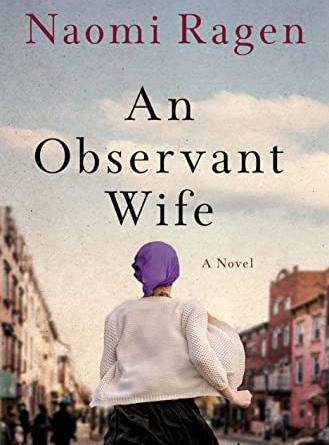
true devotion and love to her husband, stepchildren, and religious practices. However, she faces undue criticism from the seemingly well-intentioned community that does not accept her. As she and Yaakov face the reality of their situation and make decisions based on their devotion to their way of life, we grow to love these characters who are skillfully brought to life by master storyteller Naomi Ragen.
All three of these books are available at the Levine-Sklut Judaic Library and can be found in the general collection and as eBooks. All book club meetings are held at Shalom Park in Rooms A110-111 at 10:30 a.m. on the following dates: Wednesday, June 8 — “The Personal Librarian” Wednesday, July 13 — “Last Summer at the Golden Hotel” Wednesday, August 10 — “An Observant Wife”
For more information, please email sue.littauer@jewishcharlotte.org.
Andrew is an awardwinning agent ready to assist in your real estate journey. Named in the Top 1% of All Real Estate Agents in 2021 by Real Trends. In addition, Andrew is an involved member and leader in our Charlotte Jewish community.
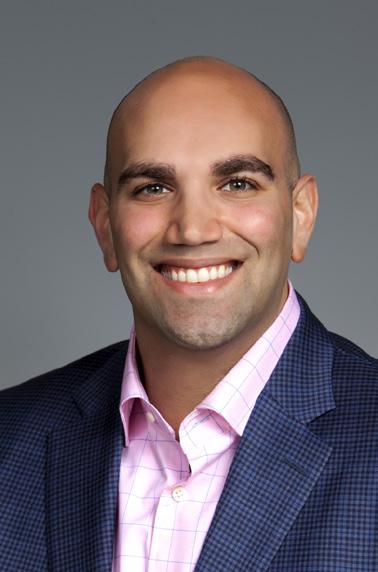

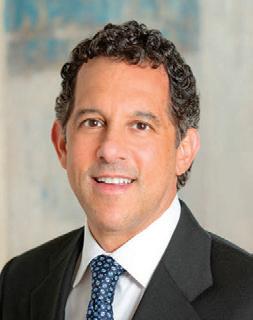
•
•
•
•
•
•
•
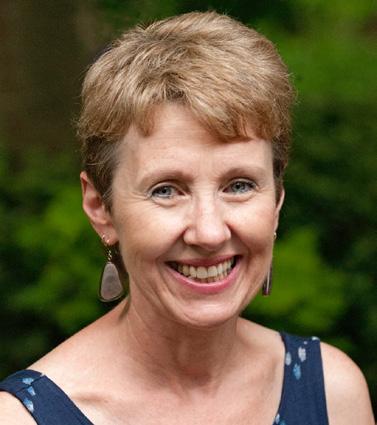
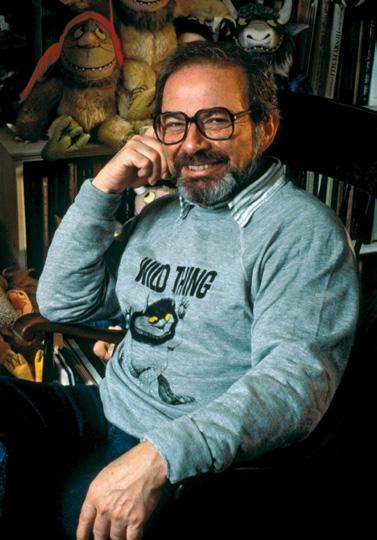

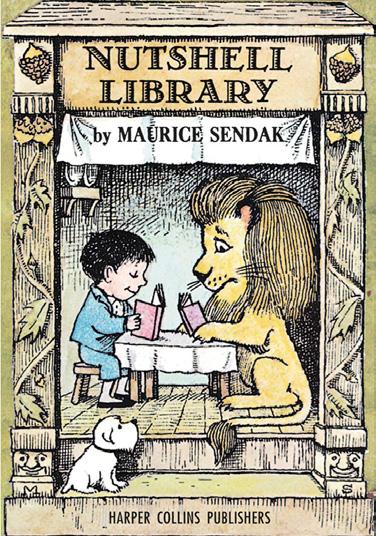 By Debby Block
By Debby Block
June 10th is the birthdate of the incomparable Maurice Sendak, author of one of the most popular children’s book of all times, “Where the Wild Things Are.” Published in 1963, Sendak’s iconic children’s book pushed the envelope by including illustrations of creatures that were, at the time, deemed too grotesque and too scary for children. Today, we understand that Sendak’s characters are the stuff of children’s dreams and that giving those dreams life helps children deal with and understand their own fears and frustrations. Sendak is quoted as saying: “Certainly we want
to protect our children from new and painful experiences that are beyond their emotional comprehension and that intensify anxiety, and, to a point, we can prevent premature exposure to such experiences. That is obvious. But what is just as obvious, and what is too often overlooked, is the fact that from their earliest years, children live on familiar terms with disrupting emotions. Fear and anxiety are an intrinsic part of their everyday lives; they continually cope with frustrations as best they can. And it is through fantasy that children achieve catharsis. It is the best means they have for taming Wild Things.”

Maurice Sendak is unquestionably one of my best-loved authors. I clearly remember the first book fair that I visited in elementary school. The very first set of books I ever purchased for myself was the “Nutshell Library” by Maurice Sendak, which included miniature copies of “Alligators All Around,” “Chicken Soup with Rice,” “One Was Johnny,” and “Pierre.” I still have these books and I still treasure them! Because I was a shy child and frequently afraid
to assert my true opinion, my favorite book of this set was “Pierre,” the story of a boy who always said “I don’t care.” Happily, my grandchildren love these books as much as I did. While the timeless content of these books is delightful, there is truly something to be said about the size of the books as well. Tip to parents: Little hands love to hold little books! I recommend the “Nutshell Library” for children 2 to 6 years old.
Sendak was born in Brooklyn, New York, in 1938. His parents were Jewish immigrants from Poland. His childhood was dark and self-described as a “terrible situation” because of the deaths of many extended family members in the Holocaust. No doubt there are echoes of this dark childhood through many of the books that he authors including “Outside Over There,” in which goblins steal a baby from its home or Sendak’s collaboration with Tony Kushner on the re -
telling of the Holocaust opera in “Brundibar.” Although these are wonderful pieces of literature, I do not recommend them for children under six years old.
A largely self-taught artist, Maurice Sendak illustrated more than 150 books during his 60 year career. Indeed, Sendak’s illustrations delighted me as a child and influenced my early love of literature. Sendak illustrated many of my best-loved childhood books, including “A Hole is to Dig” by Ruth Krauss, “Little Bear” by Else Homelund Minarik, “Mr. Rabbit and the Lovely Present” by Charlotte Zolotow, as well as “Zlateh the Goat” by Isaac Bashevis Singer.


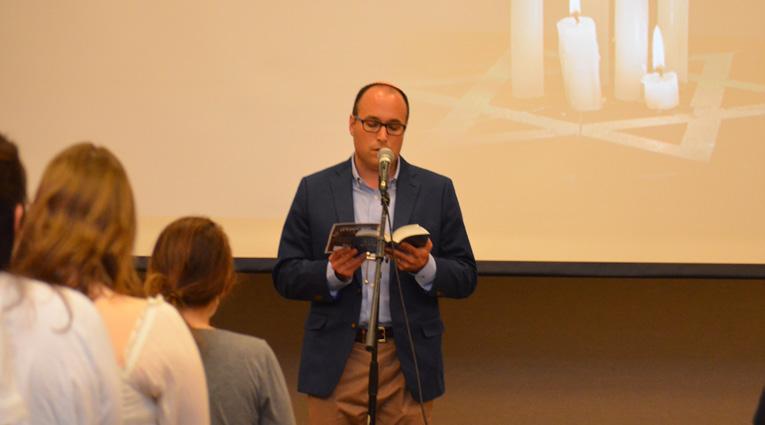
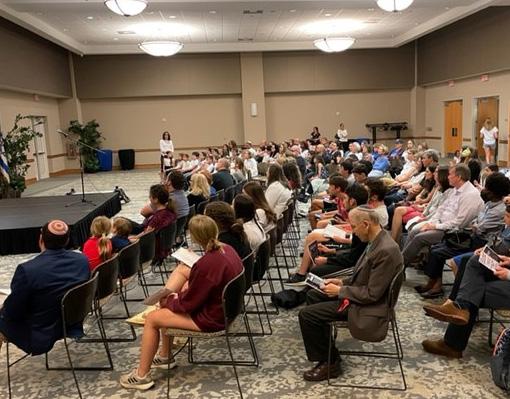

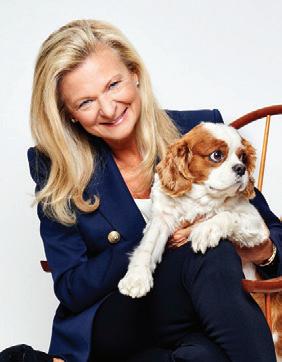
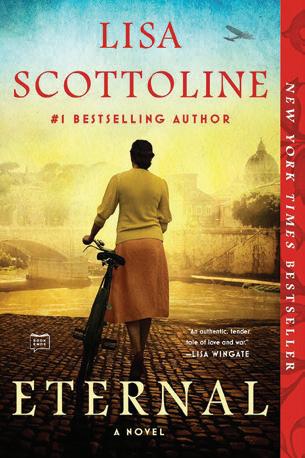

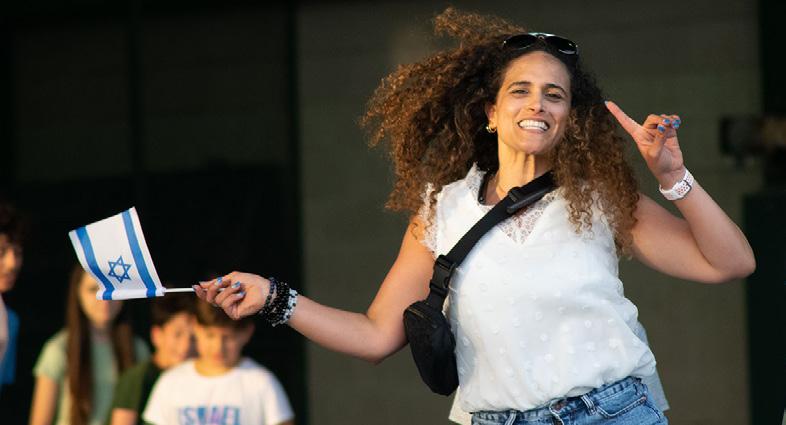
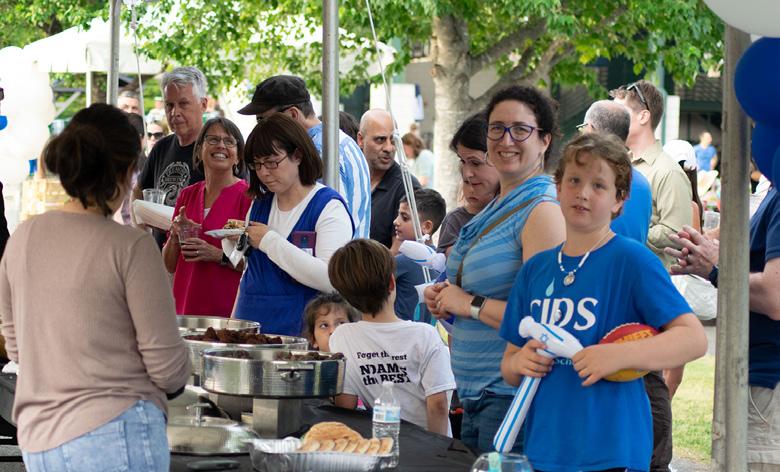
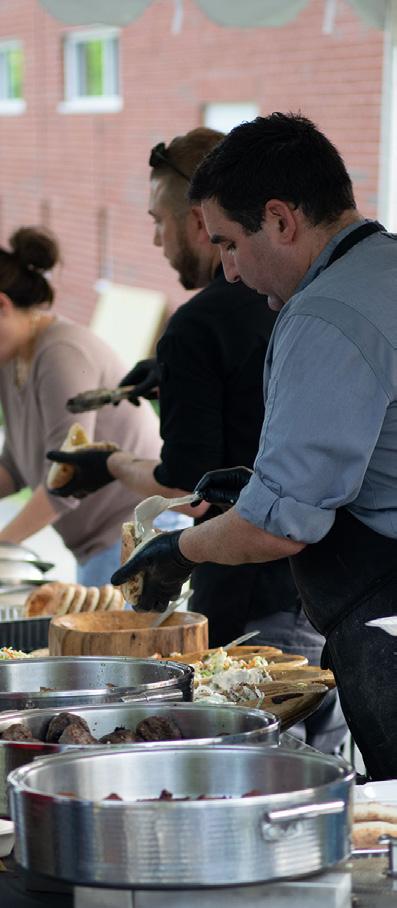
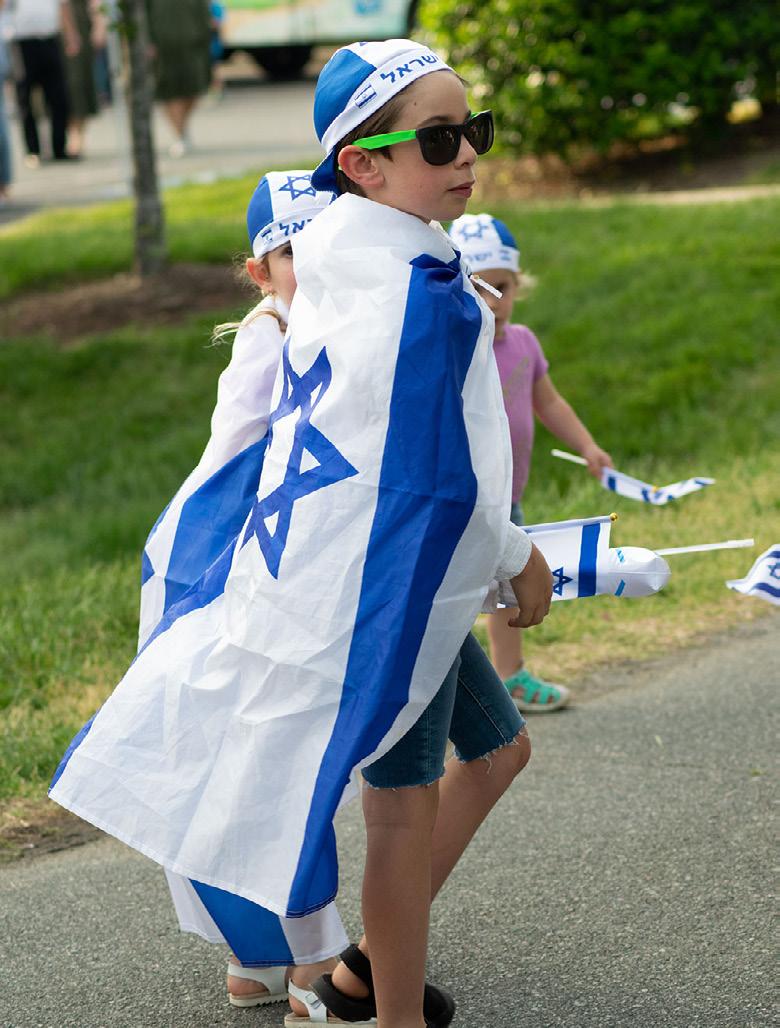
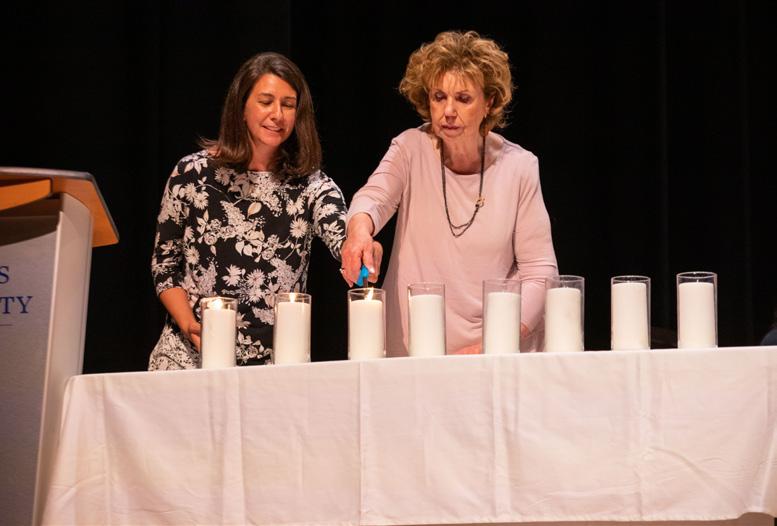 By Noah Goldman
By Noah Goldman
The clock strikes 10. A loud siren sounds for the entire country to hear. Cars park. People stand. Everything comes to a pause. It feels almost as if the birds stop in flight and that even the wind takes a breath. For two minutes the siren sounds, and in that time a nation gives itself time to remember. Then, the siren stops, and the pace of everyday life resumes. This is what happens on Yom HaShoah in the State of Israel. In Charlotte, North Carolina, we observe the day differently, but our observances are also profound.
Yom HaShoah is an official Israeli national holiday, and in the United States and other Diaspora communities, it is incumbent upon us to observe the holiday as well. In 1951, the Knesset, the Israeli Parliament, declared that Yom HaShoah shall be observed on the 27th day of the Hebrew month of Nissan to coincide with the anniversary of the first day of the Warsaw Ghetto Uprising. In the month of April, the Charlotte Jewish community organized two unique programs to honor local Holocaust survivors and liberators and to learn from their life stories.
The first event, a brunch, was both a celebration and a commemoration. This program was made possible by a grant from Hillel International intended to create a program related to Israel; Queens Hillel chose to use the grant for a Yom HaShoah program. In attendance were 19 Holocaust survivors, 15 Queens University students, Stan Greenspon Center Holocaust and Social Justice Education Center staff, Jewish Family Services staff, and Charlotte Symphony Orchestra musicians with the “Music and the Holocaust” program.
Similar to the tradition in Israel to stop and pause to honor and reflect, the program began with a moment of silence. Even participants for whom it was a physical challenge stood, with Ukraine fresh on everyone’s minds. One woman, a Ukrainian Jewish Holocaust survivor stood, with tears in her eyes.
Elie Wiesel famously said that when you listen to someone’s story, you become a witness — a person who is called to bear testimony to what they heard and speak the truth to what they heard. That morning, survivors met some of the torchbearers of the next generation, who on that day became the witnesses Wiesel described. The students learned from those who not only survived the Holocaust but also persevered to this day.
As part of the Yom HaShoah brunch program, musicians from the Charlotte Symphony Orchestra affiliated with their “Music and the Holocaust” pro-
gram played lively klezmer music for everyone to enjoy. The ensemble takes its program into the schools, using music to help educate middle and high school students about the Holocaust. On this day, everyone in the room was able to be moved and entertained by the music that was popular during the time of the Holocaust.
The second Charlotte observance took place at Queens University on April 26, with a performance by student and faculty musicians from Queens University, Central Piedmont Community College, and UNC Charlotte music department.The program attracted both Jewish and non-Jewish attendees.
Shira Lissek, Temple Israel’s cantor, set the tone for the evening, opening with Kenny Karen’s moving “If the World Had Cried.” Rabbi Judy Schindler then opened the program, expressing gratitude for the many partners who had made the evening possible and speaking about the history of the violins that would be played during the performance, violins with a profound history and a connection to the Holocaust from the “Violins of Hope” collection. On behalf of Rabbi Asher Knight from Temple Beth El, Rabbi Dusty Klass spoke of the chutzpah (a marvelous Yiddish word) of the survivors and of the Jewish people. Chutzpah, Rabbi Klass said, is something between daring, courage, and audacity, and is a required trait in order to survive, fight back, and create a better future.
As is traditional in Charlotte’s community Yom HaShoah commemorations, candles were lit to honor those with a connection to the Holocaust. The first candle honored all the Jewish victims of the Shoah. Those that followed honored the non-Jewish victims, the liberators and righteous gentiles, Charlotte’s local Holocaust survivors, the second, third and fourthgeneration descendants of survivors, , and all who bear witness. This year a seventh candle was added for those suffering in Ukraine.
The heart of the evening was the performance of “Intonations,” a new musical work inspired by the stories of five unique violins rescued from the Holocaust and their owners, as told in the book “Violins of Hope: Instruments of Hope and Liberation in Mankind’s Darkest Hour,” written by UNC Charlotte musicologist Dr. James Grymes. Dr. Grymes spoke of the violins, encouraging the audience to listen for and hear what the violins would say if they could speak. Intonations is written from the perspective of the violins, giving voice to the stories and history they lived and witnessed. Soloists for the performance includ-
ed Dr. Mikylah Myers on violin and Audrey Babcock, mezzo soprano.One of the most moving moments of the performance was the entrance of youth violin soloist David Karpov. The music shifted as the 15-year old walked onto the stage, wearing a white and blue kippah, playing a violin that had once belonged to a Jew-
ish industrialist who fled Warsaw. It was as if what he played was an answer to the musical call for future generations to carry the stories of the violins with them. The event concluded with the remembrance of six local Holocaust survivors who passed away during the past year. In conclusion, as is tradition the Mourner’s
Kaddish was recited, this year led by Temple Israel’s Cantor Helene Kornsgold, and Cantor Mary Thomas from Temple Beth El led Eil Malei Rachamim. The responsibility to commemorate the Holocaust falls upon all humanity, inspiring us to combat hate in every form, protect all minorities, prevent genocide, and to celebrate and support Jewish survival. Whether it is a nationally sponsored Israeli commemoration, or a community created event in the diaspora, its observance can be transformative, as it was this year in Charlotte. The Charlotte Jewish community seeks not only to preserve history but to pass on the lessons and stories to the next generation. In April, many new witnesses were created and one can certainly expect that Yom HaShoah will continue to be observed for many years to come.
(Continued from page 1)
inspired by the book of the same name, “Violins of Hope: Violins of the Holocaust — Instruments of Hope and Liberation in Mankind’s Darkest Hour,” written by University of North Carolina (UNC) Charlotte professor of musicology, James A. Grymes.
The event was the culmination of months of planning by leaders from Jewish and non-Jewish organizations alike, including Stan Greenspon Holocaust and Social Justice Education Center, Jewish Family Services, UNC Charlotte Music Department, UNC Charlotte College of Arts + Architecture, Temple Israel, Temple Beth El, the North Carolina Council on the Holocaust, Levine Jewish Community Center Butterfly Project, Central Piedmont Community College, Arts at Queens, and the Jewish Federation of Greater Charlotte. Beyond that, it was the crescendo of a decade-long story of the Violins of Hope that began in Charlotte in 2012 and by pure serendipity returned to Charlotte 10 years later for both the Yom HaShoah Commemoration and an additional concert two nights later at UNC Charlotte.
To understand the meaning and significance of this occasion, one really needs to understand the history of the Violins of Hope.
Violins of Hope Violins of Hope is a project of Amnon and Avshalom Weinstein, father and son violin
makers in Tel Aviv and Istanbul respectively, who have acquired and meticulously restored a collection of roughly 95 stringed instruments, predominantly violins, with a connection to the Holocaust — many from the ghettos or concentration camps. What began with one violin, brought to Amnon by a Jewish survivor of Auschwitz, became a lifelong mission for the luthier. The survivor who brought that first violin to Amnon no longer played the instrument, itself a survivor but badly damaged from the rain and snow, but wanted to have it restored for his grandson. When Amnon first opened the case, he discovered ashes, which he could only presume were fallout from the crematoria at the deadliest camp of the Holocaust, where 1.1 million Jews were murdered. This led Amnon, who himself had lost his entire extended family in the Holocaust, to seek out these instruments, learn their stories, and give them voice once again. Most of the instruments come from surviving family members and tell stories of how music was, in Grymes’s words, “a comforter in man’s darkest hour,” and in some cases even saved the lives of the musicians in the camps.
By 2011, the collection of these instruments only totaled 20 and, with the exception of once in Switzerland, none had been played in a performance setting. It was through the vision, collaboration, and diligence
of many individuals and institutions, spearheaded by the UNC Charlotte College of Arts + Architecture and including Jewish organizations, churches, schools, and the Charlotte Symphony Orchestra, that the violins were brought to Charlotte — their very first time anywhere in the Western Hemisphere. Since then, the violins and related performances and programming have traversed the country and the world, but the international movement that uses the physical artifacts, music, and means to educate and inspire began here, in Charlotte, 10 years ago.
The project that brought the violins in 2012 was a monumental undertaking, a collaboration of dozens of individuals and organizations, both Jewish and non-Jewish. Spearheaded by UNC Charlotte College of Arts + Architecture, a month-long series of events and exhibitions was planned. At the core was an exhibition of 18 of the violins at Charlotte’s new City Center Building Gallery. An additional component of the 2012 Violins of Hope project was educational outreach to the region’s schools. Students from elementary to high school age came to see the violins in exhibition, and under the leadership of Jackie Fishman, an educational commit -
tee developed a comprehensive curriculum guide about music and the Holocaust, designed for use by middle and high school teachers. One legacy of the educational aspect of Violins of Hope has been the “Music and the Holocaust Program,” with the Charlotte Symphony Orchestra, which is still active in the schools today. This multi-programmatic approach set the precedent for how communities would present the violins in future exhibitions.
The Violins Inspire Local Author
Professor of musicology at UNC Charlotte and music historian Dr. James A. Grymes was teaching at UNC Charlotte when Violins of Hope came to the city in 2012. He became fascinated with their history and their stories and, with the enthusiastic support of the dean and the college, embarked on a journey to conduct further research. In the acknowledgements of “Violins of Hope: Violins of the Holocaust,” Grymes explains, “As my
What resulted was the National Jewish Book Award winner titled “Violins of Hope: Violins of the Holocaust — Instruments of Hope and Liberation in Mankind’s Darkest Hour,” published in 2014.
In his book, Dr. Grymes explores the stories of six unique violins from the historic collection, their histories, and those of their owners. Using their personal stories, he tells the larger story of the various roles the violins, and music, played in the lives of the Jews who carried them through the Holocaust, roles of liberator, comforter, and even savior. These violins literally saved the lives of some Jewish prisoners who were often given preferential treatment in trade for their musical talents, sometimes used in unimaginable ways.
As cities around the country became enthusiastic about hosting the violins, Dr. Grymes and his book became a component of any program organized around Violins of Hope. In an interview in San Francisco, when the vio-
versary of the liberation of Auschwitz, Music at Kohl Mansion in San Francisco commissioned a piece by composer Jake Heggie and librettist Gene Scheer, “Intonations: Songs From the Violins of Hope,” based on the stories told in Dr. Grymes’s book. In the 40-minute song cycle, the first five of the seven movements represent the voice of one of the unique violins, telling its own story.
In a full-circle moment, it is that musical work that was finally brought back home to Charlotte and was played in two concerts, including the community Yom HaShoah Commemoration, in April.

Circle — Back to Charlotte
In 2020, the UNC Charlotte College of Arts + Architecture planned for an East Coast premiere of “Intonations” with the soloists accompanied by a professional string quartet, but COVID intervened, so the performance was shelved. When audiences began to gather again for live performances, the college again planned to perform the piece, but with a scaled-back student performance as part of its annual spring concert with a collaborative orchestra composed of musicians from UNC Charlotte, Queens, and Central Piedmont Community College.
In a stroke of serendipity, the dates planned for the concerts fell evenly on either side of another important date observed each spring — Yom HaShoah, the day commemorating the victims of the Holocaust. Noticing this, Meg Whalen, director of communications and external relations of the College of Arts + Architecture, immediately recognized that some collaboration with the Jewish community was essential and contacted the Stan Greenspon Center Holocaust and Social Justice Education Center to begin the collaboration.
CSO Youth Symphony, was invited in 2020 to play the part of the score of “Intonations” specifically written for a youth soloist — a moving expression of hope entitled “Liberation.”
According to Dr. Grymes, “The ‘Liberation’ movement is the only texted movement not based on a story from ‘Violins of Hope.’ Since ‘Intonations’ was commissioned to commemorate the 75th anniversary of the liberation of Auschwitz in 2020, Gene Scheer and Jake Heggie wanted to specifically address the liberation. The ‘Liberation’ movement is a very dramatic and emotional moment. After being liberated with its owner, the violin (as embodied by the mezzo-soprano) asks, ‘Is it over? Can it really be over? For a moment?’ before answering for itself, ‘Yes, but for a moment only.’ At that point, the piece turns from telling stories of the past to imploring the audience of today to never forget those stories. It is then that the young violinist enters, just as the mezzo-soprano recaps the words from the first movement: “Remember this: When they tell us not to pray — Tell us to forget — When they tell us not to hope — We will play these violins.
played a violin made in Warsaw in 1924 for Shimon Krongold, a Jew who had escaped from Warsaw to Russia and then to Uzbekistan. David himself, he would discover in 2010, had Jewish family in the area who fled persecution in Ukraine at the end of the 20th century and settled in Kazakhstan, less than 1,000 miles away from where Shimon Krongold ultimately succumbed to typhus.
And in one of many full-circle moments, on a trip to Israel in 2019, David was able to meet the man who had restored Shimon’s violin, the man who has restored more than 95 violins that are connected to the Holocaust, and the place where Violins of Hope began — Amnon Weinstein.
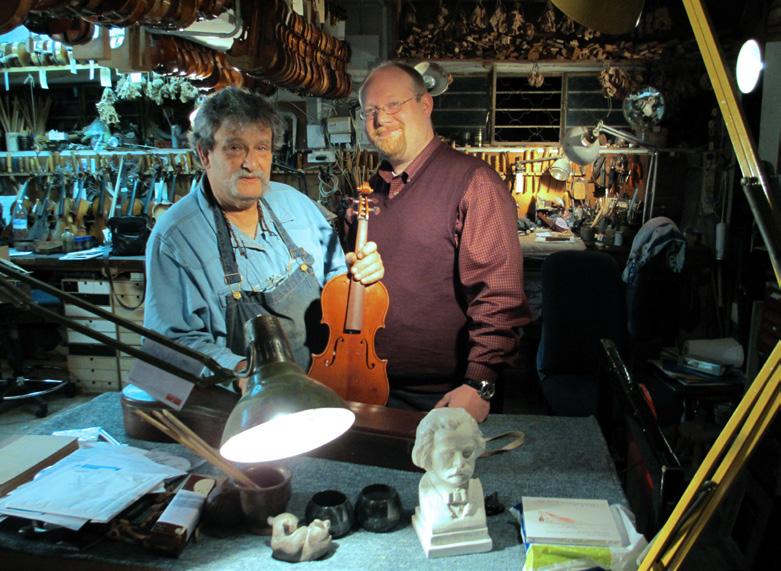
university planned for the events in Charlotte, I grew increasingly fascinated by what I was hearing about Amnon Weinstein. My recent research had focused on music in Hungary before, during, and after the Holocaust, so the Violins of Hope project resonated with me on a human, artistic, and scholarly level — a perfect storm of intellectual curiosity. In February 2011, I spent a week with Amnon and his charming wife, Assi, in Tel Aviv, seeing the instruments for myself and learning more about Amnon’s journey. It was during this trip that I became inspired to write a book about the violins and the musicians who once played them.”
lins made their West Coast debut, Dr. Grymes said, “Violinists have a deep connection with the genealogy, the lineage, of their instruments. When a musician plays a violin, over time, where they lay their fingers down leaves the tiniest of imprints that musicians can feel and sense, so in some sense they can physically feel the presence of whoever owned and played the instrument in the camp or ghetto, and recreate their voices, so even though those musicians may have not survived the Holocaust, their voices and spirits live on through these instruments.”
For that West Coast debut and in recognition of the 75th anni-
In further serendipity, some of the violins from the collection were in South Carolina at the same time. Receiving permission to use some of the violins in connection with the performance, Dr. Grymes drove to South Carolina and personally brought back five of the violins, three of which were displayed in the lobby and two of which the soloists played for the performance.
L’Dor V’Dor – The Violins Continue To Speak
For David Karpov, the intervening two years between the originally planned performance and the actual performance in April brought a once-in-a-lifetime opportunity that would profoundly enhance his connection to the instruments. Thirteen years old at the time, David, who played first chair violin with the
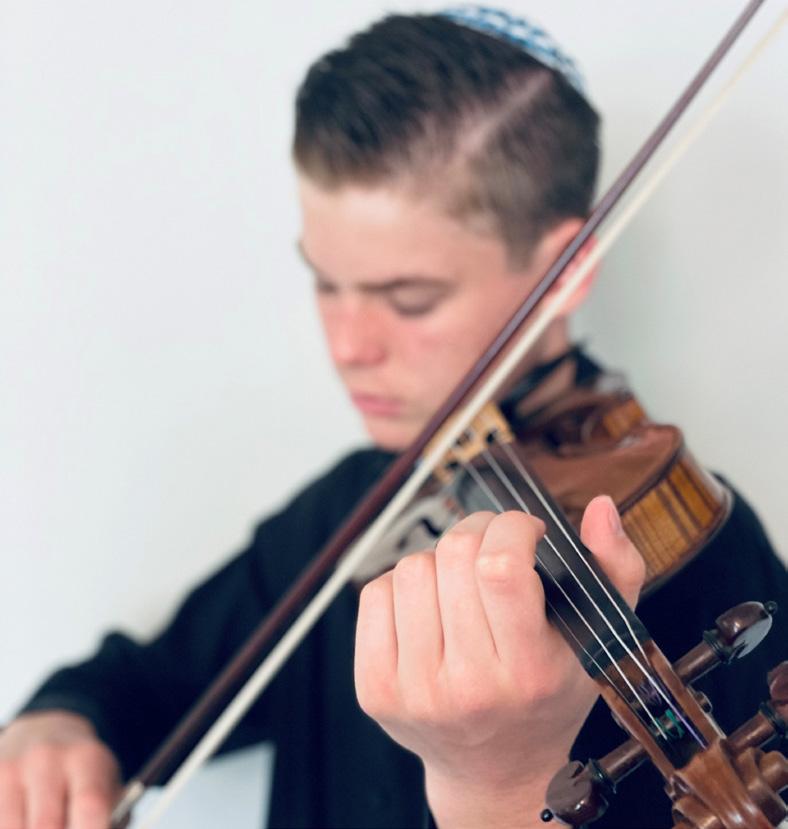
Intonations: Songs From
“The entrance of the youth violinist, who walks onstage and engages in a duet with the solo violinist who has been playing throughout the piece, is an intentional reference to the great Jewish tradition of l’dor v’dor — from generation to generation — representing the transmittal of these stories from one generation to the next.”
In 2020, David planned to play his own violin. In 2022, he
It’s impossible to know how many people have been touched since the Violins of Hope were first brought to Charlotte in 2012. That year, 40,000 experienced the violins in one form or another. But with the hundreds of thousands of people who have experienced the Violins of Hope, with all the people who have been moved, inspired, and educated, the true message of the violins was unmistakable in that one moment at the Yom HaShoah Commemoration when a now15-year old violinist walked on stage, heard before seen, a literal embodiment of l’dor v’dor. The musicians who once owned those violins may have perished, but because of their instruments’ voices, there is hope that the next generation will not forget and that they will survive.
Concert halls are designed to enhance reverberation, that subtle quality that resembles an echo and carries the sound into the future beyond the last note. After the last note had been played — when the musicians were still but before the applause, there was a moment in which more than sound lingered in the air. Everyone present recognized the reverberation that promises us that the music, the stories, and the hope will carry on.
“Remember this: When they tell us not to pray, tell us to forget; When they tell us not to hope, we will play these violins.”
the Violins of Hope

When hate comes to you or to an organization you’re familiar with, which we hope it never does, some specific responses are effective, if not transformative.
When it comes to college campuses, the statistics are alarming. According to Hillel International, during the summer of 2021, some 32% of college students reported experiencing antisemitism on campus, 79% reported it happening more than once, and 15% reported that they are afraid to even tell their friends, roommates, or teammates they are Jewish.
Sadly, our Queens University campus became part of those statistics in late April, as swastikas were scrawled on three of our Hillel students’ front doors. The Stan Greenspon Center staff is part of a community team of first responders to antisemitism. Here are some of the lessons we teach as a center that we put into action and that may inform individuals and organizations you know that encounter the same.
Put safety first
Make sure students’ or victims’ physical safety and emotional well-being are secured. On our campus, that meant immediately increasing security for all our Hillel students and providing counselors to those who were affected.
Inform the police, Anti-Defamation League, and the Jewish Federation of Greater Charlotte. Tracking hate crimes and bias incidents is critical.
Denounce the act and provide accurate
If it is at a school, be certain the school administration denounces the act or acts in unambiguous terms. It is important that these acts be labeled (an act of antisemitism, homophobia, or Islamophobia, for example). Silence or lack of clarity creates confusion, allowing anxiety, fear, misinformation, and distrust to grow. Dispel misinformation by sharing the facts you know.
Communication from the organization has to happen quickly as information unfolds. If the first

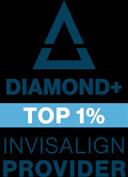
communication misses the mark, take time to author a next draft with input from community experts.
Many community leaders, including the Anti-Defamation League, the Stan Greenspon Center, the Jewish Federation of Greater Charlotte, the North Carolina Council on the Holocaust, and Hillel International (for college campus incidents) are ready to help. Use them to review your messaging, share best practices, and/or stand with you in support.
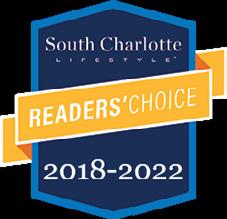

If the incident is at a school, create an open and direct line of communication between the administration and affected students. On the Queens’ campus, our initial response included immediate emails of support to the students from the dean of students and the president of the university. The campus rabbi and coordinator of Jewish life were available with calls, emails, and a gathering around a fire pit. The president of Queens invited all our Hillel students to meet with him on a Sunday morning. Our students felt fully supported.
Work with the media
Creating a media plan is critical. A minor incident might not make it into the headlines, but broader media attention can come one’s way. Writing a brief media statement of just a couple of sentences can help control the message.
Seek justice, avoid blame Rumor mills can cause greater harm. Affirm the Jewish values
More than 200 students, staff, faculty, and community members come out for “Stand for Unity” gathering to support Hillel students at Queens University following antisemitic attack
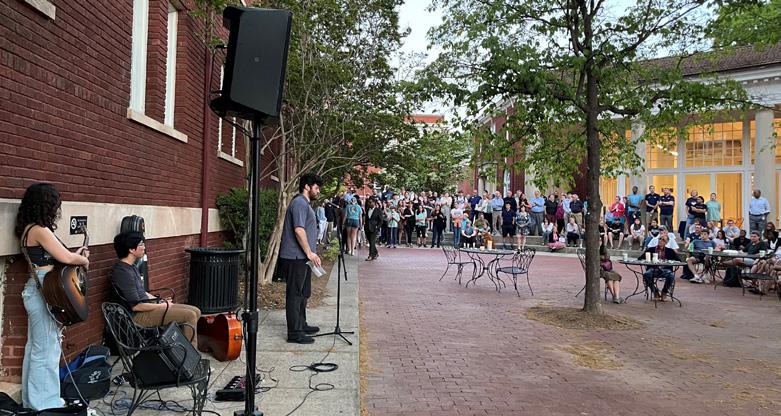
of honor, respect, and inclusion, not gossip and innuendo. Remind community members of the importance of reserving judgment until all facts are in.
Promote healing Offer support to the entire community connected to the victim or victims. Other minorities can also be triggered by events aimed at one minority.

Every single person has a role to play. Ask yourself, “What can I do?” We are all part of the solution. We are all called to be alongside those who have been hurt and to care for those who have been affected to create a safe, inclusive, and caring community for all.
At Queens, we created a “Stand for Unity” gathering that 200 students, staff, faculty and community members attended in support. Student musicians played healing music, the victims spoke with courage, and the student body and campus community shared their understanding of
the extent of the harm that was caused. For an hour afterward, the community lingered to offer words of support, hugs, and commitments to engage with Hillel and to craft a safe and affirming community in the weeks and years to come.
The outpouring from the Jewish and interfaith communities, broader Charlotte leadership, and Queens alumni were a helpful part of the healing process. We embraced the community expression of concern that came our way and shared some of those messages, as they were so moving.
We learned that far too many on our campus do not understand the meaning of antisemitism, the history of hate that the swastika holds, and the harm that chalk or a marker in one person’s hand can cause. Noah Goldman, our coordinator of Jewish Life, is leading a summer book group for the campus community on Ambassador Deborah Lipstadt’s book titled “Antisemitism: Here and Now.” Hillel International has created material, Understanding Antisemitism on Campus, including short films on the topics of “What is Judaism?” (16:40 minutes), “History of antisemitism’ (9:45 minutes), and “Antisemitism today” (17 minutes).
We are working to secure funding to create a Jewish Student Ambassadors program to train our Hillel students how to share their own faith stories, how to teach about Judaism to their peers, and to gain the skills to combat antisemitism and other forms of hate.


The Stan Greenspon Center offers support in crafting curricular responses so that hate crimes and bias incidents become an educational opportunity.
Let hate not be the last word
When and if hate happens in your life, let it not hate be the last word. For there is a long path to healing and transformative education that follows. We are taking that path ourselves at the Greenspon Center at Queens University and are here to help you navigate that path if it tragically touches your life.
Ever since my days at Temple Israel religious school, the Jewish principle of tikkun olam (the notion of repairing the world through acts of kindness) was engrained as part of my Jewish perspective. For many of us, life’s pace and daily monotony crowd out the idea of performing such acts of kindness. At Pesach we say, “Well, next year in Jerusalem,” and “Sure, I’ll get around to it eventually.” For the people of Ukraine, tomorrow isn’t guaranteed. Russia’s unrelenting war on Ukraine continues, and the world is taking action. For my father, Robert Adler, praying for the Ukrainian people simply wasn’t enough. In June, he will be traveling to Polish border towns as a volunteer with World Central Kitchen to welcome Ukrainian refugees to safety with open arms and warm meals.
Although originally an independent insurance broker by practice, his unique passion and cooking skills have transformed into a fully operating food business, Ernie’s Smokehouse (a true

hobby gone wild, as the rest of our family would attest to). His cooking has demonstrated how food is a beautiful way of bringing people together, both in times of joy and in hardship. Unspeakable crimes have been perpetrated upon the Ukrainian people, resulting in thousands of civilian casualties and deaths and making refugees of millions more. As a Russian history major in college (like I said, he’s a Jack of all trades), Robert couldn’t shake his calling to help the Ukrainian people in their time of need.
Many late nights of research led him to the incredible efforts of renowned chef Jose Andres and World Central Kitchen (WCK). Its mission is to cook and deliver food to communities in hardship worldwide in times of crisis. Within a matter of days after the Russian invasion, WCK employees and volunteers arrived in Poland and surrounding countries, using existing restaurants and facilities to prepare meals for the inevitable flow of Ukrainian refugees. They haven’t stopped since. Robert will
In a world that seems more interconnected than ever, we can paradoxically feel more disconnected from events happening beyond our borders. While the 24-hour news cycle and the constant refreshing of Twitter feeds may deter others from facing the gruesome realities of the situation in Ukraine, it instead solidified Robert’s desire to help. He
has repeatedly told me, “It’s in my bones” to go over and help these people. He said, “If I can just put a smile on one person’s face with a warm meal, give them some momentary comfort, and let them know they’re loved, I will have succeeded in making a difference.”
Like many Ashkenazi Jews, the Adler family came from Eastern Europe on a journey to Ellis Island around the turn of the 20th century. While the exact lineage is not known, our family roots can be traced back to Russia, Poland, and Ukraine. So when Robert says, “It’s in my bones” to help these people, it is, in a way, like a homecoming, helping our distant relatives in most need.
His itinerary remains fluid because of the situations on the ground, but it will also include visits to the Nazi concentration camps in Poland, such as Auschwitz-Birkenau. It is said that we must never forget the horrors of the Holocaust to ensure it is never repeated. With no mercy, Russia’s destruction has included
the decimation of the Drobitsky Yar memorial in Kharkiv, which served as a commemoration to the nearly 15,000 Jews who were shot and/or forced into mass graves during the Holocaust. Eighty years later, the site has been destroyed and once again surrounded by bloodshed and tragedy.
However, there must remain a light at the end of this tunnel. Robert recognized the need to help and take action. If his mission teaches us anything, it’s that repairing the world can happen through any mitzvah, big and small. He’ll be serving it up every day with some traditional Polish food, a heart of gold, some good Southern comfort, and a New York state of mind.
If you would like to learn more about my father’s upcoming trip, you can visit his GoFundMe page at www.erniesbbq.com or https://gofund.me/2063a417. All proceeds will be going to WCK’s efforts in and around Ukraine.

The Village on Morehead, currently under construction, will offer an exceptional experience for those seeking epicurean inspired cuisine, engaging programs, rejuvenating health and wellness services in a sophisticated community where you will Live Life Well®.

The Board of the Foundation for the Charlotte Jewish Community (FCJC) has made a $20,000 grant to the Jewish Federation of Greater Charlotte (JFGC) in support of our community’s efforts to support Jews in Ukraine.
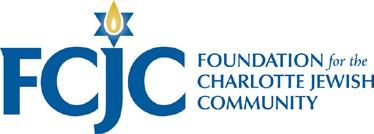
In April, FCJC informed its donor-advised fund holders of a matching challenge grant, from FCJC funds, for grants made to Jewish Federation of Greater Charlotte designated to support Ukrainian relief efforts. The FCJC match was limited to $1,000 per grant with a total commitment of $20,000. As a result of this challenge, $19,430 of FCJC donor grants qualified for the FCJC match. Combined with previous grants and the FCJC match, a total of $78,030 in grants has been made from FCJC-managed funds to JFGC as part of support of Charlotte’s Ukrainian Relief efforts. An additional $22,400 in grants was
made from FCJC donor-advised funds directly to national organizations such as the Jewish Federation of North America and the American Jewish Joint Distribution Committee.
In 2021, over $7.6 million was distributed from FCJC-managed donor-advised funds to support Jewish and non-Jewish public charities in the Charlotte region, throughout North Carolina and beyond. FCJC currently manages 96 donor-advised funds and assists its clients with their annual charitable giving and long-term charitable planning.

To learn more about donor-advised funds and how FCJC can assist you with your charitable planning, please contact please contact FCJC Executive Director Phil Warshauer at (704) 973.4544 or pwarshauer@charlottejewishfoundation.org.
Anonymous* (4)
Susan and Benjamin Aizenman
Gail and John Baron
Michael and Meredith Baumstein
Sanford and Lois Benjamin
Raymond Monty Bennett
Nancy and Sam Bernstein
Susan P. Bessey
Lillian (OBM) and Irving Bienstock
Peter Martin Blair
Philip Blumenthal
David and Bonnie Bornstein
Marian (OBM) and Walter Brawer
Suly and Richard (OBM) Chenkin
Jennifer and Jonathan Collman
Andrea and George Cronson
Michael and Beth Cupp
Ellen (OBM) and Dan (OBM) Dubin
Paul and Lynn Edelstein
Steven and Ellen Block Englehardt
David and Aleen Epstein
Melvin W. and Caren N. Frank
Alan and Ruth Goldberg
Mark and Linda Goldsmith
Milton and Arlene Goldstein
Shelton and Ellen Goldstein
Jennifer Cohen Golynsky and Leon
Golynsky
Brett H. Goodman
Julia and Russ Greenfield
Keith E. Greenspon
Stan Greenspon
Joel Horwich
Christy and Andy Horwitz
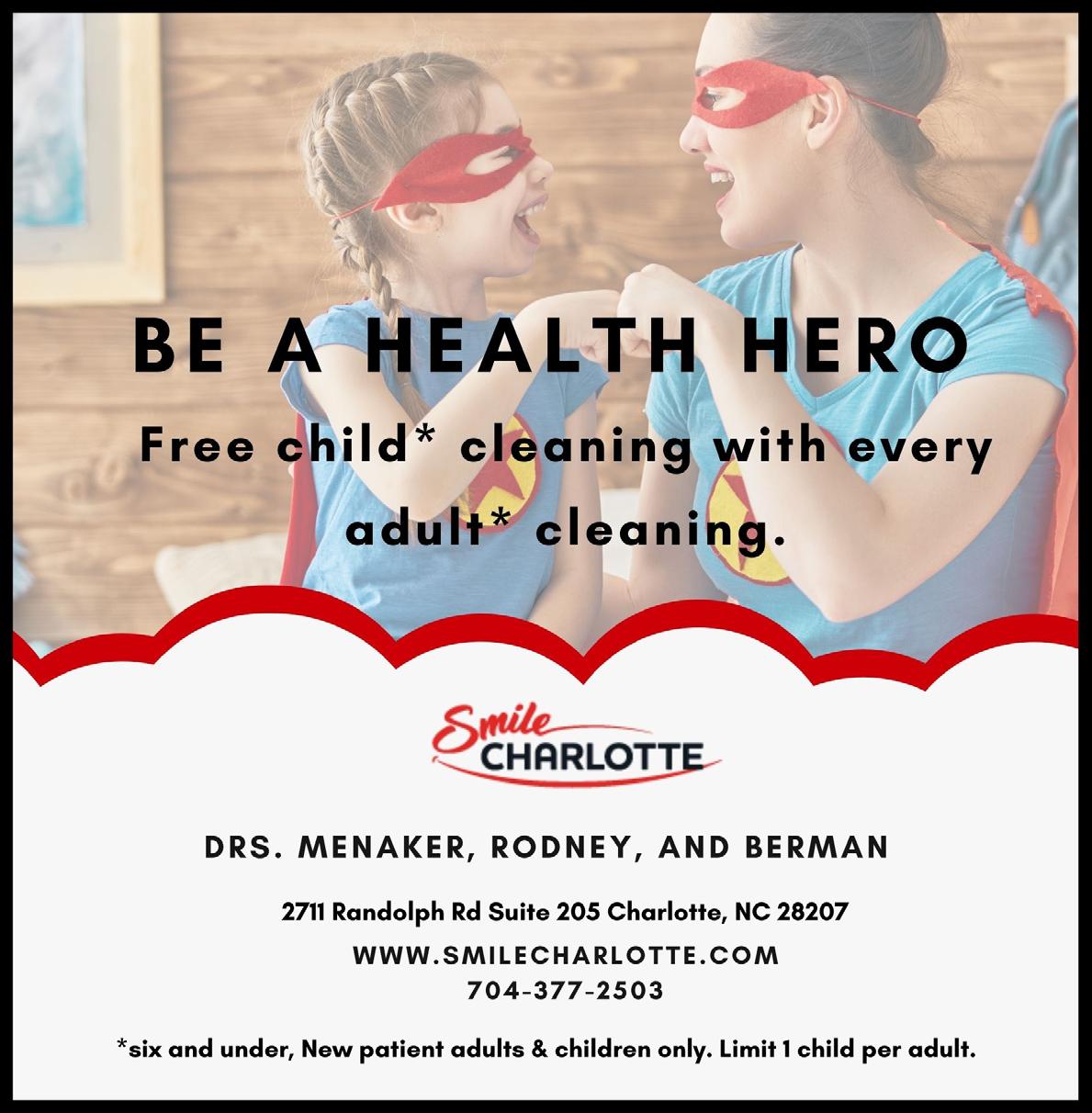
Jonathan M. Howard
David Jacobson
Florence Kaufman Jaffa
Nancy and Robert Kipnis
Lorrie and Barry Klemons and Family
Barry Bobrow and Karen Knoble
Elise and Jaime Kosofsky
Eric and Susan Lerner
Gary and Donna Lerner
Harry and Gloria Lerner
Barbara and Jerry Levin Ross C. Levin
Julie Lerner Levine and Howard Levine
Leon and Sandra Levine
Louis A. Sinkoe and H. Kevin Levine
Holly and Hal Levinson
Lisa Strause Levinson
Andrew and Gwendolyn Lindner
Annie and Harrison Lord
Joshua and Adina Lowensteiner
Meg D. Goldstein and Matthew Luftglass
Isaac (OBM) and Sonia (OBM) Luski
Laura Milgrim
Risa and David Miller
Staci and Darren Mond
Margaret Musa
Richard J. Osborne
Marcelle and Allan Oxman
Wendy and Lee Pake
Harriet and Mark Perlin
Wendy and Adam Petricoff
Debora and Ed Pizer
Larry and Dale Polsky
William and Debra Porter
Baila and John (OBM) Pransky
Susan and Bernie Sandler
Michael Scharf
Marty and Elaine Schefflin
Larry Schwartz
Morey and Lynne Sheffer
Gary and Maxine (OBM) Silverstein
Jonathan and Stephanie Simon
Anne and Mike Sinsheimer
Lori and Eric Sklut
Steve and Emily Snyder
Harry and Laurie Sparks
Philip and Lauren Stark
Stephanie and Steven Starr
Norman Steinberger (OBM)
Joseph and Renee Steiner
Ken and Marcia Stern
Cheri and Marc Titlebaum
Natalie and Mike (OBM) Tunney
Jeffrey and Karen Turk
Harold and Cynthia Turtletaub
Robert and Ellie Valenstein
Judie and Michael Van Glish
Liz Wahls
Janice and Ronald Weiner
Robert (OBM) and Anne Yudell
*Donors who wish to remain anonymous
OBM - Of Blessed Memory
Throughout my life, performing mitzvot has been an important part of my core set of values. My grandmother Georgeana Rippner raised us all not only to give our money and resources to those who are less fortunate than we but also our time. Although money is an integral part of community service projects, our most valuable asset is the time and dedication we give to others. My grandmother was a guiding force in my Jewish journey. Georgeana and my father, Ronnie, founded our family’s restaurant, Poppy’s Bagels and More. She worked the cash register and was always a familiar smiling face to all who entered. She believed in the importance of giving back to the community and to those less fortunate than we were. Leftover bagels at the end of the day are often picked up by Jewish Family Services, an initiative that she started. Walking through the Hebrew Cemetery with my father, he points out the headstones of friends and patrons of the bagel shop near my grandmother’s resting place. It is nice to see that members of the community stay together in this life and the next.
When she passed away during my freshman year of high school, I felt a pull to the Jewish community that helped fill the void of her absence. As a freshman in college at the peak of the pandemic, at a school with fewer than 200 Jewish students, I was immediately drawn to the Hillel at UNC Charlotte. Hillel has given me a space on campus to be unapologetically Jewish. After becoming a member, I became interested in pursuing a leadership role. Now I am president, and it is my turn to cultivate a space for Jewish students to explore their personal, cultural, and spiritual identities. I strive to
create an atmosphere on campus where Jewish students feel free to be the most authentic version of themselves, just as past presidents provided for me.
The values that North Carolina Hillel aspire to cultivate within students are kehillah (community), hachnasat orchim (hospitality), limmud (learning), ruchaniut (spirituality), and tzedek (justice). As president, I work to create an engaging calendar of events that emphasizes all of these values, including Shabbat dinners, holiday celebrations, and opportunities for community service/civic engagement. This year alone, we took part in the Butterfly Project and Challah for Hunger. We hosted Shabbat dinners, held holiday celebrations, and organized events meant to foster Jewish community at UNC Charlotte.
This spring, Hillel was honored to return to the Charlotte Hebrew Cemetery for our second annual cleanup. On May 1, approximately 40 volunteers participated. The first 15 minutes included a tour of the cemetery, and volunteers learned about some important individuals who are buried there. Some of our tasks included leveling foot stones, cleaning headstones, picking
up trash, and raking. Keeping our cemetery clean is integral to preserving the legacies and memories of members of the community who have passed on.
The cemetery cleanup is of utmost importance to me because my grandmother is buried on the grounds. It is beyond meaningful that I am able to return to the cemetery as a volunteer and Hillel president, to carry on my grandmother’s legacy and the legacy of all those who have passed on.

Through community service, I feel a connection to my grandmother, my Hillel, and the greater Jewish community in Charlotte and beyond. On behalf of Hillel, AEPi and ZBT, I would like to thank Sandra Goldman and the rest of the Charlotte Hebrew Cemetery for providing the wonderful opportunity to clean up the beautiful cemetery and learn about its history. We are looking forward to returning next year!
“Mitzvot and community service are so important in engaging with the community and providing help to those in need. The cemetery cleanup is a great mitzvah we do. Cleaning the headstones and maintaining the cleanliness of the cemetery is of great value to me and the com-
munity.” -Ben Shifman, AEPi
“Helping with the cemetery cleanup was a great way of giving back to the community and finding a sense of belonging in maintaining our most important spaces. Working alongside fellow students and friends was a great chance to meet new people and have a good time with people I already knew.” -Evan Drake, ZBT
“Participating in mitzvot, such as community service, provides excellent outlets for students to bond with one another, while helping to make our society a much better place to live and grow. Mitzvot teach responsibility, caretaking, and selflessness. All amazing qualities we strive for as leaders in our community.”
-Nico Brown, HillelThe Hebrew Cemetery joins with the community in remembering the names of those who have been buried at the Hebrew Cemetery in the month of April.
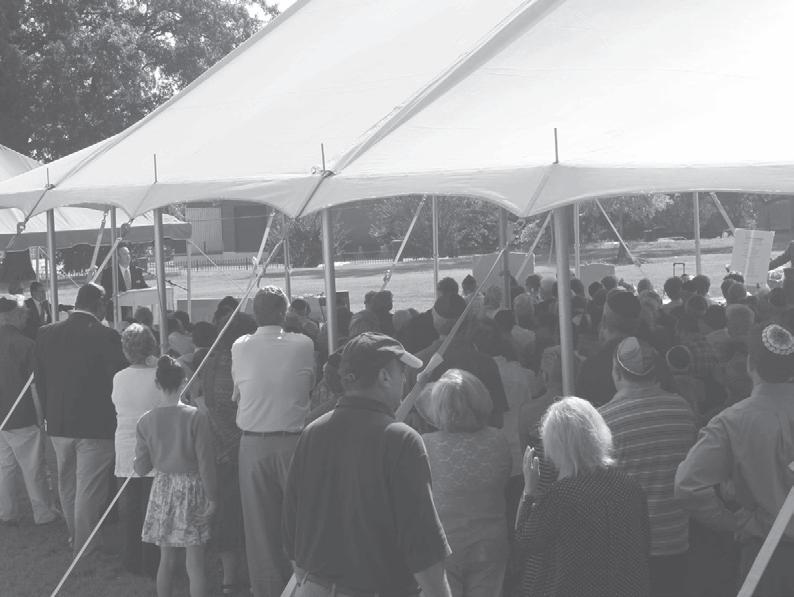 Riedl Martial Roumain Mary Beyderman Garr Cheskin
Riedl Martial Roumain Mary Beyderman Garr Cheskin
We Plan for a Living Space. Plan a Forever Place Today.
Why
• It’s a gift to your loved ones
• Provides you and your loved ones with peace of mind
• Don’t leave others to guess what you want for your funeral or forever place
• Plan and record your wishes (no purchase necessary)
• Receive substantial savings on places and service fees
• Lock in costs and avoid future increases
Ask about your forever place planning, green burials, cremations, markers, and more. Pay over 24 months or in one payment. Contact Director, Sandra Goldman at director@hebrewcemetery.org, or call 704.576.1859.
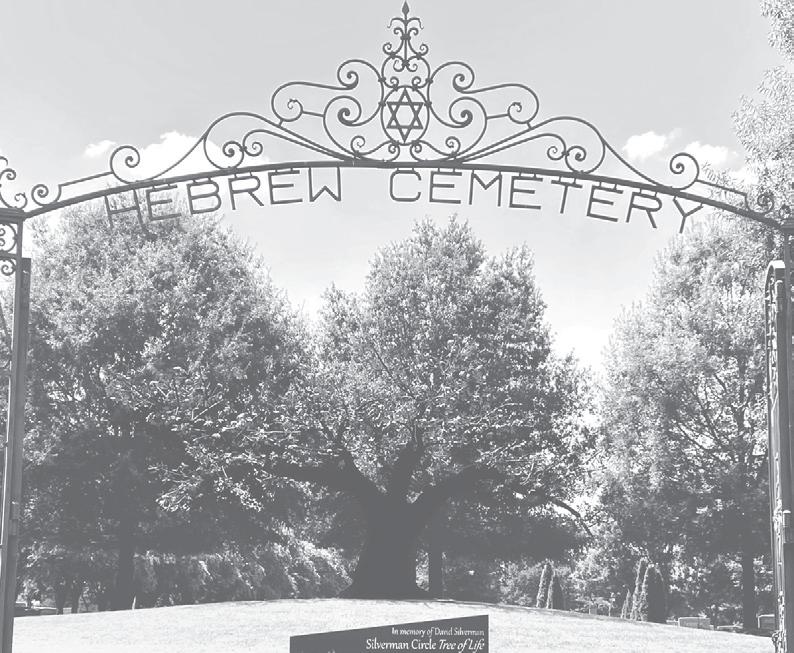
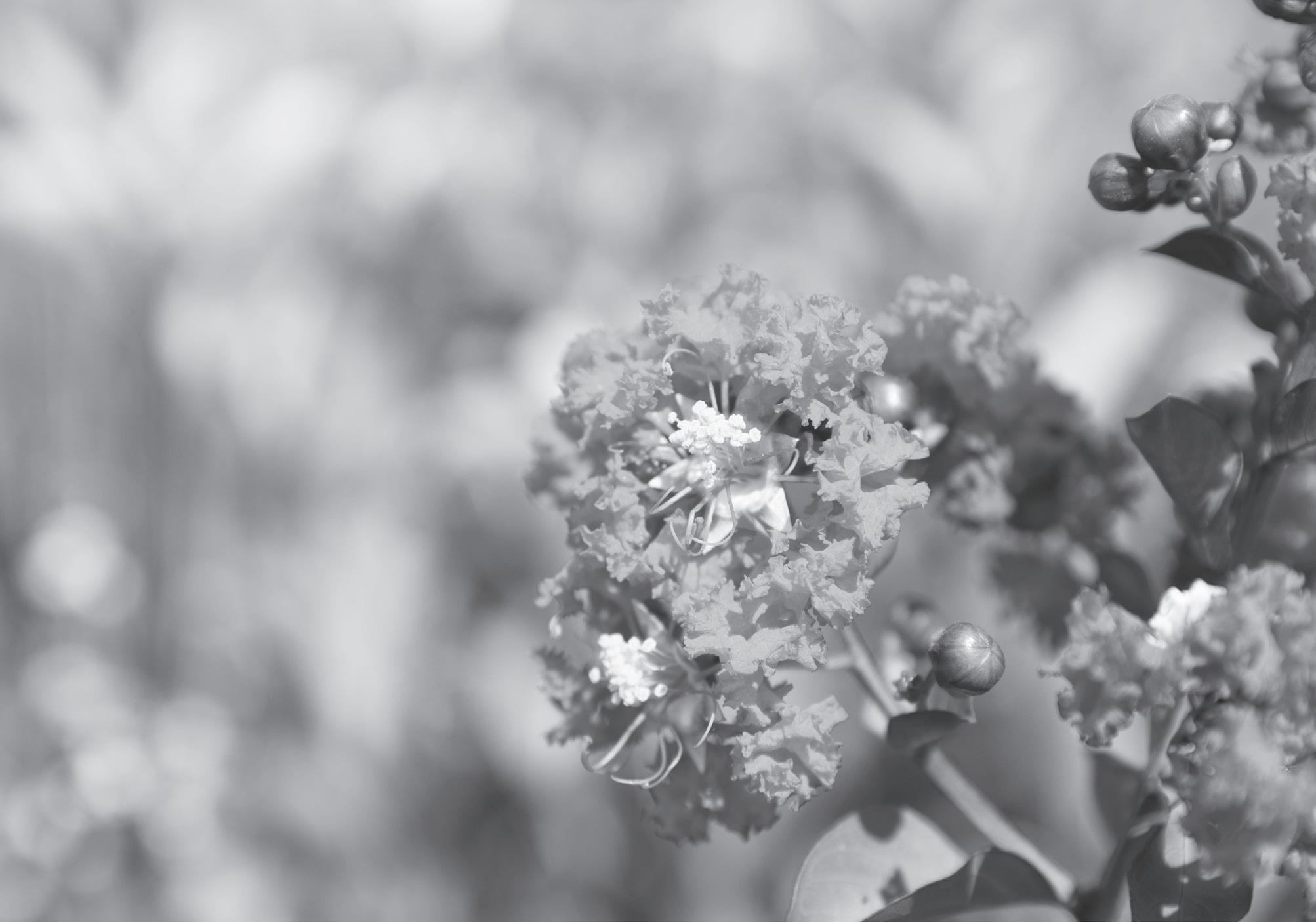
Make a tax-deductible annual membership of $108 or become a lifetime member for a one-time fee of $1,800.
www.hebrewcemetery.org
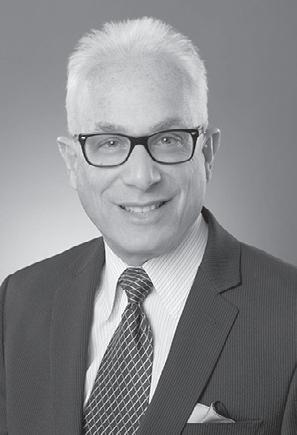
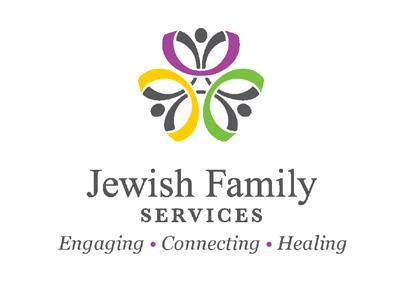 Rachel Green, JFS Director of Programs and Services
Rachel Green, JFS Director of Programs and Services

The COVID-19 pandemic has resulted in a “shadow pandemic” of new mental health challenges, including stress, grief, loss, and struggle, experienced by nearly every person over the past two years. JFS is working to ensure we have the capacity to meet these new challenges. As in any professional practice, this means implementing the most current, evidence-based “best practices” possible. To this end, Jewish Family Services (JFS) has identified three best practices to add to the continuum of clinical interventions offered at JFS .
According to the Association of Behavioral and Cognitive Therapies, “Evidence-based
practice can be best described as the application of research-based treatments that are tailored by an experienced therapist to meet the individual needs, preferences, and cultural expectations of those receiving them.”
JFS has joined a learning collaborative with the North Carolina Child Treatment Program. The training program, partially funded by the North Carolina General Assembly, works with therapists from across the state to train and implement evidence-based practices. JFS therapy and clinical staff are participating in the one-year training program that includes intensive clinical training, group and individual consultation calls with experts, and a senior leader track for agency administrators
to make sure the agency has the support and infrastructure needed to sustain the program long-term.
The therapy method JFS chose in the learning collaborative is called “Trauma-Focused Cognitive Behavioral Therapy” (TF-CBT). This therapy program treats children ages 3-21 who are experiencing emotional, behavioral, or psychological difficulties resulting from one more traumas. The program also works closely with families and caregivers.
Trauma can be defined in many ways. Therapists may explain the concept to children by saying a trauma is a “scary or confusing event,” and often times during this event, we are afraid that we or someone we love could be hurt or die. During the COVID-19 pandemic, this could have been the death of a grandparent or parent due to COVID, serious illness of a loved one, or other scary event. Children also experience traumas such as car accidents, serious illness, witnessing violence or very scary arguments, or natural disasters.
TF-CBT has been researched for decades and proven to be highly effective. According to
the National Child Traumatic Stress Network TF-CBT Fact Sheet, “TF-CBT has the strongest research evidence of any treatment model for traumatized children.”

JFS therapists have also turned their attention to the trauma experienced by the adults in our community. Cognitive Processing Therapy (CPT) is another evidence-based practice adopted in the past year at JFS. Like other evidence-based practices, CPT certification requires training, consultation calls, and reviewing skills for the first six months of practice with experts in the field. According to the CPT website, “CPT is a cognitive-behavioral treatment for Posttraumatic Stress Disorder (PTSD). CPT was developed in the late 1980s and has been shown to be effective in reducing PTSD symptoms related to a variety of traumatic events.” (https://cptforptsd.com).
CPT helps clients to understand how trauma and experiencing traumatic events can change thoughts and beliefs, and how these thoughts and beliefs have an impact on how we feel and behave. An essential aspect of the treatment involves, “addressing ways of thinking that
might keep individuals ‘stuck’ and get in the way of recovery from symptoms of PTSD and other problems.” Therapists work with clients to resolve these “stuck” points and find healing and resilience.
The past two years have also created new stressors for parents getting through everyday life.
JFS offers Triple P Parenting, an evidence-based parenting program that is offered oneon-one with the parent and the therapist or in a group or workshop format. This program has more than 35 years of ongoing research and is one of the most effective evidence based parenting programs in the world. (https://www.triplep.net/).
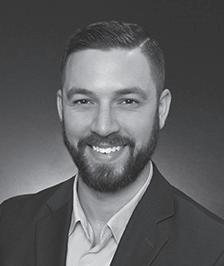
JFS continues to expand services to meet the growing needs of our community, with a continued focus on evidence-based training and therapy techniques to ensure the highest level of services and care.
Volunteers: Marcia Arnholt, Mike Arnholt, Andrew Bernstein, Suzy Catennazo, Dan Coblenz, Jonathan Collman, Andrea Cronson, Julie Dermack, Joni Deutsch, Terri Fishman, Rachel Friedman, Meredith Gartner, Estee Gelbard, Marty Goldfarb, Richard Goldsmith, Jennifer Golynsky, Gail Halverson, Meredith Haines, Rebecca Hockfield, Oren Hubara, Bob Jacobson, Jodie Joseph, Marcus Kallor, Michael Kaplan, Jennifer Koss, Etti Krause, Elliot and Stephanie Krietman, Marcia Lampert, Kim Levy, Adina Loewensteiner, Matt Luftglass, Gene Marx, Frada Mozenter, Beth Oxman, Wendy Petricoff, Barbara Rein, Nina Rose, Lynne Sheffer, Janice Shubin, Cindy Siesel, Louis Sinkoe, Lorin Stiefel, Ken Stern, Steve Teich, David and Beth Thrope, Amalia Warshenbrot, Nancy Wielunski, Amanda Zaidman

Live Laugh Give Committee: Andrea Cronson Adina Loewensteiner, Jodi Michel, Staci Mond, Fran Samarel, Louis Sinkoe, Karen Ransenberg, Amanda Zaidman
Hadassah Meal Preppies: Ellen Altman, Sharon Cavanaugh, Karen Futtersak, Yvette Jacobson, Johnson and Wales, Penny Krieger, Andy McCleary, Harriet Meetz, Helene Schillian, Joyce Stoll, Elissa Vining
Passover bags help: Jewish Student Union at Davidson College, Yom Gemilut Hasadim participants, Temple Israel’s Religious school
Food Drives: Jillian Bockenek in honor of her birthday, Charlotte Jewish Preschool Passover food drive, Charlotte Jewish Day School

Shalom Green: Thank you to your volunteers for harvesting fresh produce for the JFS pantry.
Food Pantry Donations: To our generous community: Thank you for continuing to donate to the food pantry. We continue to collect donations every other Wednesday at the portico entrance to the Blumenthal Center for Jewish Education Building on Shalom Park.
Corrections: In Honor of Judie Van Glish’s Retirement Mark and Harriet Perlin
In Honor of Michael Zacks’ graduation Ollie Polk
In Memory of Jean Finkelstein Robin Finkelstein
Jan Brown
In Memory of Norman Steinberger Don and Renie Fernbach Stanley Greenspon
one wants to diet. Set up realistic goals that you can accomplish. Follow up your goals with a plan. This will structure your time so you don’t overestimate what is realistic to accomplish. This will result in feeling good about what you have gotten done instead of feeling bad that you didn’t do everything you wanted.
Talk to your doctor about your medications. Summer can have a direct impact on the effects of your medications. If
to respond to your level of depression.
Reach out for help. If you are feeling overwhelmed and having a difficult time getting through the day-to-day, talking to a professional counselor can help. Contact Jewish Family Services at (704) 364-6594 or email info@jfscharlotte.org
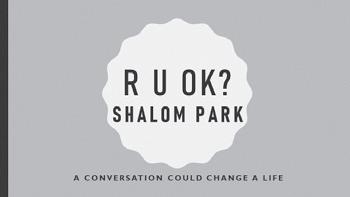
 By Howard Olshansky, JFS Executive Director
By Howard Olshansky, JFS Executive Director
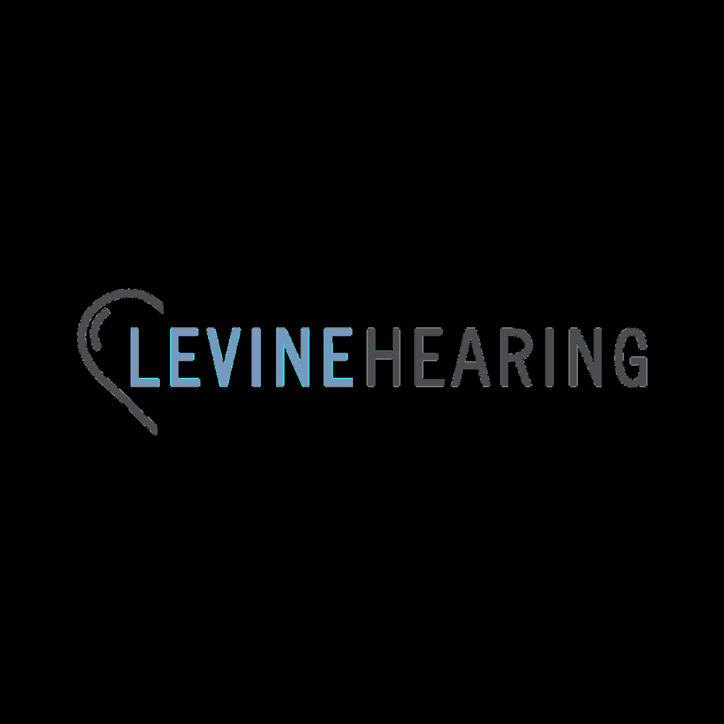
For some, summer can be a boost to their mental well-being. The increase in sunlight, alone, has its benefits, since an increase vitamin D is related to an increase in energy levels. Summer is also a time when many of us relax and take vacations or time for ourselves in other ways. But for some, the summer months are a time of stress and anxiety, and even increased depression.
A recent study at the Boston University School of Public Health reports that the number of patients seeking mental health support at hospital emergency departments increases during the summer months. Visits for childhood-onset behavioral and substance use disorders, anxiety and stress disorders, and mood disorders increase.
Here are some tips to help manage your mental well-being over the summer.

Take advantage of that summer sun. Spend as much time as you can outdoors. You will not only benefit from the Vitamin D but also the open air. That being said, this does not work on excessively hot days, and always use sun screen.
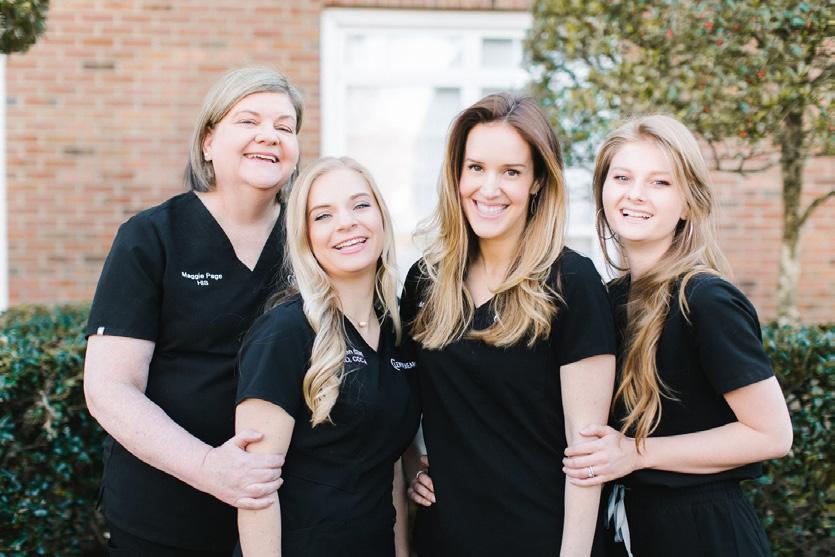
Plan ahead for your kids and teens. While their schedules don’t need to be as tight as they may be during school, structure helps with anxiety. Look for camps, programs, and other routine activities that keep them attentive. If finances are an issue, there are often scholarships available for many summer programs.
Plan your vacation carefully. Though a vacation seems like a relaxing way to spend the summer, the stress can sometimes have the opposite effect. Trying to make sure that everything is just right can increase your anxiety. Plan a vacation that is easy and that everyone will enjoy. Sometimes it is easier to plan a few mini-trips than one elaborate trip. Also, make sure you identify a trip your budget
can accommodate and stick to it. Overspending will just cause more stress when you have to deal with the bills.
Take care of your physical health. Summer is a great time to take advantage of those summer fruits and vegetables and the opportunity to eat light. It is also a good time to ramp up your exercise. Simple things like taking a walk, something that you wouldn’t necessarily enjoy in winter, will go a long way. Pay attention to your sleep. Getting enough sleep has a sig nificant impact on your mental well-being.
Manage your expectations. Many of us think summer is the best time to get a lot done that we haven’t gotten to the rest of the year. It is also a time every
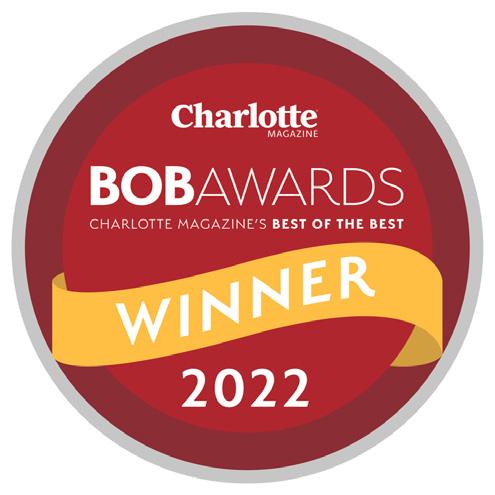
templeisraelnc.org
SATURDAY, JUNE 4 - EREV SHAVUOT

6:00 P.M. – SEUDAH SHELISHEET (DINNER)
7:00 P.M. – LEARNING SESSION I: THE TORAH ON ONE FOOT
In this class, we will make our way from the beginning of Genesis through the end of Chronicles and learn what makes each book special for us (Rabbi Wolk)
8:00 P.M – MUSICAL SESSION
The Torah of Music (Cantor Lissek)
8:30-8:45 P.M. – DESSERT BREAK
8:45 P.M. – LEARNING SESSION II
All Study, All Night... Come See what Kiddush, Counting the Omer, and Freedom have in Common (Rabbi Wolk and Rabbi Korsngold)
9:30 P.M. – MAARIV SERVICE
9:50 P.M. – LATE NIGHT LEARNINGLEGENDS OF THE TALMUD
Besides being a law book, the Talmud is the source of some of the most interesting Jewish stories. In this late-night session, we will study some of the less well-known Talmudic tales. (Rabbi Wolk)
SUNDAY, JUNE 5 - SHAVUOT – DAY 1
9:30 A.M. – SHAVUOT MORNING SERVICE 9:30 A.M. – TOTS SHAVUOT PROGRAM (Location: Temple Beth El)
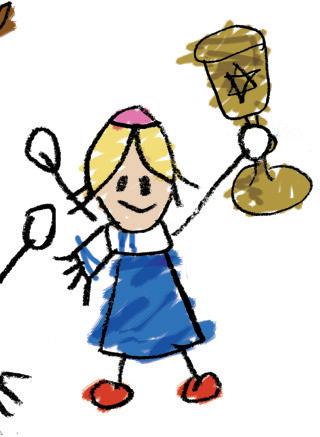


Come sing, dance, and pray with Ms. Patty and clergy from Temple Beth El and Temple Israel as we celebrate Shavuot. Our energetic service will be followed by a special holiday Kiddush snack and lots of time to create, play, and schmooze. Register by May 31 at https://tbe.shulcloud.com/event/tot-shavuot2.html
MONDAY, JUNE 6 - SHAVUOT - DAY 2 9:30 A.M. – SHAVUOT MORNING SERVICE, YIZKOR
FOR ADDITIONAL INFORMATION, VISIT THE UPCOMING PROGRAMS PAGE AT TEMPLEISRAELNC.ORG
During the summer months, all families with children up to 6 years (and their siblings) are welcome to SPLASH INTO SHABBAT with Torah Tots at the LJCC Pool/Splash Park! There will be open play, songs, and a Shabbat service capped off with a delicious kid-friendly meal. Cost: Members - $5/person; Non-TI members - $7.50/person. No charge for children under 1 year of age. To register, visit the Upcoming Programs page at templeisraelnc.org


in our small Jewish community of York County, South Carolina. Along the way, they learned Hebrew and about Jewish history and holidays.
Temple Kol Ami Religious SchoolIt’s a wrap! Another year of amazing Jewish education has come to an end at Temple Kol Ami (TKA) Religious School. From our Torah Tots to our b’nei mitzvahs, there was a lot of learning going on! Most importantly, our children strengthened their Jewish identities and made friendships that are so important
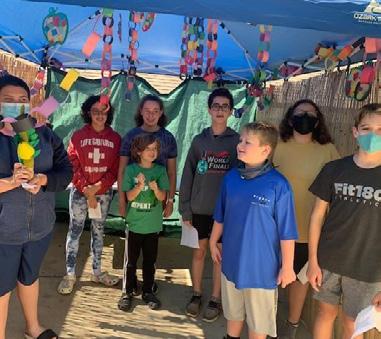
This year we were blessed to receive a grant from the Lenora Stein Fund for Creative Community Learning. With this funding, we exposed our students to cultural experiences to connect them to the diaspora. It was our goal to help our kids understand that they are part of a broad, worldwide Jewish cultural tapestry. Some events included our Chanukah Around the World celebration, a visit with Jewish musician Joe Buchanan, and a celebration of Israel that included food, music, and games.
(Continued on page 18)
Todah
OUR SCHOOL IS GROWING AND WE ARE HIRING! Are you looking to work in a fun, creative, and supportive community? Are you interested in being part of our faculty who love teaching children about Judaism?
Temple Israel Religious School is hiring teachers for Judaic Studies and Hebrew classes.

If you are interested, please contact Rabbi Kornsgold, Director of Congregational Education, hkornsgold@templeisraelnc.org, for more information. We hope to see you on our staff for the 2022-2023 school year.
RABBI HELENE KORNSGOLD DIRECTOR OF CONGREGATIONAL EDUCATION
HKORNSGOLD@TEMPLEISRAELNC.ORG • 704-944-6786

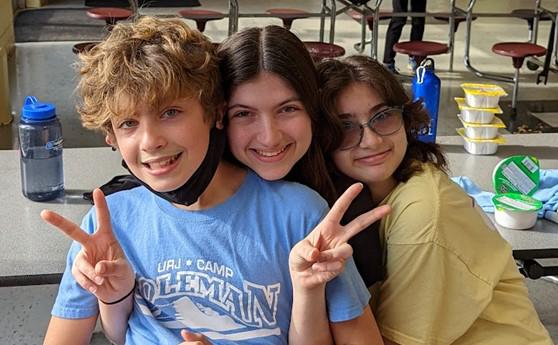
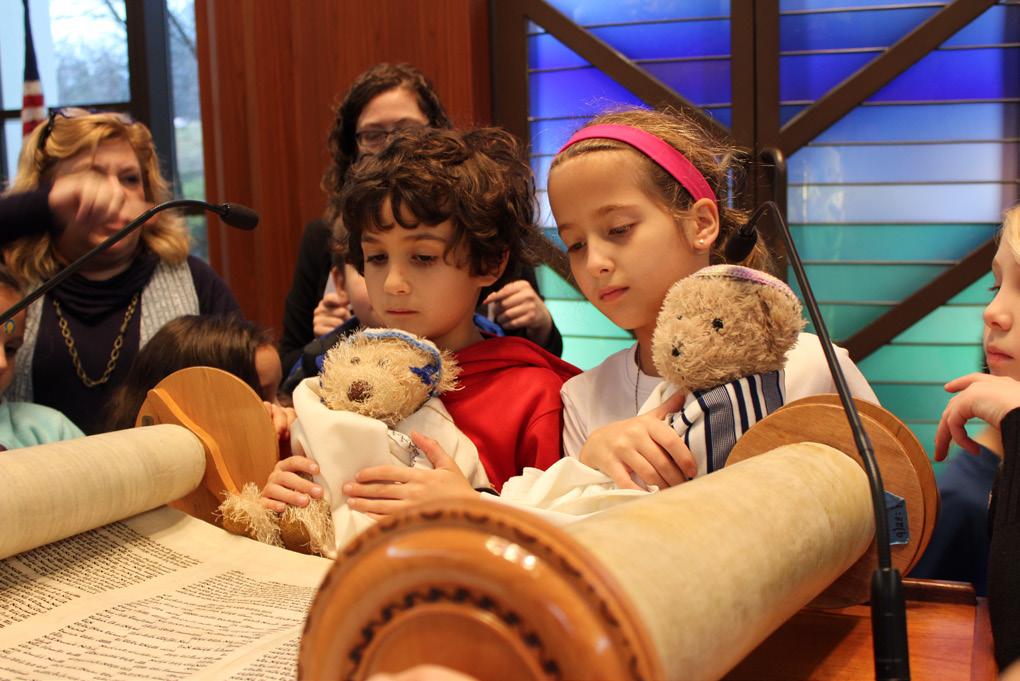
 By Adam Bernstein & Moira Quinn Klein with Jonathan Friedman
By Adam Bernstein & Moira Quinn Klein with Jonathan Friedman
Jonathan Friedman was named Temple Beth El’s first-ever chief operating officer (COO). Moira Quinn Klein and Adam Bernstein, co-chairs of the COO Search Committee, sat down with Jonathan to discuss what was most attractive about this position and what has been most rewarding since he started on April 25.
TBE: What compelled you to apply for TBE’s first-ever COO role?


JF: I have a deep desire to contribute to the spiritual well-being of the Charlotte community, and I was inspired by Temple Beth El’s dedication and effectiveness in this endeavor. We live in a time plagued by fear and in an era of extraordinary challenges.
had the pleasure of volunteering extensively across Shalom Park institutions. I have been inspired by the fantastic professional and lay leaders I have met and worked alongside in Charlotte, and I am proud of what these amazing teams, and those who came before us, achieved together. So when this opportunity arose, it felt like a calling for me.
TBE: What has the first month on the job been like?
JF: It’s been fantastic. The entire Temple Beth El team and congregation have been incredibly welcoming. I have enjoyed getting into the business of Temple Beth El and learning more about the many amazing groups, programs, and experiences that bring the community together at Temple Beth El. Our team is so focused on the mission, and I am enjoying getting to work on ways to enhance our operations.
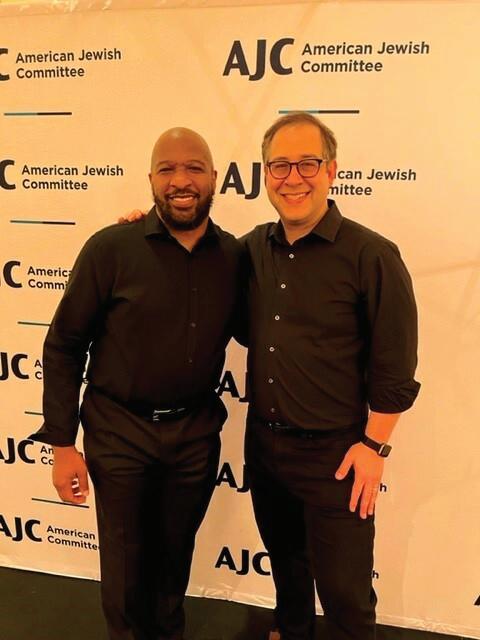
From the moment I walked in the door, the staff immediately treated me as part of the team. There is a great culture in the office, and everyone enthusiastically helped me get up to speed quickly so I could start to have a positive influence.
TBE: The congregation is
My very first official phone call on my first day was from Temple Beth El’s first vice president, Alan Kronovet, who reached out first thing in the morning to give some words of encouragement.
I also appreciated a warm welcome from other professionals around Shalom Park, and I am so excited to be working with them. We are so fortunate to have such a talented group of committed leaders who work so hard together to make Charlotte a vibrant Jewish community.
TBE: What is the biggest opportunity for Temple Beth El as you start your new role?

JF: The greatest opportunity is that we have the chance to be back together at various events after long years of isolation during COVID-19 and to reengage with each other. Whether at small group events (for instance, I am especially excited
as a community. I want everyone to know that they have a spiritual home at Temple Beth El and to feel a deep connection with the congregation. I am excited for 2023 as we celebrate Temple Beth El’s 80th anniversary.
TBE: What is the one thing you want people to know about you that they might not?
JF: I love to cook (and eat). My Bubbe worked in kosher catering for many years, and I am always happy to talk about cooking, Jewish or otherwise.
TBE: You and your wife Rachel just welcomed a new baby girl into your family. (You are now seriously outnumbered by females in the house!) What’s the best part of having a house full of young children?
JF: There is never a dull moment, and I am enjoying getting to relive fun childhood memories from books to farm visits to
Rabbi Dusty Klass began serving Temple Beth El as assistant and then associate rabbis in July 2016. Below are a few words of gratitude from her as she transitions out of her role at TBE and prepares for her move.
By Rabbi Dusty KlassLast month, I had the honor of showing three gentlemen from the Lakeview Neighborhood Alliance around Shalom Park. We spent almost two hours talking, and walking, and noticing. Showing off a place that is familiar to me to people who have never seen it gave me a chance to see it through their eyes, to rediscover and find a new appreciation for this place.
I have moved 13 times since I moved out of my parent’s house at age 18. Over the ensuing 18 years, the longest I have occupied any physical living space is just over three years. Sitting in my office last week, I realized that the room in which I was sitting, housed within the building of Temple Beth El on the Shalom Park campus, this place has been home for me for longer than any other geographic space in which I have dwelled since I was still under the care of my parents!

During the interview process that led me here six years ago, I fell in love with the idea of Shalom Park. Los Angeles, the city from which I was moving, overflowed with Jewish organizations. But collaboration is hard
in a city of almost 500 square miles, with a population of four million, and I’m also not sure how many Jewish organizations were actually interested in working together. Here, in contrast, I found a Jewish community that had summoned the chutzpah (audacity), the chesed (compassion), and the koach (strength) to build something greater than the sum of its parts.
Six years later, of course, I have a more nuanced and complicated image of Shalom Park.
I know that the more Jews there are in any one place, the more opinions will bounce around the table any time a decision needs to be made. I know that growth and change require hard, important conversations and decisions and that those conversations are ongoing. But that doesn’t change my gratitude for the experiences that Shalom Park has fostered and facilitated for me.
For me, Shalom Park is the Levine JCC: it is watching Temple Beth El (TBE) religious school kids shine as part of a stellar JSTAGE community theater production or walking past a weight-lifting 18-year-old former bar mitzvah student on my way to the exercise bike. It is answering rabbinic questions while learning how to throw on the pottery wheel and commiserating with fellow ceramics students over whatever the kiln did to our pieces.
Shalom Park is the Jewish
Federation, whose continued support not only bolsters TBE’s own programming but whose commitment to racial justice education in the wake of George Floyd’s murder offered our community a level of programming we could not possibly have put together on our own. What’s more, the Federation’s willingness to help monitor and support people, particularly students, in the wake of increasing antisemitic incidents allows all of us in the Jewish community to feel safe, seen, and know we have powerful allies in our corner.
Shalom Park is Charlotte Jewish Day School morning assembly and the opportunity to teach our community’s children Torah and Talmud. It is wading through hallways full of three- and four-
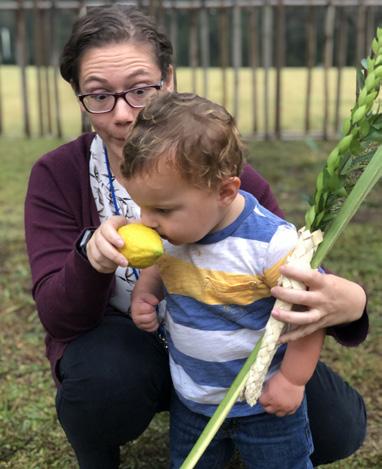
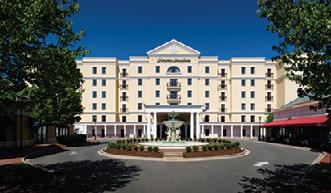

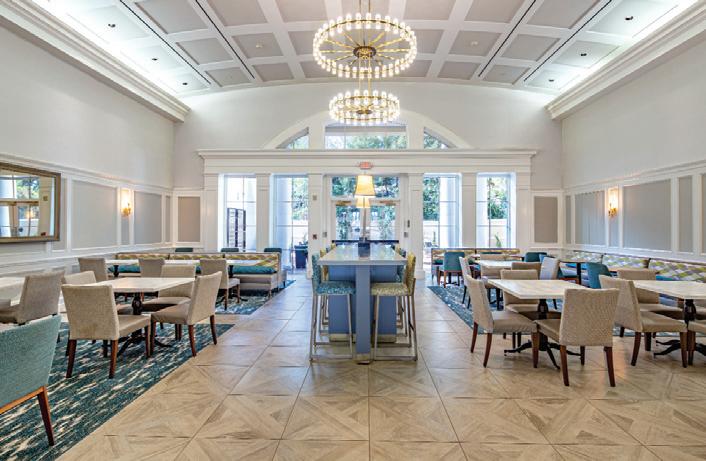
year-olds in swimsuits and oversized kippot on their way to Gorelik or Lerner Hall on Friday mornings and then dancing and singing along with them as they “bring in the light, bring in the light, bring in the light of Shabbat.”
Shalom Park is access to a strong, resourced Jewish Family Services, whose food pantry benefits from the produce grown in the community garden run by Shalom Green, whose staff are incredibly responsive and provide support to our congregants in some of their hardest life moments, and who help organize Charlotte-area clergy to offer in-home Shabbat experiences to the most senior members of our Jewish community.
Shalom Park is smiling knowingly with other TBE staff as b’nei mitzvah guests show up at our front door at 9 a.m. on a Saturday morning with a confused look, on their way to services at Temple Israel, and getting to tell them, “Don’t worry, you’re almost there; it’s just across the parking lot!” Shalom Park is the graciousness with which Temple Israel makes space for us to use the mikveh in its building to bring new Jews into the covenant. And Shalom Park is a Reform congregation and a Conservative congregation coming together multiple times a year to teach and learn and pray together.
And more than all of those organizations I have mentioned
and the programs and initiatives and resources they have offered, Shalom Park is people.

My Shalom Park is made up of phone calls and check-ins, of conversations and support. My Shalom Park is made up of human beings who have helped me shape a home in a part of the country so far from everything I had previously known.
Six years ago, I arrived in Charlotte, just five months before one of the most divisive presidential elections in our history. Over these past six years, almost every organization on the Park has navigated significant shifts in staff and personnel. And we have all somehow weathered a two-year global pandemic. I can’t take Temple Beth El with me, or the Jewish Federation, or Temple Israel, or Jewish Family Services, or any of the organizations that have touched my experience here. But you better believe I’ll be carrying my relationships with all of you and the lessons we have learned together into my next adventure. Which is why I love l’hitraot as a Jewish leave-taking — it’s not goodbye; it’s just “’til we meet again.”
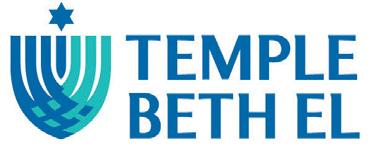
TKA Religious School is proud of all of our students and all that they have achieved in the past year, but we are definitely kvelling over helping to lead five of our young adults to their B’nei Mitzvahs in the past year.
Emily Roseman, Tessa Shaw, Logan Elias, Will Lyons, and Alex Silva were all called to the Torah, and each chanted beautifully, helped to lead the service and delivered fantastic D’var Torahs. Mazel Tov to these exceptional young men and women and their families!
It takes a village to raise our children. Many thanks must go out to our all-volunteer teachers and administrators. Without Ashley Endy, Stacey Constant, Michelle McIntire, Kate Smith, Aliza Simon, Shari Baum, Jonathan Shaw, Mark Resnik, Sarah Daniel, Andrew Lyons, and David Burack, TKA Religious School would not exist. Yasher Koach for a job well done!
We are looking forward to another great year of Jewish
education when we reconvene in the fall. An ice cream social/ open house is scheduled for August 28. Please check back in the August Charlotte Jewish News for more details. Contact tka. religiousschool@gmail.com for more information.
Temple Kol Ami is a diverse and welcoming Reform Jewish congregation located in Fort Mill, South Carolina. We hold Friday night Shabbat services the first and third Fridays of most months at Philadelphia United Methodist Church. We would love to have you visit our congregation and find out about our warm, family-oriented environment. For the most upto-date information, check out our website at www.templekolamisc.org.
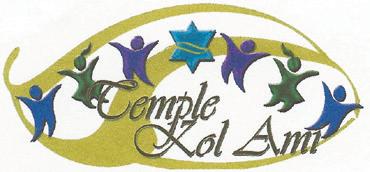
The holiday of Shavuot this year marks the 3,334th anniversary of the greatest event in Jewish history, the giving of the Torah by G-d to the people Israel at Mount Sinai. This monumental event changed the trajectory of the Jewish people forever; it is when we entered into an eternal bond with G-d.
Because it helped shape the formation of common law, which is followed universally, the giving of the Torah was also a turning point for the nations of the world.
Jewish Torah is life. Torah is the source of who we are; it nurtures and sustains us as a people and as individuals.
The Talmud sets forth the special readings of the Torah for Shabbat on holidays at synagogue services. On Shavuot, we are mandated to read the portion (parsha) of the Giving of the Torah at Sinai, from the Book of Exodus, including the reading of the Aseret Hadibrot — The Ten Commandments.
Just as all the Jewish people
— men, women, and children — were assembled at the foot of the mountain at the moment of the giving of the Torah, so too today we aim for a full assemblage of all Jewish people to be present in the synagogue for the reading of this special portion in the Torah.
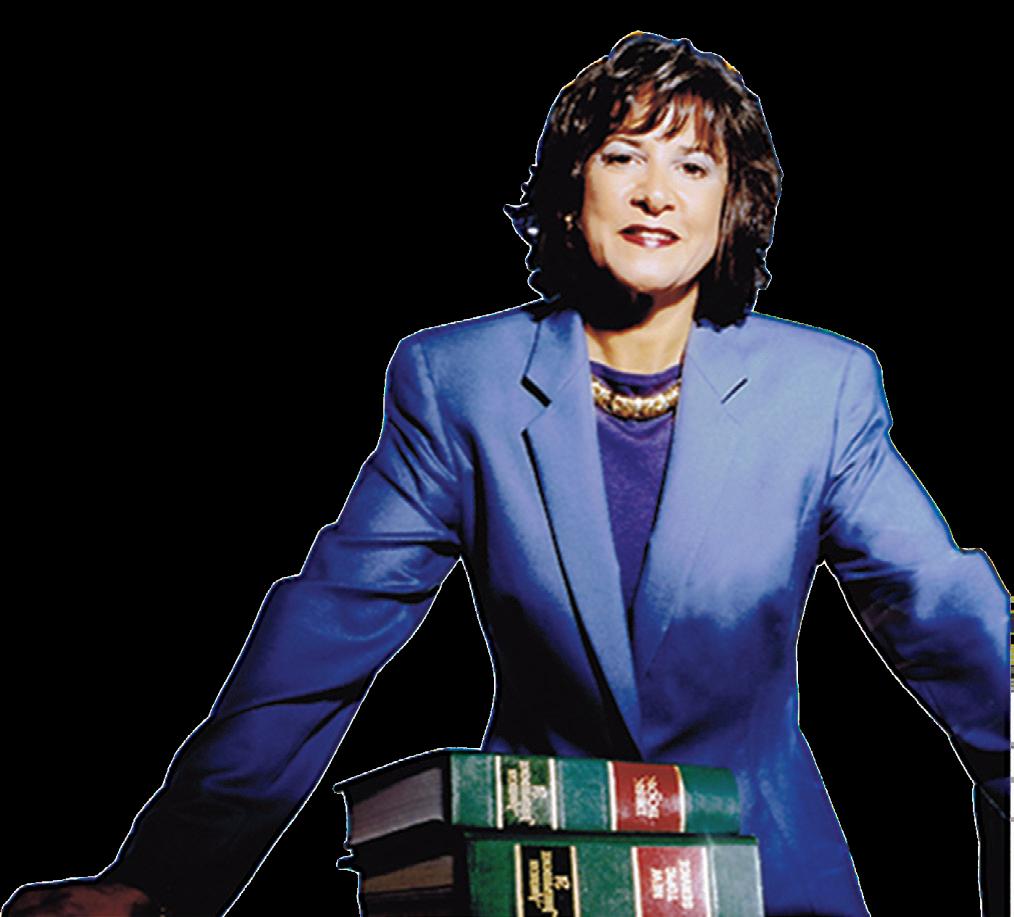
There is a unique emphasis on our children taking part in this reading. The Midrash says that before G-d gave the Torah, He requested from Moshe guarantors who would ensure the observance and safekeeping of the Torah. The only guarantors G-d accepted were the children. It is by guaranteeing that their children will be educated in Torah and its observances that we secure the perpetual life of Judaism.
That is why the Lubavitcher Rebbe called on all Jewish children to be present and partake in this renewal of the Torah by reading the special Torah portion on the first day of Shavuot.
This year Shavuot falls on Sunday, June 5, and Chabad of Charlotte will host a special Torah celebration at the Epstein
Family Chabad Center on Sardis Road. The celebration will include the reading of the Torah and a grand kiddush dairy gourmet luncheon prepared by Kosher Charlotte. In addition to an elaborate cheese menu, there will be plenty of ice cream choices for the children (and adults) to enjoy.
The service will begin at 10 a.m. A special children’s program will start at 11 a.m. with the Torah reading included. All are invited to attend. There is no charge for this event.
For more information, please visit our website at chabadnc. org. or call our office at (704) 366-3984.
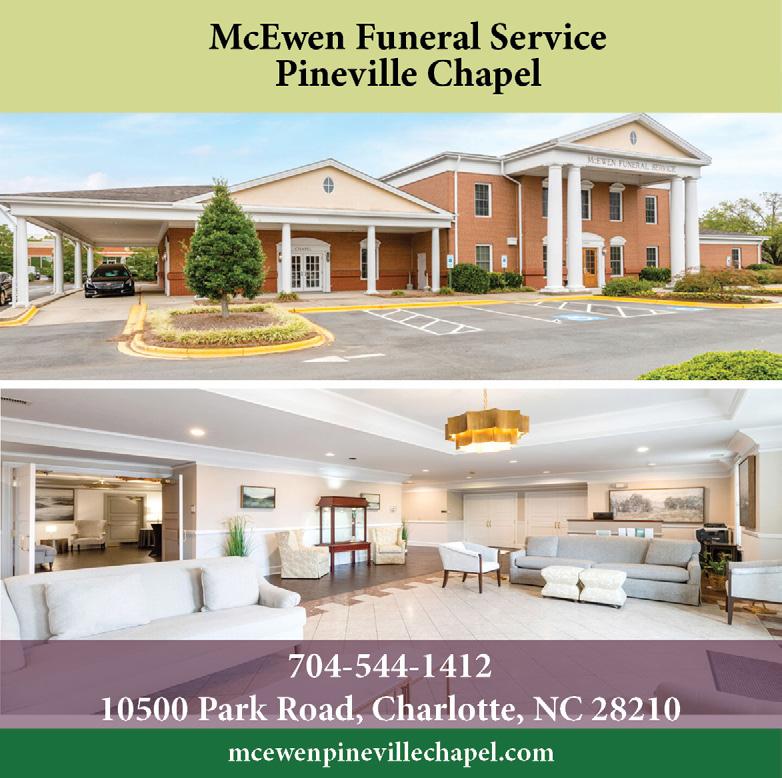
Chabad of Charlotte is excited to announce that the popular Friday night Shabbatons at Chabad will be making a grand comeback after a long COVID hiatus. The first reintroduced Shabbaton will be held on Friday July 15, 7:30 p.m. at the Epstein family Chabad Center on Sardis Road.
The Chabad Shabbaton is set in a joyous atmosphere with a sense of community and camaraderie. The Shabbaton will feature delicious, refined Shabbat food prepared by Kosher Charlotte and an array of fantastic kosher wines from Israel and Europe. Exciting Jewish Shabbat ac-
tivities will engage participants of all ages. Get ready for a round of joyous Shabbat songs and of storytelling.
The time of year for this calendar is conducive for a great Shabbaton, as this Shabbat is the beginning of the three weeks when we memorialize Jerusalem and the Holy Temple. Shabbat is a day of joy and delight, a time our longing for the ultimate re-
demption is expressed with joy and hope.

The event will begin with a Shabbat candle lighting ceremony followed by a lively Shabbat service. The cost to attend is $25 per person. Please visit our website at chabadnc.org or call our office at (704) 366-3984 to register for this Shabbaton.
By Leah LevinBallantyne Jewish Center invites you and your family to join us to hear the Ten Commandments read from the Torah and enjoy a delicious meal in honor of the holiday of Shavuot. Shavuot is the time we commemorate G-d’s giving of the Torah at Mt. Sinai and is when we celebrate the true heroes of this holiday — the children. Before G-d gave the Torah, He demanded guarantors. The Jewish people made several suggestions, all rejected by G-d until they declared, “Our children will be our guarantors that we will cherish and observe the Torah.” G d immediately accepted them and agreed to give the Torah.
Let us make sure to bring all our “guarantors” along on the first day of Shavuot to be pres ent for the reading of the Ten Commandments. There will be a special program, fun activi ties, and treats for everyone to enjoy.
Sunday, June 5 5-6:30 p.m.
At the South Charlotte Banquet Center, 9009 Bryant Farms Rd.
Open to all, free of charge. RSVP is appreciated. Email Leah@JewishBallantyne.com or call/text (704) 408-1116 There will be a minyan and Yizkor service the following morning
Monday, June 6
At the Ballantyne Jewish Center, 8632 Bryant Farms Rd. 10 a.m. service begins 11:30 a.m. Yizkor
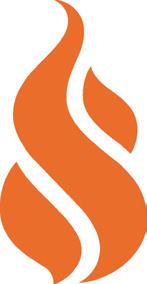

Followed by a Kiddush lunch For more information visit us online www.JewishBallantyne. com
Hebrew School of the Arts Registration for the 2022-2023 School Year is now open.
Call (704) 408-1116, email Leah@JewishBallantyne.com, or visit www.JewishBallantyne. com/HebrewSchool

Jews and Judaism have always valued music. Instruments and song were a central part of the Temple service in ancient Israel. In the book of Exodus, we find the Song of the Sea, a poetic tribute to Israel’s miraculous deliverance from the pursuing Egyptians with each Moses and Miriam leading their own version.
The first reference to a “hazzan” as a musical prayer leader appeared around the sixth century. However, the modern cantorate didn’t emerge until the 1700s. This was an era when efforts to create a more modern synagogue service led to the emulation of many features of Christian worship, including the development of a canon of liturgical melodies grounded in Western musical theory and rules of harmony. Some early cantors even began to model themselves after their Christian colleagues, including borrowing the name “cantor,” which had been used to describe the individual who led music in
the church. One of these cantors was Salomon Sulzer who, in the early 1800s, composed a melody for the Shema that is commonly used in present day.
Song leaders have been leading kids in song at Jewish summer camps since their inception at the turn of the twentieth century. However, until the 1970s, few, if any, of these songs were used in religious services. However, this began to change with the emergence of Debbie Friedman, who passed away in 2011 at the age of 59. Debbie’s music bridged the old world and the new, bringing the ancient liturgy alive for those who could not always connect to traditional cantorial music.
Now, Debbie’s music is a staple in many synagogues, especially her Mi Shebeirach, which has become one of the most shared melodies in synagogues around the world. Yet it wasn’t always this way. Despite the popularity of her music, Friedman was an outsider in the Jewish musical establishment for most
of her life. Not only did Friedman have no cantorial training, but she also never finished college. And she long faced resistance from cantors, rabbis, and others who considered her music inappropriate in synagogue.
Today, in most synagogues, newer Jewish music is interspersed among the traditional prayers and readings. And the role of music continues to
evolve. Instead of one or two people playing acoustic guitars and leading a few songs during services, full bands play nearly all the liturgy and prayers set to modern, relatable music. The music is integral to the experience.
The Ruach is a part of this new direction in Jewish spiritual engagement. Each month, the band offers The Shabbat Experience,

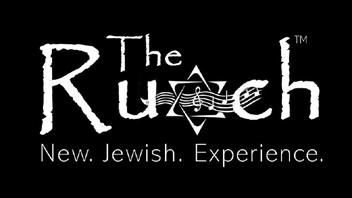
and The High Holy Days Experience each year. These are modern services built on Jewish tradition and include original music by The Ruach as well as other contemporary Jewish artists. Experiences are uplifting, joyful, and relatable. Rabbi Smookler’s messages are concise, meaningful, and always on point.
Because The Ruach Community has no physical building, services are held at various locations around the city. There is never a cost to attend. Support for Experiences is provided solely by donations and a small grant from the Jewish Federation of Greater Charlotte. The Ruach is a 501(c)(3) organization whose mission is to spread the joy of Judaism through new Jewish Experiences.
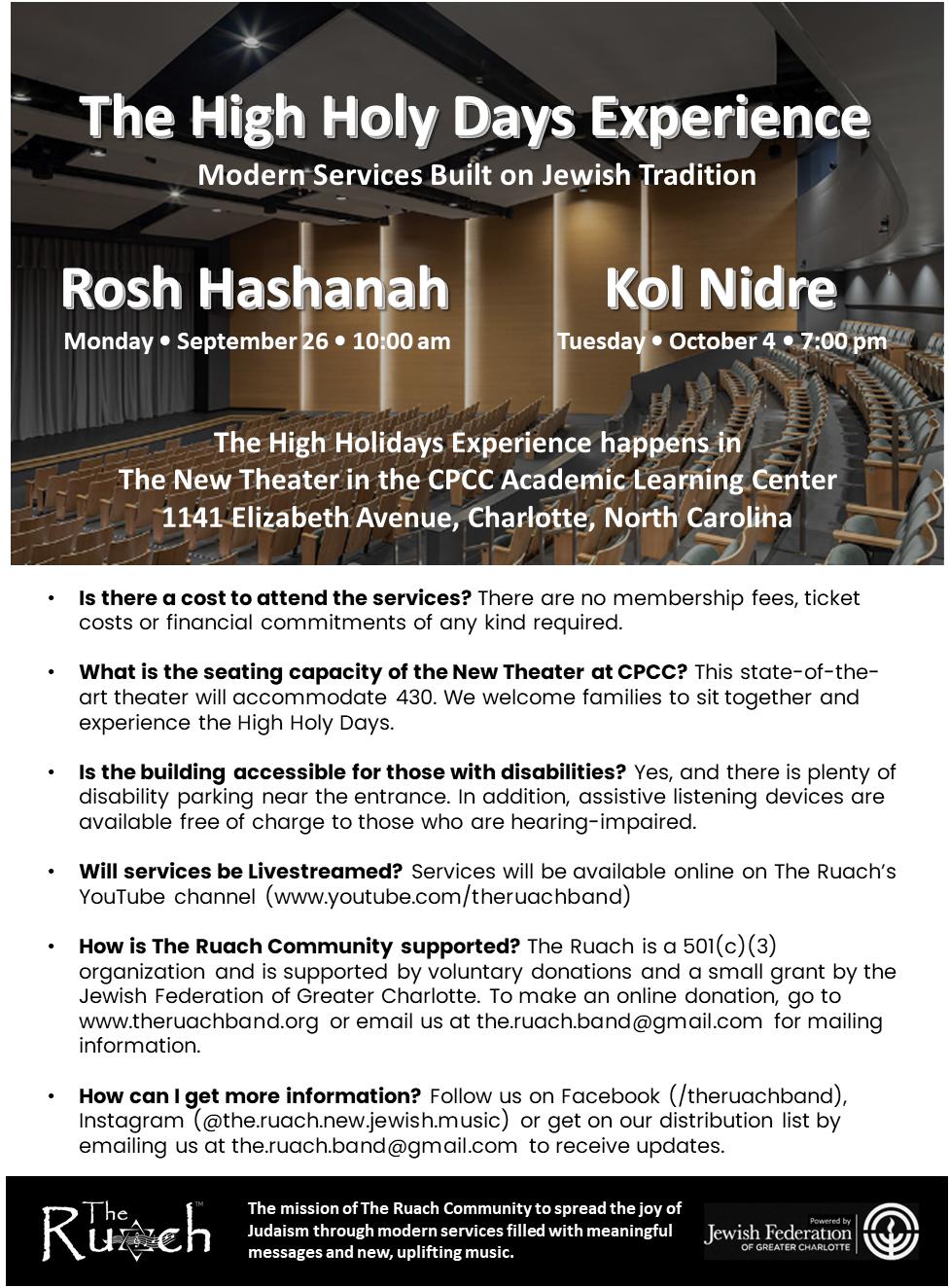
How do you feel about being Jewish? Do you ever think about it? Is being Jewish part of your everyday life? Is it not? Do you hide it? Do you tell everyone you’re Jewish? Do you wear your Jewish star with pride every day? Do you hide it sometimes? Do you take yours off?
What about antisemitism? Do you think it’s a problem? Not a big deal? Do you think it’s a problem but somebody else can deal with it? Do you obsessively follow Jewish activists and organizations on Instagram and Twitter so you can read about antisemitic acts that happen? Is what you see so overwhelming that you just can’t deal with it and don’t want to talk about it? Is antisemitism on your radar?
If you saw or heard something antisemitic at your school, office, on the light rail, or at a neighborhood party, what would you do? Would you do or say anything? Would you stay quiet? Would you stay quiet and later wish you had said something?
On June 10 at 1:30 p.m., Beverly’s Book Nook is hosting a special Zoom event with author Liza Wiemer discussing her multi-award-winning book, “The Assignment.” When a popular high school teacher assigns
a controversial project asking his students to debate the pros and cons of Hitler’s Final Solution, with half the class defending the Nazi point of view, the town erupts in confusion and shock. Two seniors cannot accept their teacher’s contention that the debate is a legitimate educational experience and find the courage to speak up against antisemitism, discrimination, and hatred.
Join us for the book club presentation and discussion about the real-life assignment with the author. RSVP: www.jewishcounciloflakenorman.org/ book-club.
Author Liza Wiemer, a life member of Hadassah, has generously agreed to help support Hadassah through our author book discussion. With a minimum donation of $18, you will receive a signed bookplate, with additional swag for higher donations. Send your check and mailing address to Hadassah, Attn: Cheri Titlebaum, 5007 Providence Road, Charlotte, NC 28226 (write Beverly’s Book Nook in the memo) or donate by credit card at Hadassah’s website.
Beverly’s Book Nook will also meet on July 8 and August 12. Details at the Hadassah website.
Buzz Buzz
I know it’s June, and I’m certainly not wishing our summer away, but 5783 is right around the corner. Want a great way to wish your friends and family a sweet New Year? Send honey for Rosh Hashanah. Each 8 oz. jar of kosher honey is $14, including shipping if you order by August 1. Order by September 1 for guaranteed delivery by Rosh Hashanah. The personalized card tells recipients that a donation has been made in their honor to the Hadassah Charlotte Metro Chapter. Order at www. orthoney.com/HCM
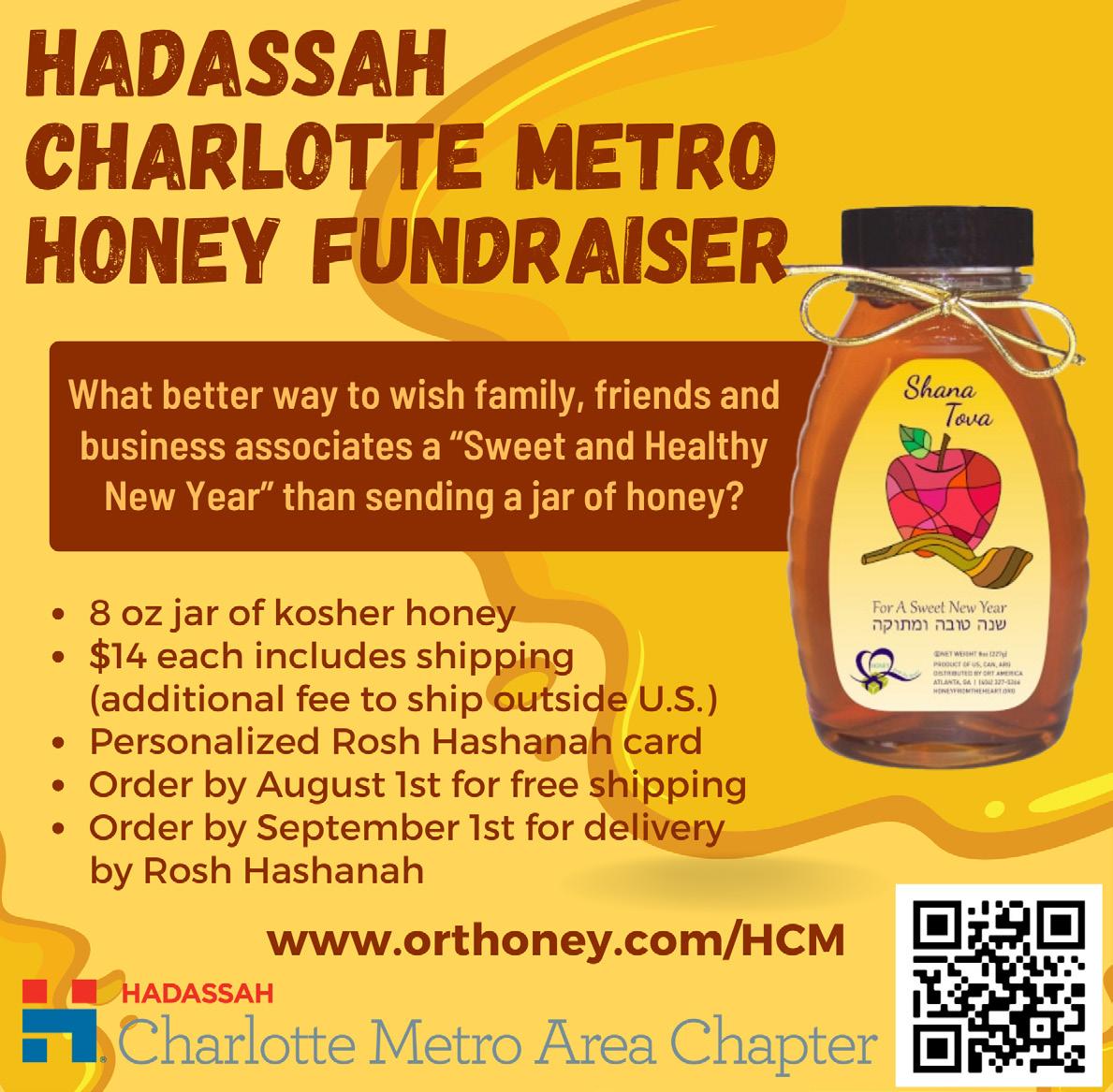
About fifteen women spent
midday Sunday, April 24 lunching and laughing at Optimist Hall. They ate and schmoozed outside in the sunshine at Hadassah Membership’s post-Passover Munch & Mingle event. It was a great chance to meet new and old friends.
Enjoy a night out at Wine & Schmooze at Vintner Wine Market in the Arboretum Shopping Center. Join us on June 7, July 5, August 2, and the first Tuesday of every month at 7 p.m. Whether you are a long time, new, or potential member, stop by for a casual evening.
Come to BookTalk on Tuesday, June 28 at 7 p.m. June’s book is “Henna House” by Nomi Eve. The novel is about a young woman living in the fascinating and rarely portrayed community of Yemenite Jews of the mid-twentieth century.
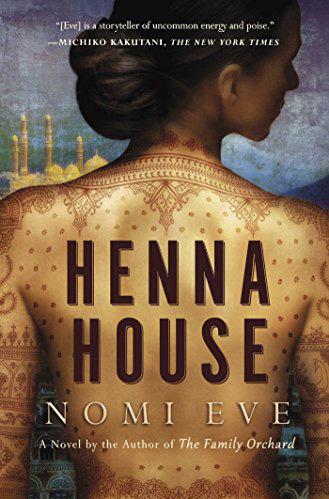
On July 26, our book is “Last Summer at the Golden Hotel” by Elyssa Friedland. It’s a “beach read” about a family reunion when two clans convene for the summer at their beloved getaway in the Catskills.
The Short Stories Discussion Group will discuss their summer meetings at the June 17 session. The group meets monthly on the third Friday at 11:45 a.m.
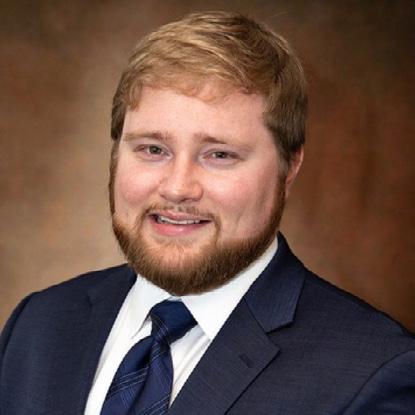
Want to Know More?
Interested in joining Hadassah or learning more? Contact Anik Harrison at the phone or email below and come to one of our events.
Summer Hadassah Charlotte Metro Board meetings are on June 20, July 18, August 15 at 7:00 p.m. Check website for location.

Our website, www.hadassahcltevents.org, has details about our events. If you have questions or need a Zoom link, email HadassahCLT@gmail.com or call our general phone number, (980) 553-1880. Your message will be forwarded to the correct person.
Follow us on social media at Facebook (Hadassah CLT Metro), Instagram (Hadassah Charlotte Metro) and Twitter (@HadassahCLT).
Do you like ice cream? Who doesn’t like ice cream? Everybody likes ice cream when the weather is warm, so join W.O.W. on Tuesday, May 31 at 7 p.m. for an ice cream social in honor of Shavuot, when we traditionally enjoy dairy products. See the W.O.W. website (shown at the bottom of this article) for location, more information, and registration.




Beginning with the second night of Passover, Jews throughout the world count the days and weeks until Shavuot. We count to 49, representing the seven weeks from when we left Egypt until we reached Mount Sinai to receive the Torah. Interestingly, it’s the only Jewish holiday without specific mitzvot associated with it. So how can we celebrate the joyous chag (holiday)? We have many rituals and customs that make it special. First, synagogues and homes are decorated with flowers and green floral designs. This custom comes from Midrash, which tells us that the bottom of Mount Sinai, where our people stood waiting for Moses to return, was adorned with greens and sweet-smelling flowers.
Another Shavuot custom is to eat dairy meals. Every Shabbat or holiday meal in my parents’ house was made with meat or chicken and was more special and delicious than meals we had on weekdays, not that weekday meals weren’t delicious. It was just so different on Shavuot to light the holiday candles, say Kiddush and Motzi, and then enjoy our festive meal of cheese blintzes! So what’s the deal with the dairy meals?
The custom of eating dairy on Shavuot has a few different origins. First, the Torah is compared to “honey and milk under your tongue,” so dairy products symbolize that wonderous time of receiving our Torah at Sinai. Next, in the Torah, the land of Israel is described as “a land that flows with milk and honey.” Dairy foods are a reminder of the Torah and of the Jewish people’s homeland, the Land of Israel. Another explanation for the tradition of eating dairy comes from the gematria (numerical value) of chalav (milk in Hebrew). The numerical value of chalav equals 40. Moses spent 40 days on Mount Sinai, then an additional 40 days after the golden calf debacle praying for forgiveness, and then another 40 days before he returned to the Jewish people with new tablets. But wait, there’s more about 40. There were 40 generations between Moses who recorded
the written Torah and the generation of Rav Ashi and Ravina, who wrote the final version of the Talmud, the Oral Torah. In addition, the Talmud begins and ends with the letter mem, which has a numerical value of 40. Whew!
The most practical reason for the tradition of eating dairy on Shavuot is that the Jewish people could not eat meat products immediately. They needed time to prepare the meat in accordance with the just-received dietary and animal slaughter laws. There are symbolic, numeric, and pragmatic reasons for eating dairy on Shavuot — I’m in!
I’m going to steer you to Trader Joe’s or a florist for your flowers and greenery for Shavuot. However, I’ve got you covered for cheese blintzes (Kosher Mart and Trader Joe’s have OU-D (kosher dairy) cheese blintzes if you’d like to buy them) if you’d like to try making them. I’m not a great cook, having been scarred for life after failing home economics in 7th grade, but even I can make these!
Have a wonderful, beautifully green and delicious Shavuot!
Please visit our website at www.CharlotteWomenofWisdom.com to register for our ice cream social and follow us on Facebook at W.O.W. Inspiring, Empowering and Connecting Jewish Women. We are a nondenominational group for Jewish women to engage, learn, and connect. No synagogue affiliation is necessary, just an interest to learn more about our beautiful heritage!
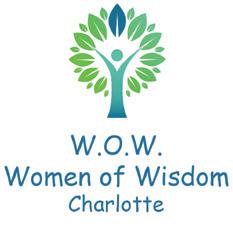
FILLING: 16 oz cottage cheese
egg yolks
Tbsp flour

Tbsp sugar 1 tsp vanilla Place filling on bottom third of crepe. Roll up bottom half over cheese mixture. Fold side over toward center and roll up. Enjoy warm. Sometimes I place blintzes in 350 degree oven for a few minutes to warm up.
(From Aish.com)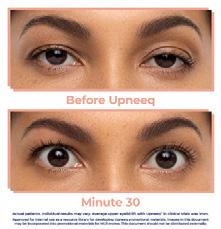







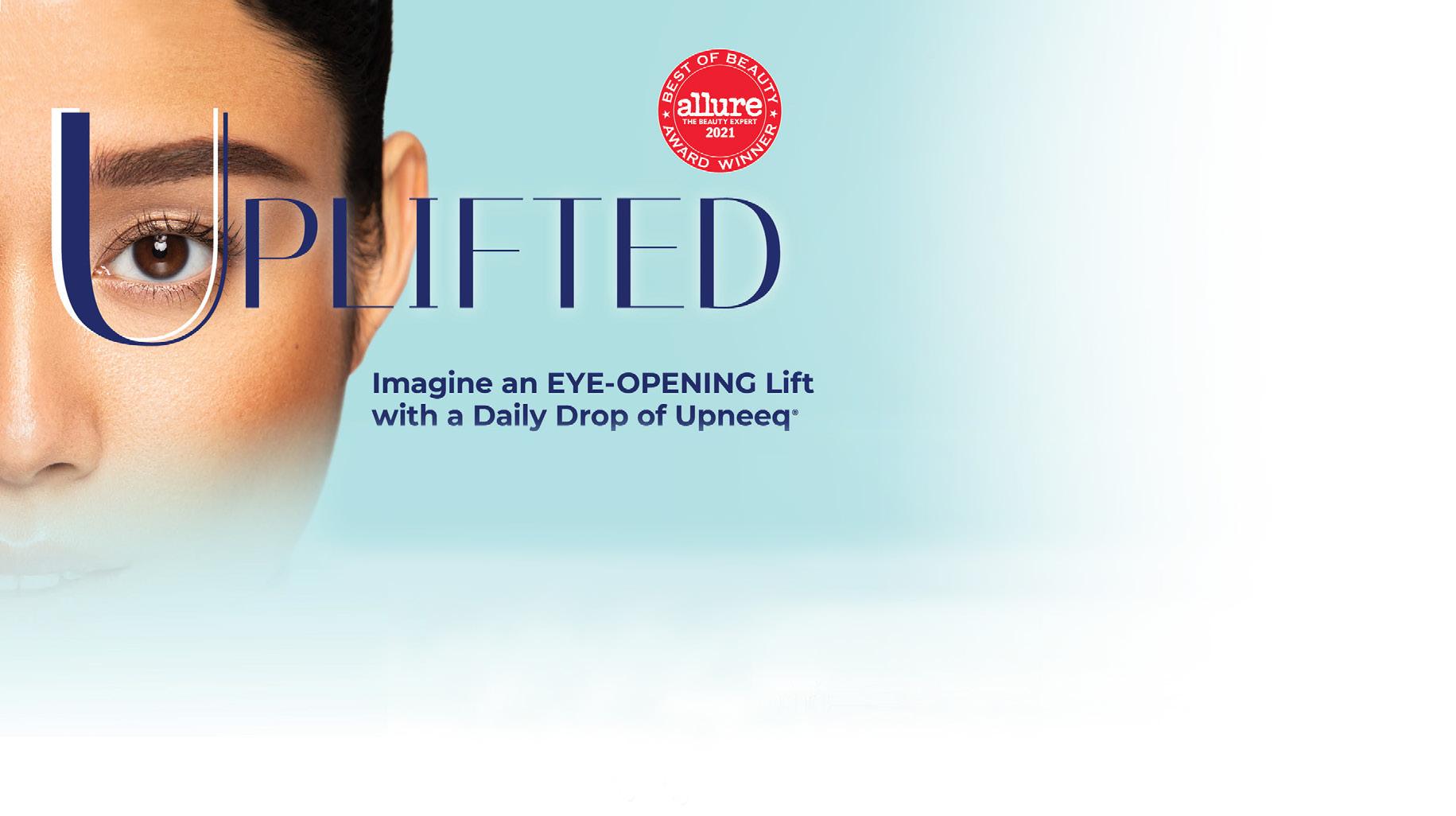
Lynn Edelstein received all-too-familiar phone calls last week from area children’s hospitals. They needed more than 150 blankets for their patients, and Lynn and Yours Truly Needlepoint are the source for these knitted and crocheted blankets.
Lynn called all her contacts and was almost able to fill the order. To date, the many volunteers from around the U.S. and the world have knitted and crocheted more than 15,000 blankets for children at the Levine Children’s Hospital, Hemby Children’s Hospital, and Shriner’s Children’s Hospital (Greenville, SC), and the calls come almost every week for more. With such demand, Lynn and Yours Truly Needlepoint still need more knitters to help perform this mitzvah.
In the early 1970s, the Hebrew Academy needed money for scholarships, and Lynn’s husband, Sam (z’l), asked Lynn what they could do to raise money. Yours Truly Needlepoint was born with the primary purpose of giving all proceeds to the school. This “in-home” shop, with wonderful yarns and needlepoint canvases, has been open at Lynn’s home every Thursday from September through May ever since.
Yours Truly Needlepoint supported scholarship needs until the Hebrew Academy closed. Since then, all proceeds have been given to local Jewish and non-Jewish nonprofits in our community.

The Sam Lerner Cultural Arts Center at Shalom Park, named in memory of Lynn’s husband, was one of the biggest projects YTN has supported.
Thirteen years ago, just before the Levine Children’s Hospital opened, Lynn’s daughter, Julie Lerner Levine, wanted Lynn to see the hospital. Lynn went with her grandchildren for the tour and visited every floor of the new facility. As she was leaving, Lynn said she had two wishes, namely, to never return to the hospital and to do something for every child who had to be there.
As Lynn told her friends and customers about this wish, volunteers began sending blankets. Friends in Myrtle Beach have knitted more than 1,000 blankets; several Charlotte women have knitted or crocheted more than 600 blankets each. One knitter, Mabel Condor, who is blind, has knitted more than 100 blankets. As the wonderful volunteers tell their friends, more blankets arrive.
Letters and notes of gratitude arrive frequently, saying, “Thank
you so much for the beautiful blanket that was given to my daughter at Levine Children’s Hospital. It means so much to know that others are thinking of us during this time,” and “The patients and families that receive these blankets are astounded that someone put so much time and compassion into a gift just for them.” One mother wrote, “Thank you so incredibly much for the beautiful knitted blanket for Eleanor! It is clear that so much love was knitted into each stitch, and it is a blanket we know
she will treasure,” and the mother of a 4-month-old wrote, “Our son just had heart surgery last week. One of the nurses covered him with your healing blanket while he slept. This brought comfort to us all. Thank you for sharing your gift with our family.”
More than 20 years ago, one of Lynn’s friends, an oncologist’s wife, told her that cancer patients getting chemotherapy treatments need hats. Lynn spread the word, and volunteers began making hats too. Today more than 10,000 “chemo hats” have been deliv-
ered to infusion centers around Charlotte. As one recipient put it, “I had ordered and returned six wigs and lids and resorted to a lycra beenie. Now I’m a Yours Truly Needlepoint model. A special thank-you to all of you who brought me, in particular, such joy.”
Years ago Lynn heard Dennis Prager say, “Don’t give ’til it hurts, give ’til it feels good,” and this has been her motto. Lynn and Judy Marco, Lynn’s invaluable partner in YTN for the past 14 years, give their time to knit at the Levine Jewish Community Center (LJCC) on Wednesday mornings and open Yours Truly Needlepoint every Thursday in Lynn’s home.
If you knit or crochet, Lynn and Judy could use your help. Visit Lynn and Judy on Wednesdays from 8 to 11 a.m. in the LJCC lobby or on Thursdays from 9 a.m. to 5 p.m. at Lynn’s home, 3802 Columbine Circle, or give Lynn a call at (704) 3666765. Yours Truly Needlepoint has a wonderful selection of yarns and could use your help fulfilling the needs for children who are hospitalized and cancer patients who rely on blankets and chemo hats to keep them warm.
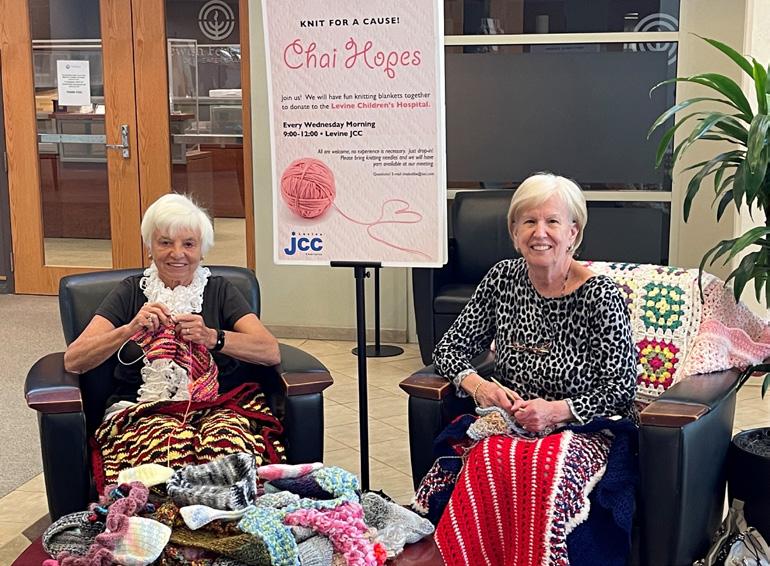
Dodge or duck
Idina’s role in “Frozen”
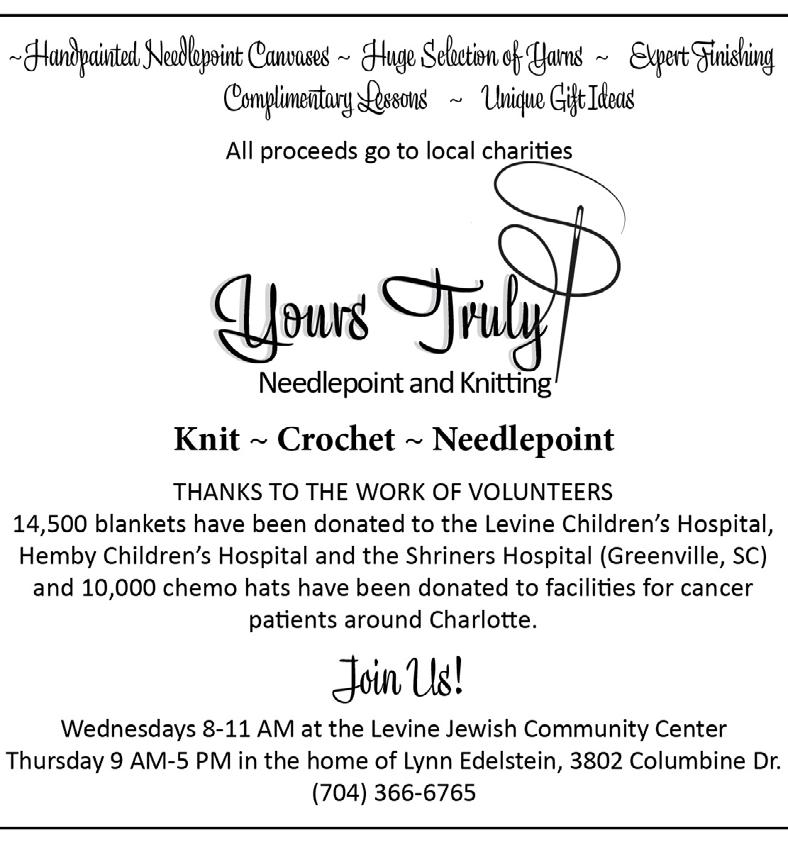
2002 Idan Raichel hit
Yaakov vs. Laban, e.g.
“Golden Fleece” ship
Kind of tree
Belonging to us
#1 overall pick in the 2018 NBA Draft Deandre
What 34-Across effectively said when trading his birthright 28. Baruch follower
Jar top
Shemer of note
Beverage brand named for the fruit it contains 34. See 23-Across
What Ephron said to Abraham when offered 400 Shekels for his land?
Lashon or Yetzer
“Hee ___”
Loosen bonds
Raptors, on scoreboards
Pasadena bowl game
Elisha to Elijah
Like many a Tishrei challah
Blood typing abbr.
“___ scale from...”
Italian coin
Eliab, to Jesse’s other sons 63. These may be martial 64. Stereotypical JNF purchase 65. Many bat mitzvahs have one 66. Jewish top that’s not a dreidle?
Attitude 68. Epic work by Rabbi Shneur Zalman of Liadi
By Roy WeinbergerEighteen months ago, the life I had known ended. Though my fantastic wife of more than 50 years suffered from Parkinson’s for a long while, her sudden passing was still completely unexpected. Fortunately, I had, and have, wonderful family and friend support. However, relatively quickly it hit me that virtually everyone with whom I had more than an incidental relationship was a couple. And while we could still have a connection, the dynamic had somehow changed. When some activity was being planned by one or another of my circles, I was no longer first on its mind. I felt I had to keep giving reminders that I wanted to be included. I recognized this was happening, but didn’t have an idea of what to do about it.
As the months passed, as the fear of COVID slowly eased, and as the weather improved, I ventured out to hike, kayak, and golf. It was during a group hike that I first heard about Meetup groups. Meetup.com is an app that allows individuals, groups, or organizations to set up affinity groups and interact with individuals sharing similar interests, whether physical, social, or educational. In the Charlotte area alone, hundreds of such groups are using the Meetup.com platform. Initially I focused on active outdoor activities, but after a while I thought I might explore some social groups. Among my
searches were the terms “Jewish” and “Jewish singles.” Some such groups popped up that were located in the Northeast and in Florida, but in the Charlotte area, the only hit was for a young couples’ group, and it hadn’t been active for a few years.

While I value my Jewish heritage and enjoy its traditions, I’m not an especially religious person. So I felt comfortable joining a singles social group with a di-
verse membership. After seeing how it operated and coming to appreciate the valuable service it provides to singles who want to socialize, form friendships, and join together for fun activities and events, the idea of a Jewish-focused meetup group began to germinate. With the support and help of a friend, Robin Spivock, Jewish Social Singles of the Carolinas was launched. Its focus is on singles ages 45 Across 1. Geller of note 6. Some TV’s and VCR’s 10. NCAA part: Abbr.
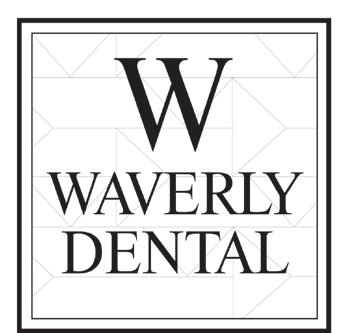
 By Amy Lefkof
By Amy Lefkof
On April 26, North Carolina Supreme Court Justice Anita Earls presented the prestigious Order of the Long Leaf Pine Award to Kenneth Schorr at his Charlotte Center for Legal Advocacy (“The Advocacy Center”) retirement celebration for exemplary service to the state. This followed on the heels of the Lifetime Achievement Award from the North Carolina Justice Center in 2020, recognizing Schorr “for his decades of leadership in legal services, as he tirelessly defended the interests of underrepresented North Carolinians.”
After receiving his bachelor’s degree from Brandeis University, and his J.D. from the University of Michigan Law School, Schorr set out in the mid-1970s to see the country. What he viewed led him to become a poverty lawyer, mostly in the Deep South, advocating for the underprivileged his entire legal career. Schorr served as litigation director/acting executive director of Community Le-
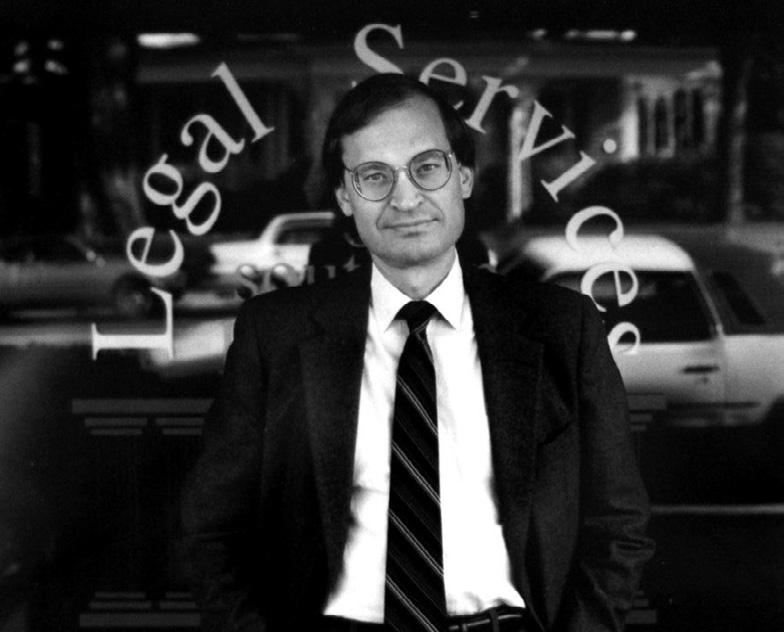
gal Services in Phoenix, Arizona, from 1979 to 1983, as executive director of Legal Services of North Texas in Dallas, Texas, from 1983 to 1987, and as executive director of The Advocacy Center, formerly known as Legal Services of Southern Piedmont (LSSP), from1988 until his retirement. He was previously in private practice in Little Rock, Arkansas, representing community organizations, labor unions, and individual employees in labor and civil rights cases.
To support the clients and community served by The Advocacy Center in the Charlotte area and west-central North Carolina, Schorr recruited and supported lawyers and other staff to be experts in their areas of legal practice: family support and health care, immigrant justice,
consumer protection and employment law, public benefits, low-income tax clinic, elder law, veterans’ benefits, and housing. Schorr reflects on this breadth of work undertaken by The Advocacy Center, saying, “Most nonprofits are organized around a problem, or a client group, but this notion that we do housing and health care and immigration and tax and all these different things for all these different groups of people and we do individual work and systemic advocacy — is kind of amazing in scope.”
Although clients might present one problem, Schorr explains his organization’s holistic approach: “Over the last three decades, the security of most American families has deteriorated, so one big setback, such as a serious illness that interrupts employment or the deportation of a wage-earning member of the family, causes things to fall apart in big pieces. So helping people put it back together requires looking more broadly at them.”
Noting that access to legal services “is only a part” of justice for all, Schorr steered his organization’s anti-poverty mission, “To change systems adversely affecting all low-income people. It is a part of how we will end poverty, and racism, for everyone in our community.” One example is the state of North Carolina’s refusal to expand Medicaid, leaving hundreds of thousands of people without health insurance.
In 2002, The Advocacy Center’s precursor LSSP split into two collaborative entities (Legal Aid of NC Charlotte and LSSP) in response to congressional funding cuts and restrictions placed on Legal Services Corporation-funded organizations. Although this reorganization allowed LSSP to continue to
do systemic advocacy and represent disfavored groups, such as incarcerated individuals and immigrants who are not yet citizens, it left Schorr’s organization without funding from Legal Services Corporation.
Without a single core funding stream, Schorr’s organization has had to rely primarily on its annual Access to Justice campaign (supported generously by more than 1,000 members of the local bar) and cobbling together grants. Thus, in 2014, when Schorr’s retirement was on the not-too-distant horizon, he resolved to have a long-term sustainability plan in place. That plan yielded rebranding as Charlotte Center for Legal Advocacy, a donor and political support base that is broader than the licensed bar, a successful Building Justice capital campaign that has nearly reached its $6 million goal, and newly renovated office space at 5535 Albemarle Road.
Schorr, an active member of Temple Beth El, along with his wife, Dr. Jane Marcus, is deeply touched by the great support of many members of the Jewish community, especially capital campaign co-chair Alan Kronovet.
The roots of Schorr’s lifelong commitment to the war against poverty can be traced to his parents. His father, Alvin Schorr, who was dean of NYU’s School of Social Work, held important positions in several federal government agencies where he conducted analyses of poverty and
how to best allocate government funds in the war against poverty. His mother, Ann Girson Schorr, who didn’t arrive in the U.S. until she was 21, wrote, “Finding a Place in the World,” her memoir of growing up impoverished in Argentina as a Polish Jewish refugee, denied entrance into the U.S., which had shut its doors to Eastern European refugees.
For all his awards and legal achievements, Schorr is best known for his humility. His resume lists various jobs he held from 1968 to 1975, including portrait and news photographer, taxicab driver, summer camp counselor, vacuum cleaner sales, government clerk, and academic researcher and writer — the resume of a man who knows that there is dignity in all labor and that many hardworking people in need of legal assistance cannot afford private lawyers. They need an organization like The Advocacy Center, whose tagline is “Justice lives here.” They need a champion like Kenneth Schorr, who has been in their corner for decades.
To learn more about Charlotte Center for Legal Advocacy or to make a donation to honor Ken’s leadership and legacy, please charlottelegaladvocacy.org or checks can be mailed to Maria Byers at Charlotte Center for Legal Advocacy at P.O. Box 25558, Charlotte, NC 28229

(Continued from page 25)
and over. We have held our first event, an evening of music and good conversation at the Anne Springs Close Greenway in Fort Mill and are busy planning our future outings. Our goal is to host at least one event per month. We look forward to welcoming to the group anyone who is born Jewish, has converted, or has some reasonable connection to Judaism. It is worth emphasizing that the primary goal of the group is to have fun through shared activities. Likely outings, besides those already mentioned, will include dinners/lunches, art gallery crawls, museums, theater/opera, bowling, TopGolf, day trips, kayaking, movies, and more. In addition to these activities, we might include Jewish celebrations, such as Passover, Purim and Hannukah, if interest
exists. There is no charge to join Meetup.com nor to then sign up for Jewish Social Singles of the Carolinas. Of course, if we host events that charge an admission or participation fee, attendees will be individually responsible for those. Becoming a member of Jewish Social Singles is easy, and there is absolutely nothing to lose. We hope you will take the first step and join us on this journey.
To join Jewish Social Singles of the Carolinas, go to Meetup. com or install the Meetup app on your phone. Search for Jewish Social Singles of the Carolinas and request to join the group. Your request will be quickly accepted, and you will be on your way to new adventures with new friends.
As we write this article, the 2021-2022 school year is coming to a close. We are always thankful when we reach the end of the school year because we can often reflect on the academic and emotional growth we see in all students and share in their accomplishments and mastery of many challenges. The end of this year has been different though. We’re reflecting on the challenges that our parents, students, and teachers had to face over the last two years and the fact that we have overcome, even though

there are times, we all weren’t sure we would.
We are also so excited that after a long two years we were finally able to resume our overnight field trips. The level of excitement from our students has been beyond what we have ever seen. We could see it as they drank up the travel and overnight experience and relished each moment. In fact, the kids themselves expressed how grateful they are that they are finally going on the trips they only dreamed about in the younger grades. They also
expressed sadness about the trips they missed during the past two years.
Similarly, we recently had our first school-wide family event since 2019. Our Charlotte Jewish Day School family is one which we nurture and enjoy. We partner with our parents to teach and guide the children academically, socially, and spiritually. We have missed the many celebrations and get-togethers where we are able to get to know each other. Many of our families don’t know each other at all, as our enrollment has increased by 40% since the beginning of the COVID pandemic. The students who were in kindergarten for six months before schools discontinued in-person learning are now finishing their second-grade year. Their parents may not have really been inside the school. So last week, more than 200 people came out for our first family dinner. We watched parents and children engage on the playground, in the cafeteria, and in our outside tents. There were no phones or screens, just people talking and laughing and children of all ages playing. It is our hope that we will begin our
2022-2023 school year with the same welcoming and open spirit, energized with the growth of our student body and the number of new families calling Charlotte Jewish Day School home.
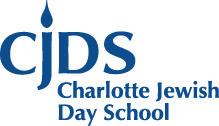
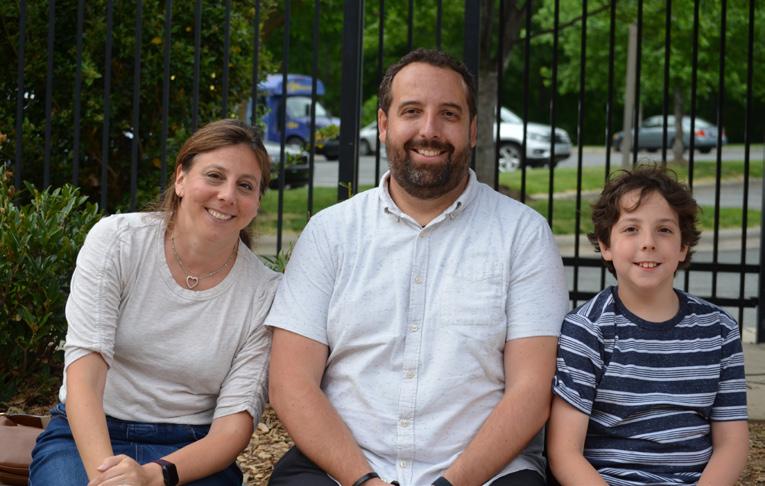
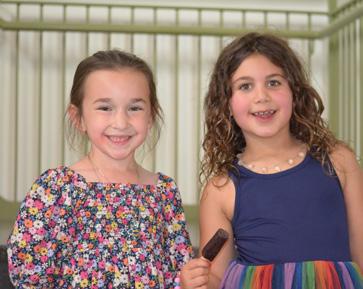
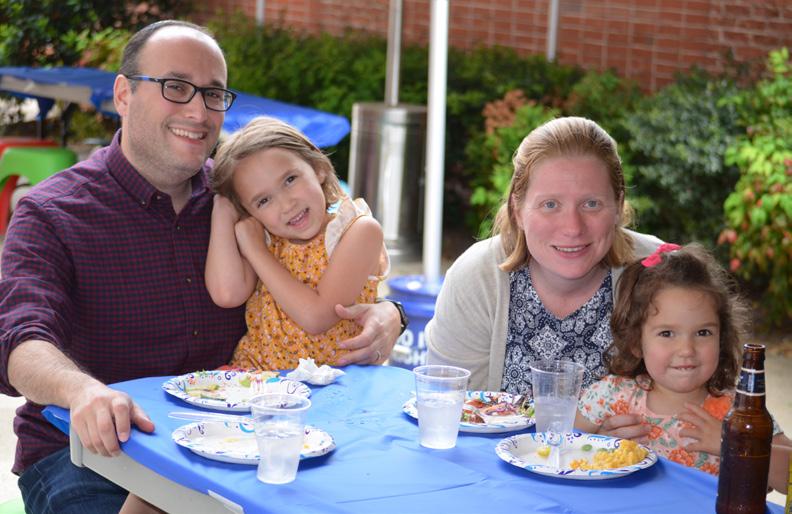
share that we have succeeded in accomplishing these goals.
Hebrew High continued to meet on Wednesday nights and started the evening with dinner. Our students had 30 minutes to eat and socialize with their friends. At the end of dinner, we all sang the Birkat HaMazon (the blessing said after a meal), and there was an opportunity for teens who are in NFTY, USY, BBYO and other youth groups to make announcements of upcoming programs.
By Megan HarkavayWhat a year it has been! After being virtual during the 2020-2021 school year, we were thrilled to be back to in-person learning. When planning for this past year, we created goals
to add more social time for our students, be more accessible to all families, create community, deepen relationships with clergy, and continue to create positive Jewish moments. As the year comes to an end, I am thrilled to

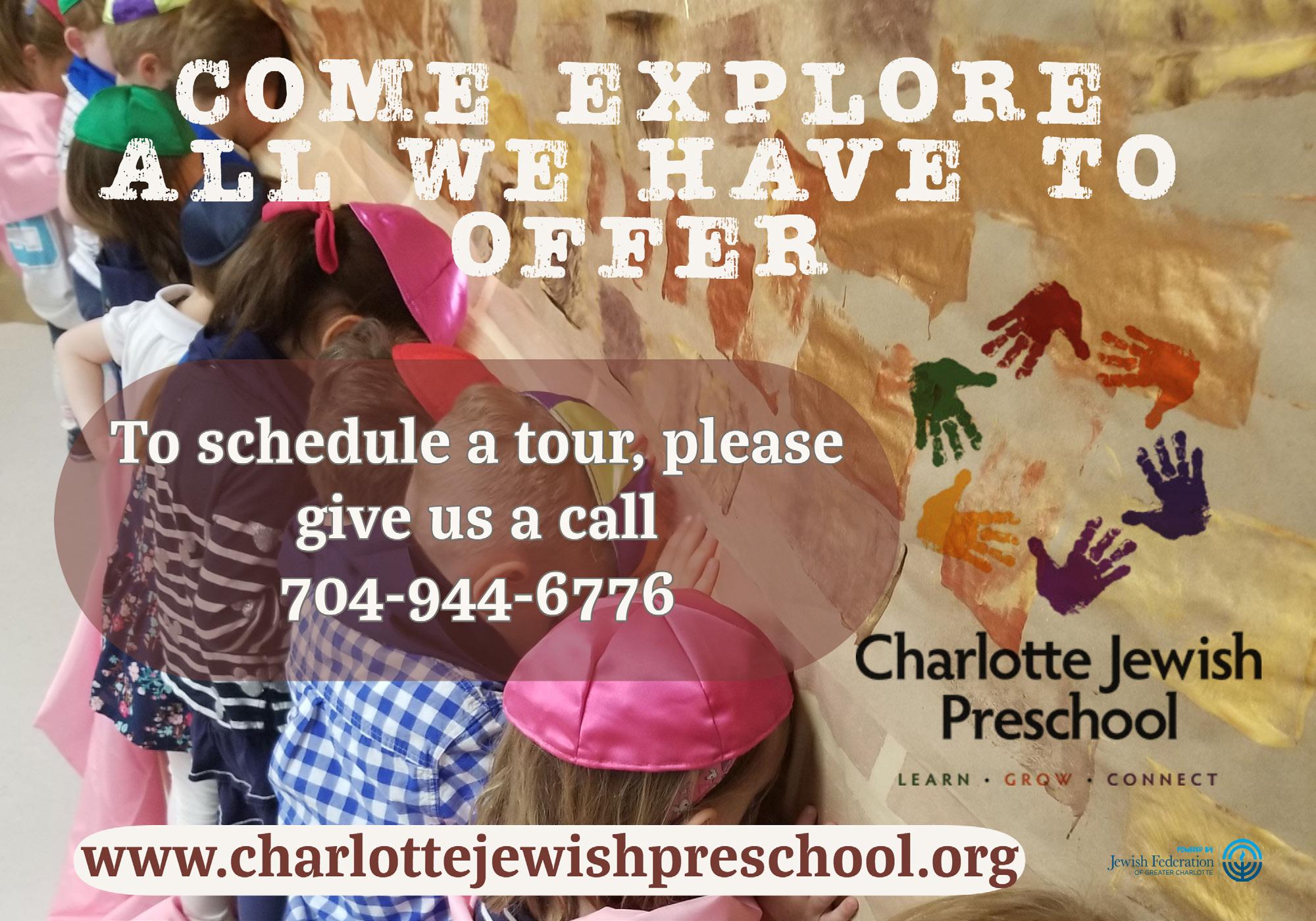
Classes took place from 7:30 p.m. to 8:30 p.m., with Hebrew High ending earlier than previous years. This allowed teens to come home earlier in the evening to finish up homework or spend time with family. When registration began, students were able to view all class offerings for the year. Families could sign up for just one, two, or all three trimesters. We hoped that this change would allow teens who have seasonal commitments to join us for part of the year. We were so grateful to have the clergy from Temple Beth El and Temple Israel teach a class during one of the trimesters. Wednesday nights don’t al -
ways work for our families, so we added a gender-specific program for 8th and 9th graders monthly on Sunday nights. We used the Moving Traditions’ curriculum and facilitated their Rosh Chodesh (girls) and Shevet (boys) program. Rosh Chodesh uses Jewish teachings and practices to give girls a place to feel safe, articulate their deepest
concerns, consider the effects of gender on their daily lives, have fun, and be “real” with their peers. Through discussion, arts and crafts, creative ritual, games and drama, the girls and their leaders drew on Jewish values to explore issues the girls care about most, such as body image, friendship, relationships, family, competition, and stress. In Shevet, the boys played various competitive and collaborative games, talked about pop culture, studied great Jewish texts, ate, and shared stories. They also had an opportunity to discuss, in a confidential setting, critical issues in their lives as teens and as young men. At our final Rosh Hodesh session, all of the girls expressed that they wished the group met twice a month and not just once a month!
During the 2021-2022 school year, we had five special events. Two of these events celebrated Chanukah and Purim together as one community. During our Chanukah party, teens put together “blessing bags,” small bags filled with winter essential items to keep in the car to give
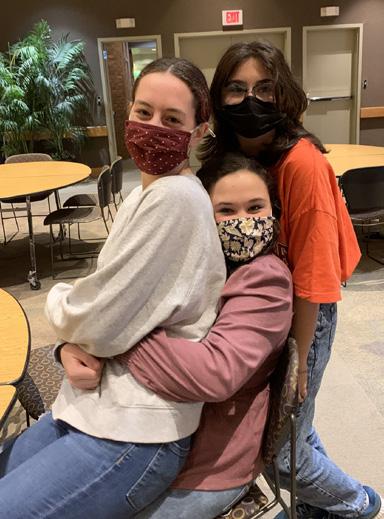
The Moishe House community in Charlotte is growing. Moishe Pod North Charlotte opened its doors on May 1, 2022, near the university area and will be led by residents Melanie Mason and Tyler Hutchinson and their 14-year-old Rhodesian Ridgeback, Rudy. With the closure of Moishe House Charlotte in spring of 2022, the new Moishe Pod offers additional options for young Jewish adults to build community in the metropolitan area.
The couple actively participated in Charlotte’s Moishe House community and began running their own programs within the Jewish community during the pandemic. Hutchinson, who hails from Virginia, is a graphic designer for Autobell Car Wash. He earned a bachelor’s degree in fine arts from Radford University and first became involved in the Jewish community through Moishe House in 2017, after his move to Charlotte. Mason, however, has called Charlotte home for more than 16 years and hails
Education and Youth (Continued from page 28)
out to the homeless. They also built menorahs and dreidels out of LEGOS! The theme of our Purim celebration was Jewish identity. After a discussion on their personal Jewish identity and how they demonstrate pride in their Judaism, the teens were given two wooden triangles (that could also represent a hamantaschen since it was Purim) and were asked to write or draw something that speaks to their personal Judaism. We now have a beautiful Jewish identity Jewish star that will hang in the hallway at Hebrew High.
The teens attended the Jewish Federation Book Festival to hear Liza Wiemer talk about her book “The Assignment.” The teens all received a copy of the book ahead of time and got the opportunity to meet Ms. Wiemer and got her to sign their book!
Our final two programs of the year were to commemorate Yom HaShoah with a program led by Lori Semel from the Levine JCC’s Butterfly Project and a Yom Ha’azmaut celebration!
The teens loved having the second annual Hebrew High Maccabiah games as we end the year.
Melanie Mason and Tyler Hutchinson and their 14-year-old Rhodesian Ridgeback, Rudy.

from New Jersey. She is a corporate meeting and event planner for a Fortune 500 company and earned an undergraduate degree from Johnson and Wales University and a master’s degree from Purdue University. She currently teaches culinary arts to students at Hebrew High every Wednesday night and volunteers as a middle school girls’ volleyball coach. Mason was raised culturally Jewish and has interacted with the Jewish community
through experiences with Hillel, Birthright, and Moishe House. “We’ve been involved in the Jewish community for a few
years now and are excited to continue creating lifelong bonds and special memories with new friends and old,” Mason and Hutchinson said. “We also hope to offer fun events that everyone in the community will want to attend, not segment-specific groups. We’ll offer a variety of events such as watching football, movie marathons, cookouts, pool parties, baking and cooking demos, and bar crawls that’ll keep people interested and excited. We also want to offer our home as a safe place, especially during holidays,” they said.
The duo also manages two WhatsApp chat groups for Jewish young adults that will continue in their new role as community leaders. They intend to
maximize Mason’s event planning skills and their large ranchstyle house and backyard for the many events they have already scheduled. Moishe Pod North Charlotte is located near the light rail, is easily accessible, and fully ADA compliant. The new community joins Moishe Pod Charlotte, which opened in January 2021 and moved from South End to Plaza Midwood earlier this year. For more information on local Moishe House communities, visit moishehouse.org.
Do you want to change the lives of young Jewish teens? Give back to your community? Expand your network? Charlotte BBYO is looking for enthusiastic, talented role models to serve as volunteer chapter advisors.
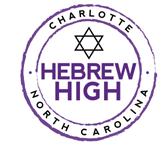
As the largest pluralistic Jewish youth movement for teens in grades 8–12, BBYO reaches 80,000 participants in more than 700 chapters around the globe, empowering them to connect with their Jewish identity and each other. In Charlotte, we have four BBYO chapters, two for teens that identify as female, and two for teens that identify as male. Charlotte BBYO has 250 members involved in weekly
chapter programs and weekend conventions.
Chapter advisors ensure the grassroots success of BBYO, working on the ground with teens to run high-quality chapter programs, tackle ambitious projects, and develop valuable leadership skills. As an advisor, you’ll mentor and coach teens to grow as individuals and community leaders, build meaningful relationships and bring out the best in others, and have a great time.
volved/become-an-advisor for an advisor role description and to apply. If you have questions and are interested in volunteering to serve as a chapter advisor, please email charlotte@bbyo.org
Brokerage Residential & Commercial

Richard Roskind Realtor®/Broker LICENSED IN NC & SC 704.905.6175 rcroskind@aol.com
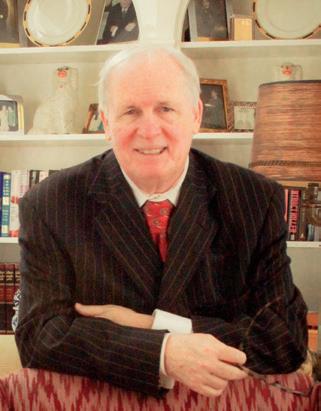

We hope to welcome you into our network of more than 700 advisors worldwide! For more information, please visit our website at bbyo.org/get-in-
the 2022-2023 school year will be out later this summer. Please check our website at www.hebrewhigh.org to learn more or email the Hebrew High director, Megan Harkavy, at mharkavy@ hebrewhigh.org. Hunter Roskind Realtor®/Broker If you or anyone you know have a property in need of a property manager, please call me at: 980.288.5616 hroskind@gmail.com
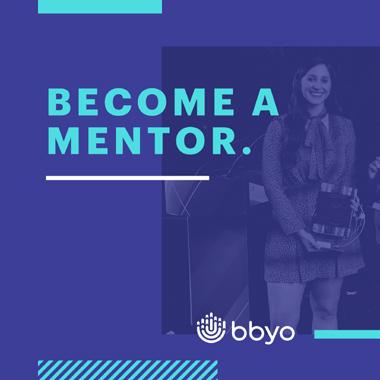
When the pandemic began and people could not gather in person, Friendship Circle met the challenge by providing virtual group programs and weekly one-on-one visits between friends. When friends were ready to participate in activities faceto-face, we designed in-person programs to provide fun social interaction in a healthy and safe environment. Whether meeting virtually or in person, Friendship Circle’s commitment to providing inclusive activities that encourage lasting friendships between typically developing teen friends and those friends with special needs, special friends, never wavered.
In addition to programs for children, teens, and young adults, Friendship Circle offered regular programming for parents and families of Friendship Circle. We offered opportunities for social interaction and friendship to everyone involved, including moms participating in Walking Wednesday, parents meeting on Sunday, families gathering at the family picnic, or friends gathering for Coffee and Conversation.
Take a look at the great things that happened this year:
Friends meet virtually to engage socially, play games, talk,
and have fun.
The flagship program of Friendship Circle that allows teen friends and special friends to gather for in-person meetings at the Friendship Circle building.
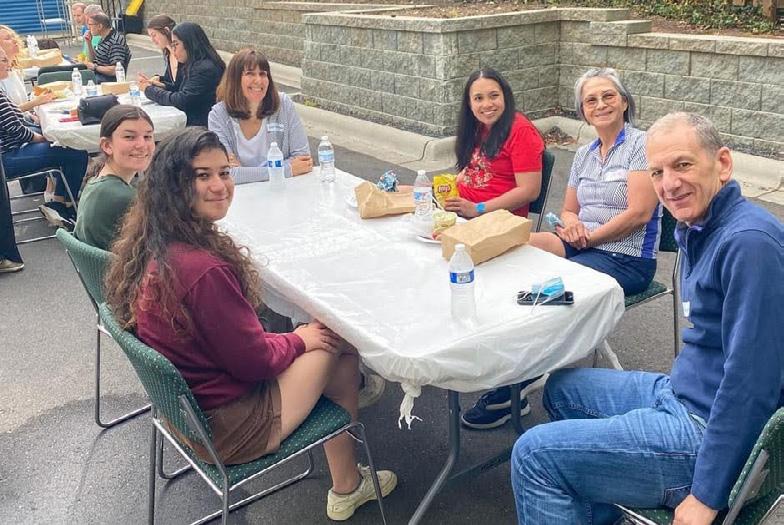
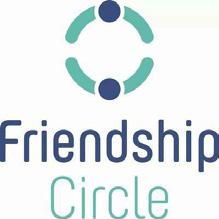
Participants engage in games, crafts, and conversation while building lasting friendships.
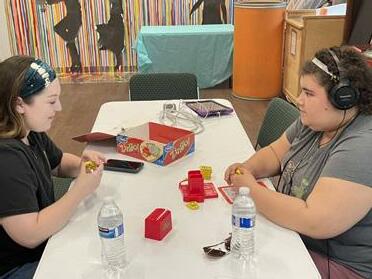
Mom’s Walking Wednesday
Friendship Circle Moms meet each week to walk, talk, and just enjoy each other’s company.
Coffee and Conversation
Monthly meeting where parents meet to have a nosh, support each other, and just hang out with friends while their children enjoy another program.
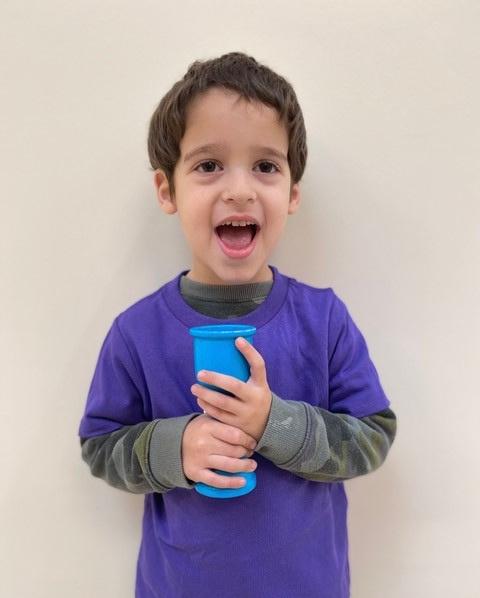
End-of-Year Family Picnic and Celebration
Just plain fun and friendship for everyone!
The best is yet to come! The
grand opening of the inclusive Friendship Circle Fun Zone, will include a parent lounge, indoor tree house, jungle gym, zip line, sensory experiences, and much more. It will be an inclusive place where everyone can meet and make friends.
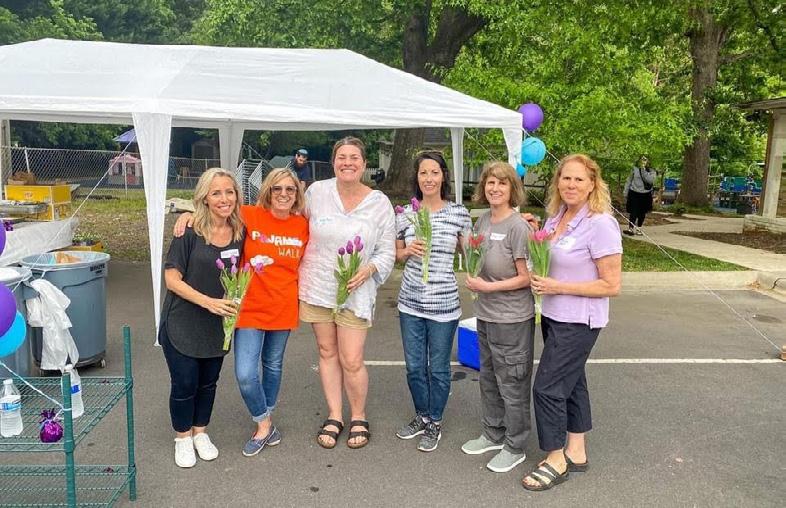
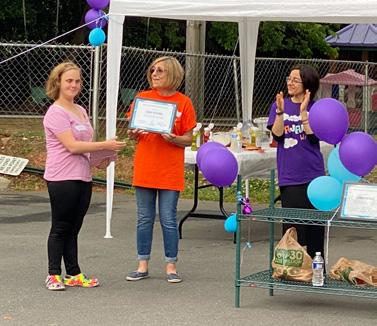
For more information about Friendship Circle programs or to learn how to get involved, please visit friendshipcirclenc.org.
FriendshipCircle is a beneficiary agency of the Jewish Federation of Greater Charlotte. To learn more, visit Friendshipcirclenc.org
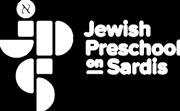

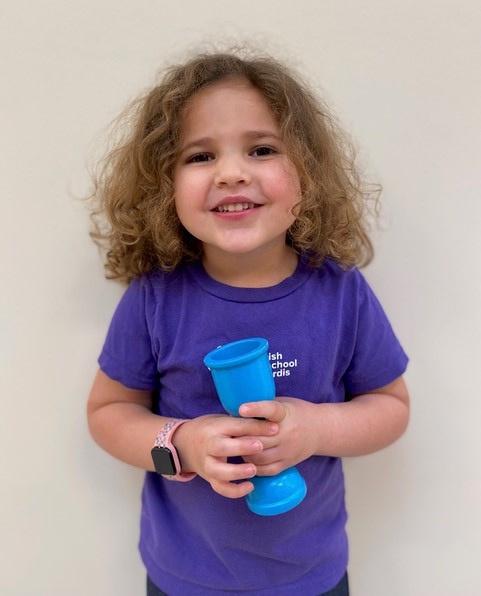


Welcome to your gorgeous modern residence in Generations at Shalom Park. Jewish in culture and open to all, Generations is a collaboration between the partners at Shalom Park and Aldersgate Life Plan Services, which will operate the Senior Living Community, drawing on its 75 years of leadership in Charlotte-based aging services.
Now, for a limited time, entry into Generations can be reserved at substantial savings by joining our Genesis Club. Please contact us today before these benefits expire.
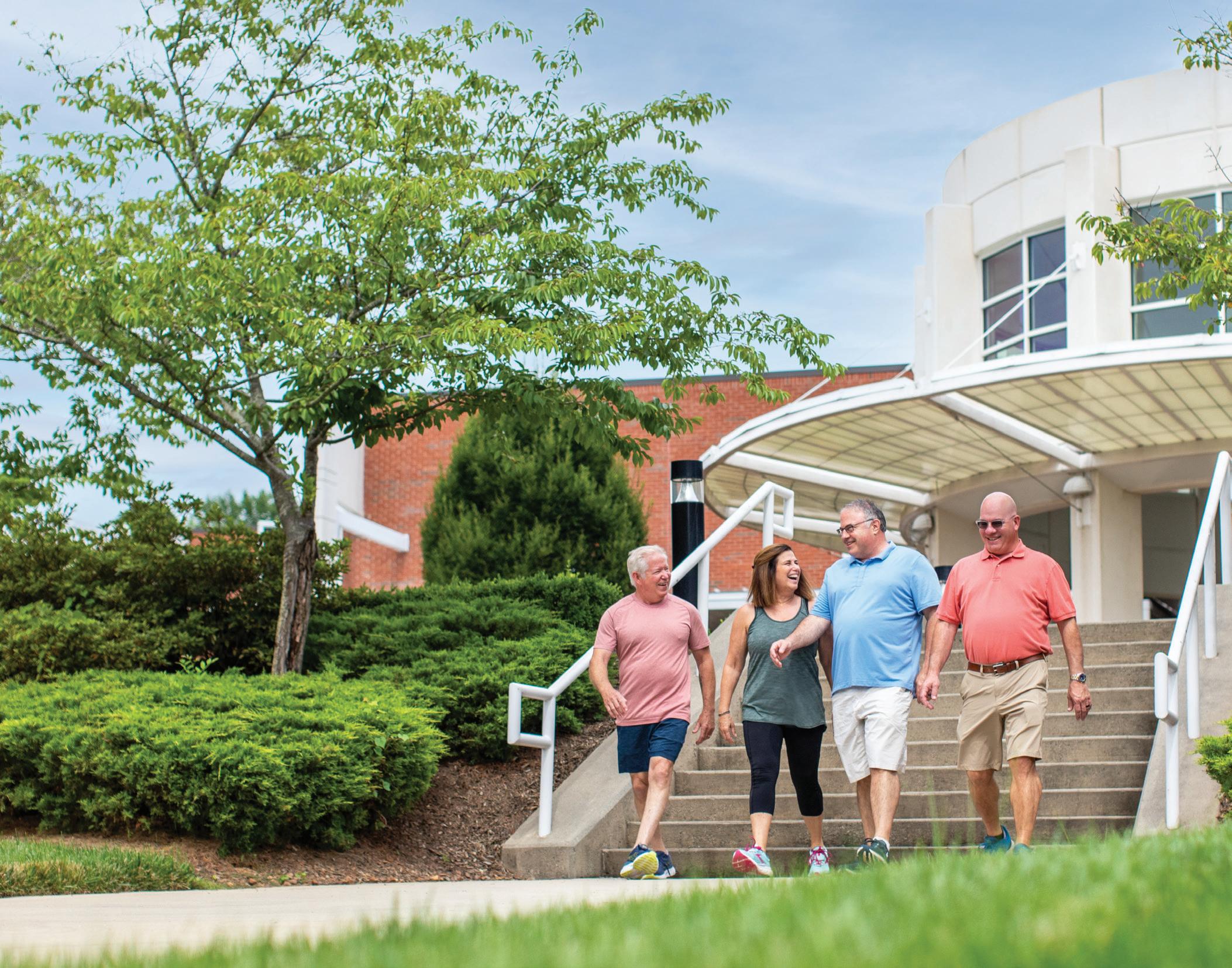

Despite his name, Norman Jewison, the director of the 1971 film adaptation of “Fiddler on the Roof,” is not Jewish.

The 95-year-old Jewison has often spoken about how, when asked to helm the movie version of the popular Broadway musical about an Old World shtetl, he felt the need to sheepishly inform the producers that he was a goy.
Less well known is that, following the worldwide success of the “Fiddler” movie, Jewison actually wound up embracing the Jewish faith. Though he has never spoken of formally converting, he reveals near the
end of the new documentary “Fiddler’s Journey to the Big Screen” that, when he married his second wife Lynne St. David Jewison in 2010, the couple had a Jewish wedding — complete with a rabbi and a chuppah.
“Fiddler’s Journey to the Big Screen” tells the story of how the stage musical became a beloved screen classic. (It’s not to be confused with the 2019 documentary “Fiddler: A Miracle of Miracles,” which focused more on how the adaptation of Sholem Aleichem’s Yiddish short stories made it to the stage.) Directed by Daniel Raim, an Israeli-born filmmaker who specializes in behind-the-scenes film history documentaries for the boutique
arthouse label The Criterion Collection, “Fiddler’s Journey” concerns itself with the details of film adaptation and the logistical challenges of recreating a convincing prewar Jewish shtetl in the former Yugoslavia.
It also focuses on the long, illustrious career of Jewison, for whom “Fiddler” became a signature film. One of the rare directors to have been nominated for an Oscar in three separate decades — his other two were for “In the Heat of the Night” (1967) and “Moonstruck” (1987) — Jewison landed the “Fiddler” job partly on the strength of his Cold War satire “The Russians Are Coming, The Russians Are Coming.” His commitment to verisimilitude in depicting Anatevka led him to reject the original Broadway “Fiddler” star, Zero Mostel, in favor of Israeli actor Topol. Mostel’s version of the milkman Tevye, said Jewison, was “too American.”
That commitment also led Jewison and his crew to reconstruct a wooden synagogue in the style once common in the Pale of Settlement, a story told in one of the documenta-
ry’s more moving passages. Jewison’s crew was unable to find a real-life synagogue that hadn’t been destroyed during the war. The new documentary’s Ukrainian-born producer and publicist, Sasha Berman, felt a connection to the film for this reason: Her grandmother grew up in an Anatevka-like shtetl, and would tell her stories about village life in much the same way as Sholem Aleichem, keeping the stories of Jewish life alive.
Other memorable moments of the documentary include interviews with Rosalind Harris,

Michele Marsh and Neva Small — actresses who played three of Tevye’s daughters and who each remembered the experience as the role of a lifetime — and Jewison’s memories of screening the completed film in Israel for then-Prime Minister Golda Meir (David Ben-Gurion got to see it, too). Though Jeff Goldblum is billed as the documentary’s narrator, he makes only sporadic voice appearances.
Miracle of miracles, many of the people who brought us “Fiddler,” including Jewison, Topol, composer John Williams and original Broadway lyricist Sheldon Harnick, are still alive (composer Jerry Bock died in 2010). We see them all in the documentary, although many of the interviews are not original to this film. Still, there is a certain thrill to realizing that the history of “Fiddler,” a show which celebrates a long-dead way of Jewish life, is, in its own way, still living.
“Fiddler’s Journey To The Big Screen” opens April 29 at New York’s Angelika Film Center, and expands to Los Angeles May 6, with other cities to follow.
By Charlotte RouchouzeThis month’s recipe comes from a special cookbook called “The Art of Jewish Cooking,” by Jennie Grossinger. Some of a certain age might recognize the name Grossinger as the family behind a famous resort in the Catskills (Grossinger’s) where Jews from across the Eastern United States holidayed for much of the 20th century. “The Marvelous Mrs. Maisel” pays tribute to the iconic resorts in a story arc in season two when Midge and her family spend the summer at one of these adult summer camps. Also known as the “Borscht Belt,” these resorts brought together all the richness of Ashkenazi immigrant culture in America, in particular, comedy,
Peel the cucumbers and slice very thin. Pour the boiling water over them and let stand for 5 minutes. Drain and plunge into ice water. Drain again. Mix together sour cream, lemon juice, dill, salt, pepper and sugar. Pour over the cucumbers, tossing until well mixed. Chill for 30 minutes before serving.
food, and community.
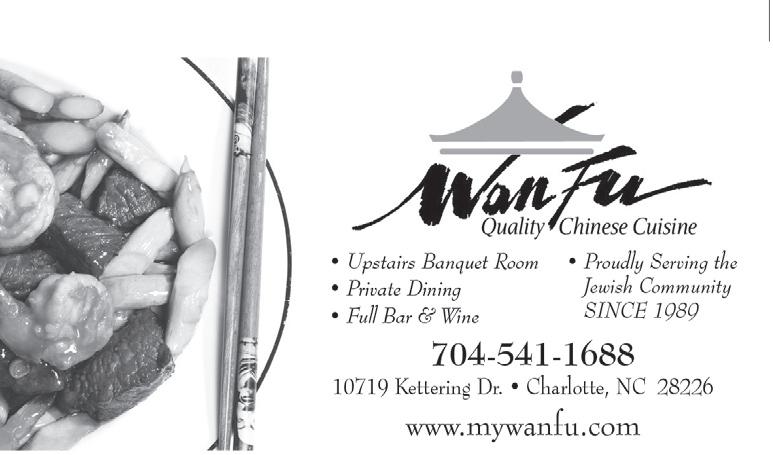

The food at Grossinger’s was kosher and traditional, and in 1958, the family published a book of their beloved recipes. In the foreword, Jennie Grossinger’s son writes that Jewish food is basically a history book, “a history of 5,700 years of happiness and sorrow.” The chapter from which this recipe comes places us in mid-century America, with a booming Eastern European Jewish culture. Sour cream and dill are both beloved ingredients on the Eastern European table, and this dairy recipe makes use of both for a typical Eastern Eu-
ropean salad. It makes a lovely, fresh addition to your Shavuot table.
Charlotte Rouchouze, PhD is a local French teacher, food blogger, and beaded jewelry designer. Her blog about food traditions from around the world can be found at www.thechildrenstable.com. Contact her at charlotte.rouchouze@ yahoo.com.
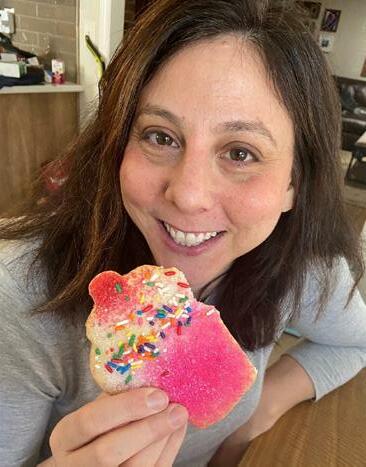
Cucumbers in Dill from “The Art of Jewish Cooking” by Jennie GrossingerDirector Norman Jewison, right, and star Topol as Tevye on the set of the film version of "Fiddler on the Roof." (Zeitgeist Films in association with Kino Lorber) By Liz Wahls
Food insecurity is a growing problem in our community, accelerated by the COVID pandemic and increasing inflation. Many people struggle to afford fresh fruit and vegetables because these items tend to be more expensive than processed foods.
Fresh produce has a short shelf life, which means that it spoils and therefore can’t be bought in bulk and stored in the same way processed or preserved foods can. The cost of procuring and storing fresh produce can deter retailers, leading to accessibility issues for customers. A food desert is an area with limited access to affordable and nutritious food.
According to Sustain Charlotte, almost 15% of Mecklenburg’s population lives in food deserts. This is a greater percentage than both the national average (11%) and the North Carolina average (13%).
With heightened awareness of the issues of food insecurity and the connection of environmental justice and social justice, Shalom Green has, since its inception in 2015, partnered with Jewish Family Services of Greater Charlotte (JFS) to donate fresh produce from the Shalom Park Community Garden to its
food pantry. Roberta Rodgers, community liaison coordinator for JFS, says, “Our clients are always thrilled to receive fresh produce! We are so happy to be able to offer produce in addition to the nonperishables that we routinely distribute. We are grateful for Shalom Green and its garden volunteers.”
The Shalom Park Community Garden was built and is managed by Shalom Green, the volunteer-led Shalom Park Environmental Initiative. In the garden, volunteers grow healthy vegetables, fruits, and herbs for donation and for environmental programs such as Green Sprouts and the Charlotte Jewish Day School’s Garden Club meet. Anyone is welcome to visit the garden and enjoy the picnic tables, but please follow the posted garden rules at the entrance including:
- Please don’t pick the produce, as it is intended for donation to the community.
- Group use of the garden space must be scheduled through The Foundation of Shalom Park.
- Remember to be kind to nature and clean up after your use.

There are several ways to get involved and help Shalom Green combat food insecurity
in our community. The Torah states that when we harvest, we should leave the “corners of the fields” (pe’ah) for the poor. To help community members fulfill this mitzvah, Shalom Green invites home gardeners to share their abundant harvests through our new initiative, Project Pe’ah Forward.
Every two weeks, gardeners can bring excess produce from their home gardens to Shalom Park, and Shalom Green volunteers will bag and label it for donation to the JFS food pantry along with the vegetables, herbs, and fruit grown in the Shalom Park Community Garden. Not only will this initiative increase much-needed donations of fresh produce to JFS, but also Project Pe’ah Forward participants will receive access to special events and exclusive educational opportunities, including Q&A sessions with our resident horticultural expert, Shalom Green part-time garden coordinator, Bobbie Mabe. To express interest in donating your produce through Project Pe’ah Forward, email info@shalomgreenCLT.org.
The Shalom Park Community Garden is powered by volunteers — novice and experienced gardeners, families and retir-
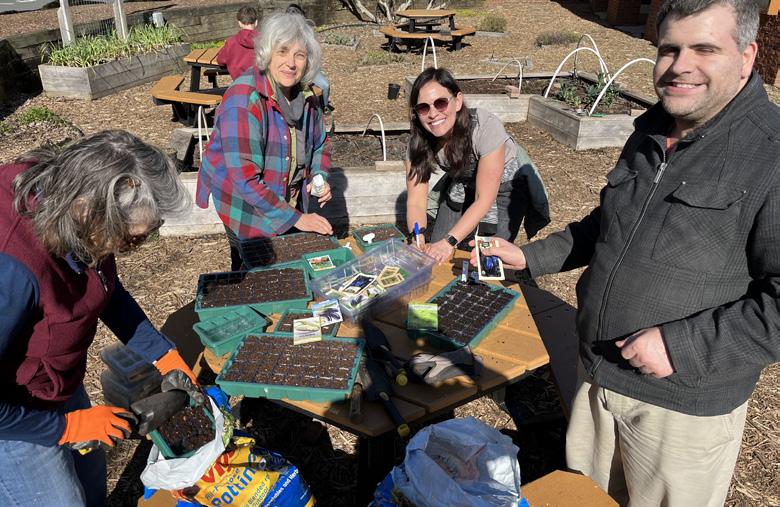
ees, teens looking for volunteer hours, and others. Come join us for our monthly garden workdays, usually the third Sunday of the month, to plant, weed, water, mulch, harvest, learn about gardening, and meet new people. Our next work days are June 26 and July 17, from 9 to 11 a.m. Register and sign up for our email list on the Shalom Green website, https://shalomgreenclt. org/.
Jewish tradition teaches the importance of caring for the environment, for we must act as partners in preserving creation. If you are interested in donating
your time or dollars to Shalom Green, please visit our website at https://shalomgreenclt.org/ and email us at info@shalomgreenCLT.org. Like us on Facebook. Follow us on Twitter and Instagram. Visit our YouTube channel.
CHARLOTTE, N.C. – On January 15, The Charlotte Museum of History opened a new exhibit that highlights a Jim Crow-era partnership between a Black educator and a Jewish businessman that changed the lives of Black children and families in the American South for generations. The exhibit premiered at the National Center for Civil and Human Rights in Atlanta in May.
“
‘A Better Life for Their Children’ offers us the opportunity to explore the history of education in Charlotte and across the South,” said Fannie Flono, history museum trustee and chair of the museum’s Save Siloam School Project. “This history has never been more relevant, as our city and county work to improve equality and opportunity. The Rosenwald Schools story can help us understand how we got here and how we move forward.”
The exhibit tells the story of one of the most significant moments in the history of edu-
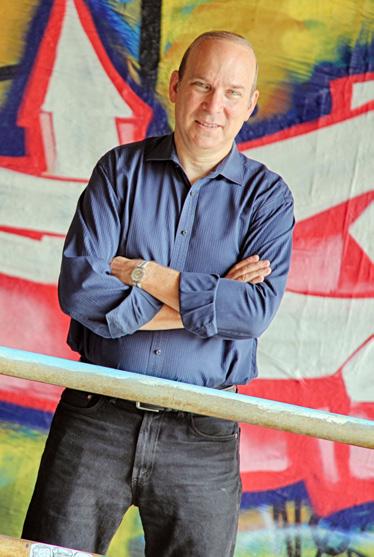
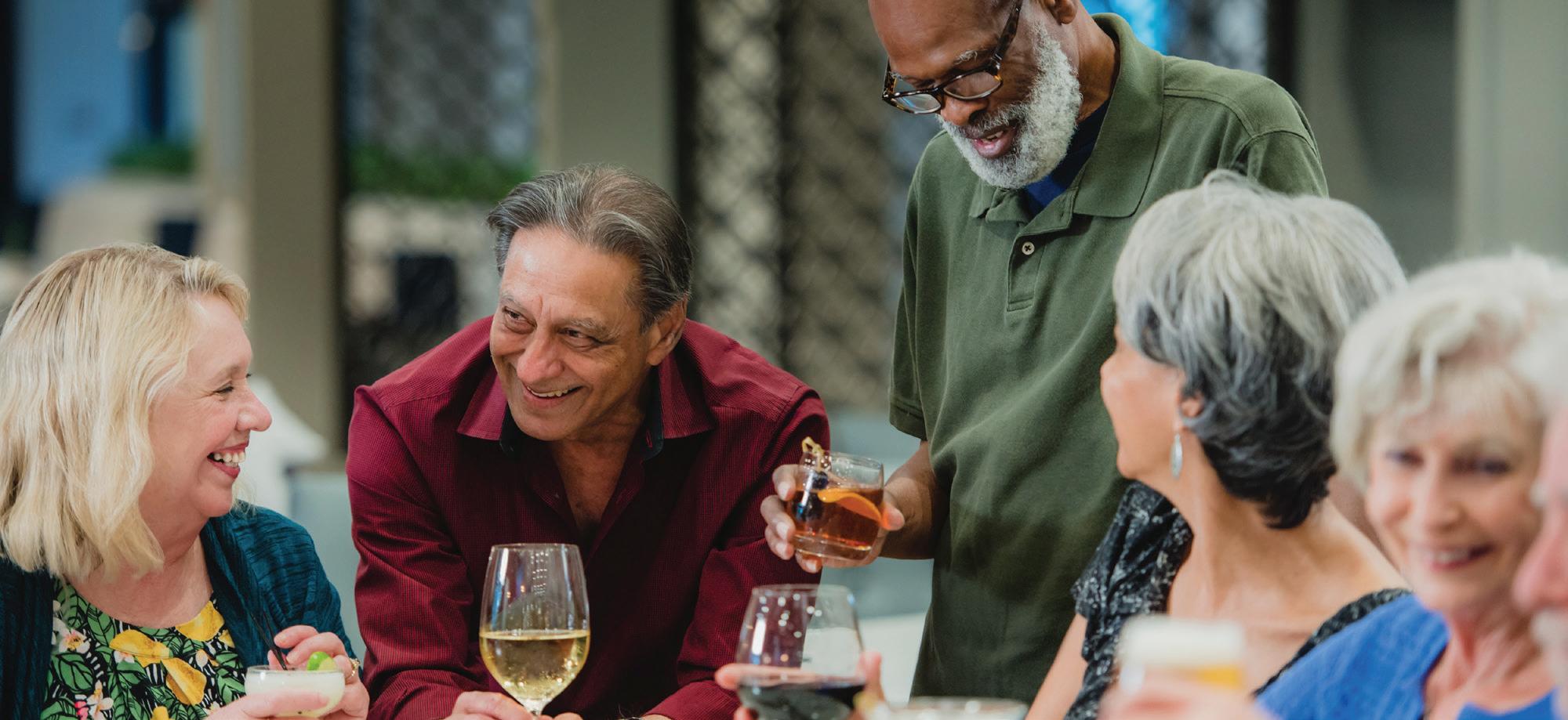
cation in the rural South — the ambitious Rosenwald Schools program, launched by educator Booker T. Washington and Julius Rosenwald, president of Sears, Roebuck & Company.
Of the original 4,978 schools built for Black children with the support of the Rosenwald
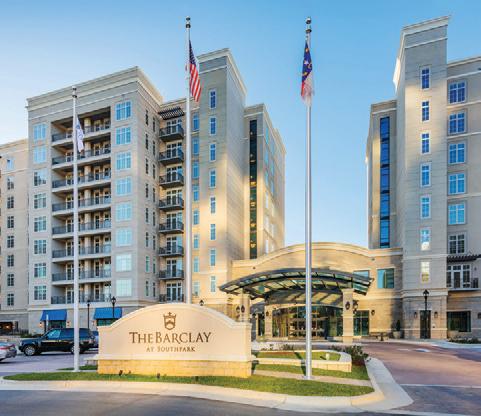
Fund, only about 500 survive. Many of those are threatened by decay and neglect. A photographer and fifth-generation Jewish Georgian, Andrew Feiler, drove more than 25,000 miles across the South to document this important history. Along the way, he interviewed former Rosenwald School students and teachers, as well as preservationists and community leaders. That work became “A Better Life for Their Children,” a book of photographs, stories and essays published in early 2021, and this accompanying exhibit.
“We often see America’s challenges as intractable, especially those related to race,” Feiler said. “Booker T. Washington and Julius Rosenwald reached across divides of race, religion and region, and they changed this nation. Their accomplishment still speaks to us today, showing that individual actions matter.”
Communities in North Carolina built 813 Rosenwald schools, more than any other state. More
than 20 Rosenwald Schools were built in Mecklenburg County, but only seven of the buildings still stand.
The history museum is displaying the exhibit as part of its years-long effort to restore Charlotte’s historic Siloam School, a Rosenwald-era school built by
an African American community in the 1920s. While the school’s design used a Rosenwald plan, there are no records indicating that the school received Rosenwald funds. It is likely that the local Black farming community in the Mallard Creek area raised
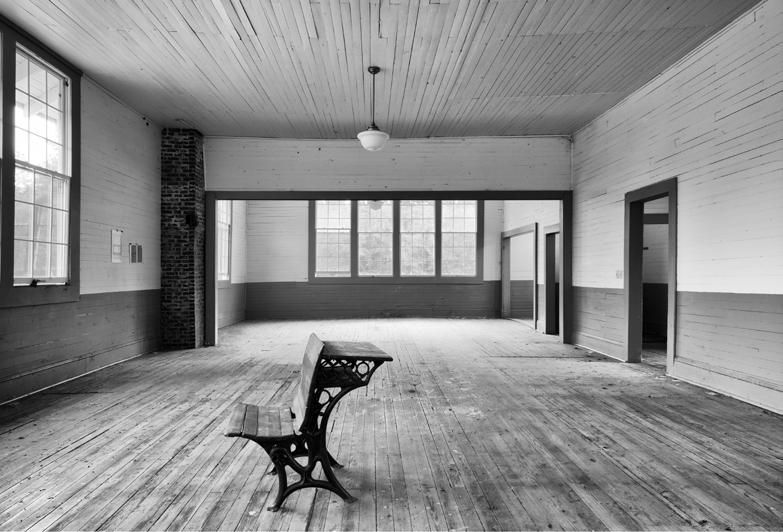
https://www.digitalnc.org/newspapers/charlotte-jewish-news-charlotte-nc/.
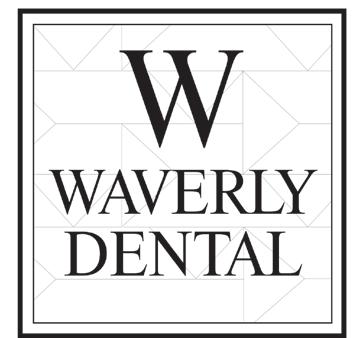
Violins of Hope is a multifaceted project that has at its center the premiere of 18 violins recovered from the Holocaust and restored by Israeli vioilinmaker Amnon Weinstein.
Never before exhibited or played together in North or South America, the violins arrive in Charlotte in early April. The exhibition at the new UNC Charlotte Center City Gallery opens to group tours on April 9 and to the general public on April 16. A series of five concrts begins April 12.
A related program at Levine Museum of the New South with the accompnaying exhibitions Down Home: Jewish Life in North Carolina and All That Remains, an exhibit about local Holocaust survivors, is Courage and Compassion. This program documents the efforts of the Bielski brothers, Jewish resistance fighters who saved more than 1,200 Jews in the forests of Byelorussia. Their story has a particular connection to the Violins of Hope because Assaela Weinstein, the wife of violinmkaer Amnon Weinstein, is the daughter of partisan Assael Bielski. Ms. Weinstein and her cousin Ruth, daughter of Ruvia Bielski, will lead
a panel discussion about their family’s extraordinary history at Levine Museum of the New South on April 18.
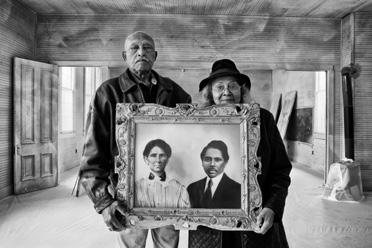
The Violins of Hope is presented in partnership with nearly 20 cultural and academic partners and with the financial support of Wells Fargo Private Bank (exclusive corporate sponsor), the Sandra and Leon Levine Foundation, the John S. and James L. Knight Foundation, the Blumenthal Foundation, the Arts & Science Council, Foundation for the Ccarolinas, The Jewish Federation of Greater Charlotte, U.S. Air, and Lufthansa, as well as individual and community support. WFAE 90.7 FM is the project media sponsor.
Other related programs around the area in April and beyond include:
Down Home: Jewish Life in North Ccarolina, through September 9 at the Levine Museum of the New South
A special exhibit sponsored by the Jewish Heritage Foundation of North Carolina and exhibited by Levine Museum of the New South, Down Home explores the ways in which the Jewish community has shaped the culture and history of North Carolina for the
money for the school and donated time and labor to build it. Once restored, the building will become an important history resource for Charlotte, shining light on current issues around equity, education and opportunity. So far, the Save Siloam School Project has raised $660,000 toward a $1 million goal to complete the school’s restoration.
The exhibit’s run at the history museum is supported by grants from AT&T Foundation, PRIDE Magazine and North Carolina Humanities, an affiliate of the National Endowment for the Humanities.
In the early decades of the twentieth century, a visionary partnership between a Black educator and a Jewish business leader launched transformational change across the segregated South.
Born to Jewish immigrants, Julius Rosenwald rose to lead Sears, Roebuck & Company and turned it into the world’s largest retailer. Born into slavery,
Booker T. Washington became the founder and first president of Tuskegee Institute (now Tuskegee University). In 1912 the two men launched an ambitious program to partner with Black communities to build public schools for African American children. From 1912 to 1937, the program built 4,978 schools across 15 states. Rosenwald schools drove dramatic improvement in Black educational attainment and educated the generation who became leaders and foot soldiers of the Civil Rights movement. Former congressman John Lewis, a Ros-
past 400 years, and how North Carolina, in turn, has affected Jewish lives.
All That Remains through September 9 at the Levine Museum of the New South
This new panel exhibit was inspired by an article that originally appeared in Charlotte Magazine. Writer Ken Garfield interviewed ten people living in Charlotte area who survived the Holocaust and understood the importance of telling their stories before it’s too late. Photographer Chris Edwards too beautiful, stirring portraits of each. Together, these stories are a voice from the past, a gift from ten Charlotteans determined to have the last word.
BESA: A Code of Honor through May 16 at the Levine-Sklut Judaic Library and Resource Center
This photographic exhibition of Muslim Albanians who rescued Jews during the Holocaust presents a beautiful, interfaith message regarding the power of humanity in the face of oppression.
Hope in Dark Places: Music and Poetry from the Theresienstadt Ghette, April 17 at 8 p.m. at Dana Auditorium, Queens University of Charlotte
This performance in the Violins of Hope concert series pays tribute to the musicians held at the Theresienstadt ghetto and the music they created there. Featuring chamber music composed at Theresienstadt, as well as the Brahms Piano Quintet, the concert will also present poetry and drawings by children who were prisoners of the camp.
Courage and Compassion: A Panel Discussion with the Bielski Family, April 18 at 5:30 p.m., Levine Museum of the New South
In conjunction with the Courage and Compassion exhibit at Levine Museum of the New South, Assaela Weinstein, wife of Amnon Weinstein and daughter of one of the Bielski brothers who established and led the partisan community in the forests of Belarus, along with other descendants of teh Bieliski family, take part in a panel disucssion on the history of the Bielski partisans.
Violinmaking masterclass with Amnon Weinstien, April 21 at 2 p.m. at UNC Charlotte Center Building, Free Internationally noted Israeli violinmaker Amnon Weinsted is involved in violin projects around the world, working with orchestras and artists
both in Israeal and abroad. Mr. Weinstein learned his craft from his father and then studied in Cremona with Pietro Sgarabotto, Giuseppe Ornati, and Ferdinando Garimberti and in Paris with Etienne Vatelot. He is a winner of the Gold Medal and a certificate for violin sound at Salt Lake City in 1982. He is a member of Entente International des Maitre Luthiers et Archetiers d’Art, a member bienfaiteur de Groupement des Luthiers et Achetiers d’Art de France, and a member of the Violin Society of America.
Open to violin owners, collectors, and enthusiasts, this workshop will be led by Amnon Weinstein and his son Avshalom. Together, the two violin makers will discuss their craft and speak to the history ofr unique qualities of instruments brought to the workshop for their expert consideration.
Additional programs were associated with Violins of Hope in 2012.Visit CJN archives for the full article: www.digitalnc.org/newspapers/charlotte-jewishnews-charlotte-nc/
enwald School alumnus, wrote the foreword for Feiler’s book.
About Andrew Feiler
Andrew Feiler is a photographer and author from Savannah, Ga. He has long been active in civic life, supporting creative community initiatives and serving on nonprofit boards. His art is an extension of his civic values. Feiler’s work has been featured in the “Wall Street Journal” and “Smithsonian” and on “CBS This Morning.” See more of Feiler’s work at andrewfeiler. com.
The exhibit—“A Better Life for Their Children: Julius Rosenwald, Booker T. Washington, and the 4,978 Schools that Changed America. Photographs & Stories by Andrew Feiler” —will be on display at The Charlotte Museum of History through June 18, 2022.
The exhibit is included in regular museum admission. Get tickets at charlottemuseum.org/ visit.
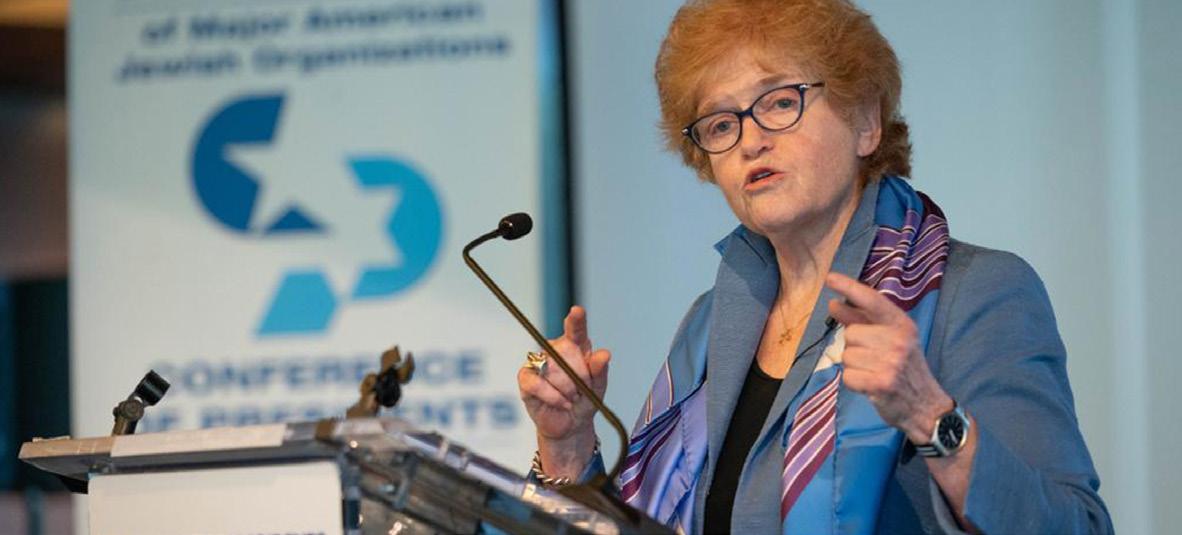
us between domestic and international antisemitism” noting that the Buffalo shooter plagiarized his rants from the Christchuch killer in New Zealand, who murdered 51 Muslims in 2019.


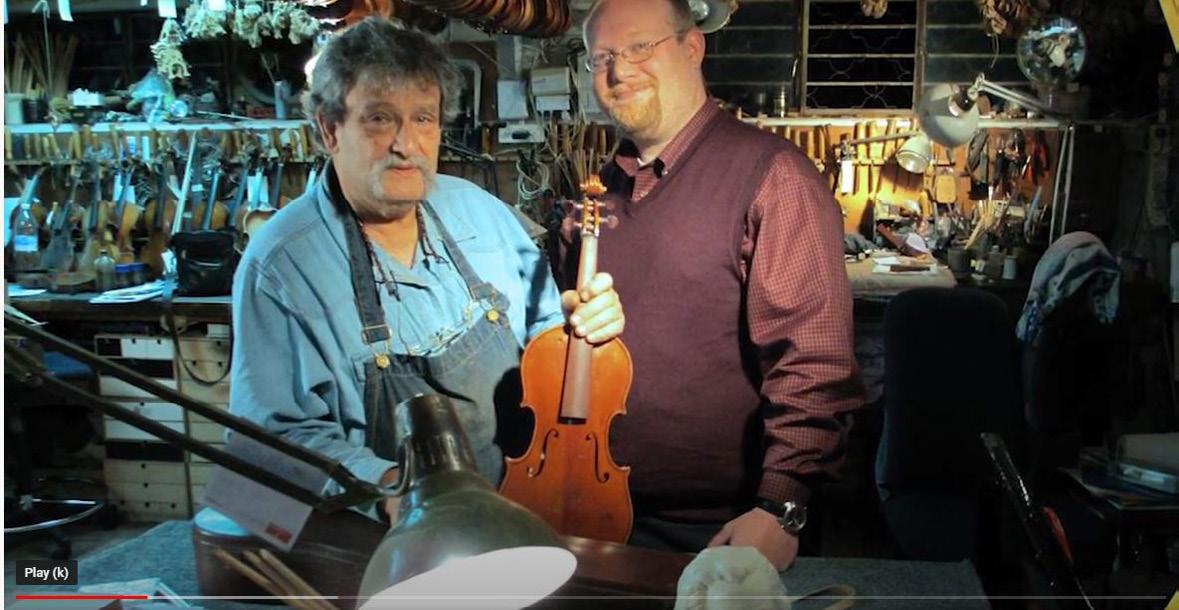
“These killers, even if they have never communicated directly with one another, are part of an interlocking nexus of haters,” Lipstadt said. “They inspire one another and their followers.”
She also said that “we cannot ignore the connection between antisemitism and the attacks on Israel,” but noted that “criticism of the policies of the Israeli government is not antisemitism per se.”
she said. “When a Jewish state is denied the same treatment that is accorded to every other state, one is compelled to ask, ‘What is the basis for this imbalance?’ The answer should be self-evident.”
By Jacob Henry (New York Jewish Week) May 26, 2022 (JTA)President Joe Biden’s antisemitism monitor, Ambassador Deborah Lipstadt, said the recent Buffalo mass shooting was a demonstration of a pervasive antisemitic ideology in her first-ever keynote address in New York on Thursday morning.
“Many people were shown the horrific impact of the Great Replacement Theory in the Buffalo shooting,” she said, referencing a racist and antisemitic conspiracy theory the Buffalo shooter had shared in an online manifesto. She said the shooter’s “first objective was to kill Blacks, but the Jews would be dealt with in time.”
Lipstadt delivered the speech at a one-day conference arranged by the Conference of Presidents of Major American Jewish Organizations, the foreign policy umbrella for Jewish groups, held Thursday at the Museum of Jewish Heritage in Battery Park. Its purpose was to address the rise in antisemitism across the United States.
In New York, antisemitic incidents increased by 24 percent last year to the highest level in decades, according to an annual report released by the Anti-Defamation League. The report counted 416 antisemitic incidents across the state, including 51 assaults, the most physical attacks since it began compiling data in 1979.
There was also a rise across the nation, with 2,717 antisemitic incidents across the United States, including 88 assaults, an increase of 167 percent from the year before.
During her 30-minute speech, which was followed by a panel discussion, Lipstadt described antisemitism as “ubiquitous, free-flowing and moving in and coming from all directions.”
“We must never delude ourselves that antisemitism comes
from only one political, social, ethnic or religious direction,” she said.
Prior to her public remarks, Lipstadt, a Holocaust historian who also was appointed to United States Holocaust Memorial Council by former President Bill Clinton, spent a few minutes talking one-on-one with this reporter. “I grew up in New York,” she told the New York Jewish Week. “My family came to New York, I’m a New Yorker. You can take the girl out of New York, but you can’t take New York out of the girl.”
Lipstadt, 75, grew up in Far Rockaway, Queens, and went on to become an influential figure in Holocaust education around the world. In 1996, she was sued by British author and Holocaust denier David Irving for writing about him in her book “Denying The Holocaust.” Lipstadt won the case.
When Lipstadt was first nominated as an ambassador in July 2021, her appointment was delayed because she criticized Republican Senator Ron Johnson, whom Lipstadt said was advocating for white supremacy.
Lipstadt was officially sworn in to the special envoy role two days ago by Vice President Kamala Harris, entering the office “as a child of two immigrants who implanted within their children an abiding faith in their religious identity and an equally abiding faith in the United States of America,” as she said today.
During her remarks, which were given before an in-person crowd of approximately 50, the ambassador discussed the ways that antisemitism is linked to other hate speech, citing the May 14 Buffalo shooting in which 10 Black people were murdered.
She cited multiple other examples that connected racism and antisemitism, including Charlottesville in 2017, when white nationalists chanted,
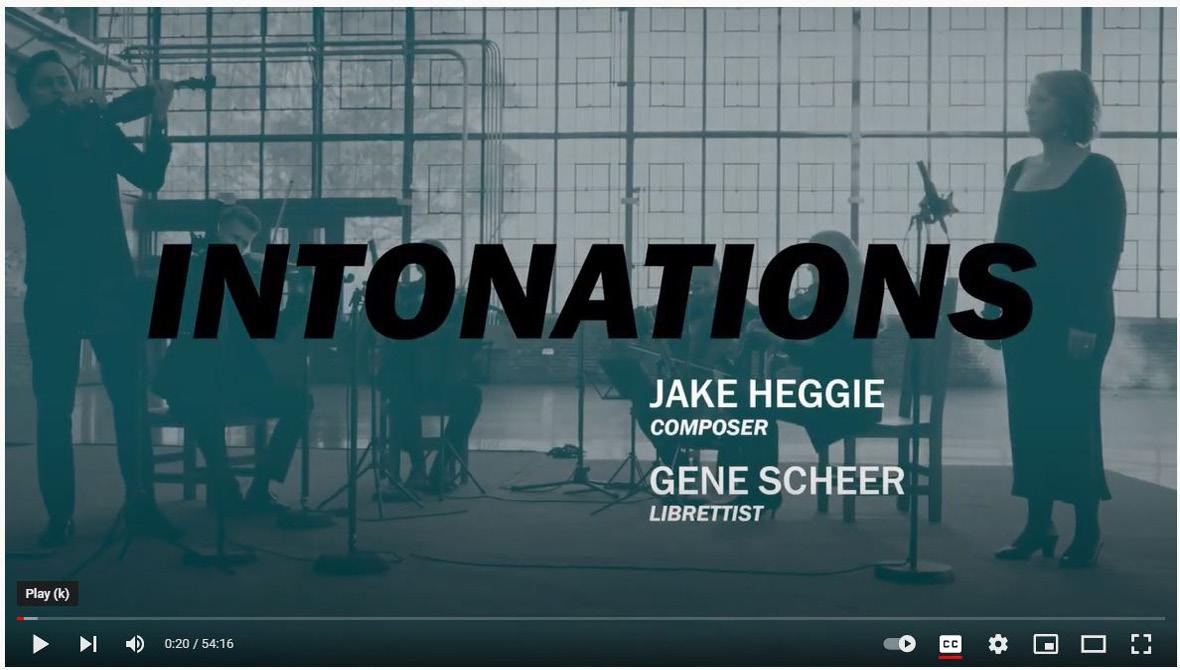
“Jews will not replace us,” as well as the 2018 Tree of Life shooting in Pittsburgh, where 11 people were murdered while at synagogue.
She added that there is a “nex-
She added: “Reflexively labeling any criticism of Israel as antisemitism is not only wrong, but can be counterproductive in the fight against antisemitism.”
Still, Lipstadt pointed out that some of the criticism of is Israel is a foil for antisemitism. “Particularly of its legitimacy to exist,”
She also said that the Biden-Harris Administration “enthusiastically embraces” the International Holocaust Remembrance Alliance (IHRA), a working definition of antisemitism that remains controversial in some circles for its depiction of some anti-Israel speech. “It helps identify and underscore the unique challenges experienced by Jewish communities worldwide,” she said.
Separately, Lipstadt told the New York Jewish Week that there is “a clear understanding” by the president and vice president that “antisemitism is a threat to democracy,” adding: “This is not just something that must be
In the early 1930s, Victor Perez was on top of the world.
The Tunisian Jewish boxer, who fought under the ring name “Young Perez,” became the World Flyweight Champion in 1931 and 1932 after moving from Tunis to Paris. He became a bonafide celebrity, dating famous French actress Mireille Balin (who would later go on to date Nazis).
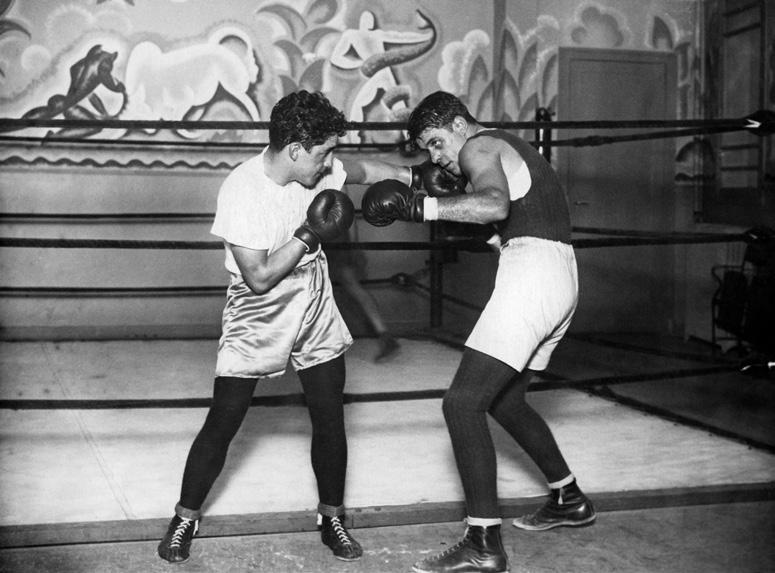
But like millions of others, Perez’s story took a dark turn as the Nazi campaign progressed. In September 1943, Perez was detained and transported to the Monowitz subcamp of Auschwitz, the same labor camp where authors Primo Levi and Eli Wiesel were held.
While at Monowitz, Perez was forced to box other inmates to entertain the SS officers. The winner would receive extra food; the loser would be killed. Perez was ultimately murdered during a 1945 death march.
That story is just the first episode of “Holocaust Histories,” a new podcast by Jonathan Bonder, a 36-year-old Ontario native and sound designer whose credits include Jean-Claude Van Damme’s 2015 film “Pound of Flesh” among other movies, shorts and commercials.

Bonder envisions each season of “Holocaust Histories,” which is serialized and debuted last week, will focus on a different theme. Season one focuses on professional boxers from across the globe whose careers were cut short by the Holocaust.
There are hundreds of films about the Holocaust, not to mention countless books and television series. But in terms of Holocaust history podcasts, Bonder found the available content underwhelming.
“There’s hundreds and hundreds of true crime podcasts, comedy, sports,” Bond-
er told the Jewish Telegraphic Agency. “And I thought to have something that was needed right now, which is the education of the Holocaust — if someone like me wanted to find a podcast about the Holocaust, they would be disappointed, like I was.”

And given his background, Bonder was also motivated to make better use of the audio setting to elevate the storytelling.
“A lot of podcasts, they’re telling the story and they just blanket it with either a music soundtrack or a series of drums,” he said. “I thought it is missing a big opportunity, which is to make it more cinematic. If you can do that, then it’s going to be more entertaining, and if it’s more entertaining then ultimately it will be more educational. The message will get across better.”
It all started when Bonder learned about famous boxer and Holocaust survivor Harry Haft, the subject of HBO’s “The Survivor.” Haft’s story stuck with him, and when Bonder later learned about other Jewish boxers from the era, “I kind of just got obsessed with these individual sto-
(Continued from page 34)
fought to keep Jews safe, which alone would be enough, but this has even broader implications.”
The remainder of the conference was closed to the media and the public. Others scheduled to speak during closed-door sessions include Adam Lehman, the CEO of Hillel International; Nathan Diament, the executive director of the Orthodox Union Advocacy Center and Patrick Daly, the deputy director of Secure Community Network.
Lipstadt, meanwhile, was the
keynote speaker at Yeshiva University’s commencement, which began at 1 p.m. Thursday afternoon at the Arthur Ashe Stadium at the USTA Billie Jean King National Tennis Center in Flushing, Queens.
In a separate conversation with the New York Jewish Week, when asked about recent events in New York, Lipstadt said that attacking Jews on a college campus for being Zionists is “crazy.”
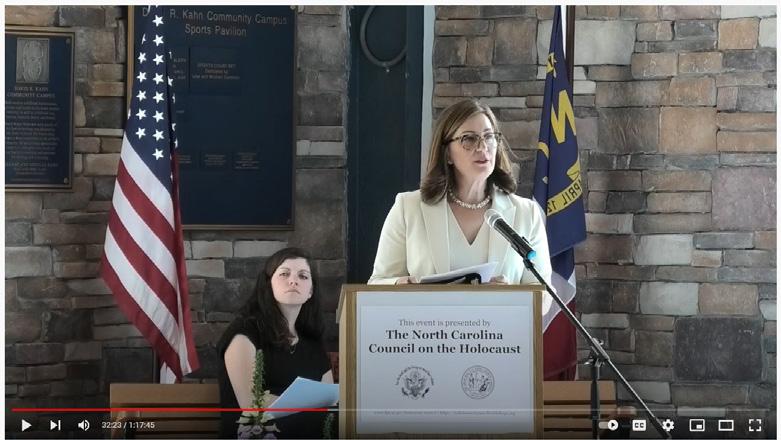
“I don’t like the way China is handling the Uyghurs,” she said.
ries,” he said.
Bonder began researching every Holocaust boxer he could find. Some, he said, only had a single sentence in a book or article and little else. The people he ultimately chose to highlight were those with well-documented, yet little-known, stories.
“I don’t think enough people know about a lot of these people’s stories, like I didn’t,” Bonder said. “I’m Jewish, I am a sports fanatic, and I didn’t know about this.”
Bonder said he chose to begin the series with Perez’s story because it contained the most general information about the Holocaust. It also illustrates an underappreciated component of many of these boxers’ stories, he added: their genuine athletic ability.
“What’s also not stressed enough is that these individuals were amazing boxers,” Bonder said. “Once the Holocaust comes, it kind of gets forgotten. Once that tragedy struck, their lives were just flipped upside down.”
By beginning the series in Tu-
nisia, Bonder also accomplishes one of his main goals: of telling geographically diverse stories beyond the Eastern European Jewish narrative.
“It’s surprising to learn about the Jewish history of places that you didn’t really know about,” Bonder said. “We all think about Germany when we think about the Holocaust and the history. A lot of us have relatives from Eastern Europe, or different places within Europe. But then once you get outside of that Eastern Europe and that central Jewish hub of Europe, then to me it’s really fascinating.”
This coming week, listeners will be transported to Italy to learn about Pacifico Di Consiglio, a Jewish teenage boxer who actively sought out Nazis to fight on the streets of Rome.
Only one episode into season one, Bonder said the reception has been his favorite part of the experience.
“I’ve heard back from Holocaust museums and a few organizations, and when they write you some heartfelt messages, they’re not just robotic replies, it’s really nice,” he said. “It’s a big positive to get a good reception from the Jewish community.”
Bonder is donating a portion of the money he raises to various Holocaust education organizations, beginning with the USC Shoah Foundation. After his ini-
tial goal of $4,000 is reached — 20% of which will go to the charity — he will select a new organization.
Supporting these organizations, many of which have served as crucial sources of information for Bonder’s research, is an added bonus. But right now, Bonder’s focus is on getting the word out.
“Every listener helps,” he said. “It started at no listeners, we got a few, and now hopefully on to the next few.”
“But if I attack a Chinese person at Brooklyn College, what’s that? That’s racism.”
Lipstadt added that her main point for her speech was “recognizing the interconnectedness” of antisemitism and racism. “We can’t look at antisemitism as a standalone thing,” she said. “We have to recognize its linkage to racism. It’s not that one is more important than the other, but that it’s a nexus and you certainly see that in New York.”
State of North Carolina
in-person
April 24, 3:30-5
the Nations (non-Jews who risked theirs lives to save Jews and other persecuted groups; and the victims of genocide and hate crimes in the world.



